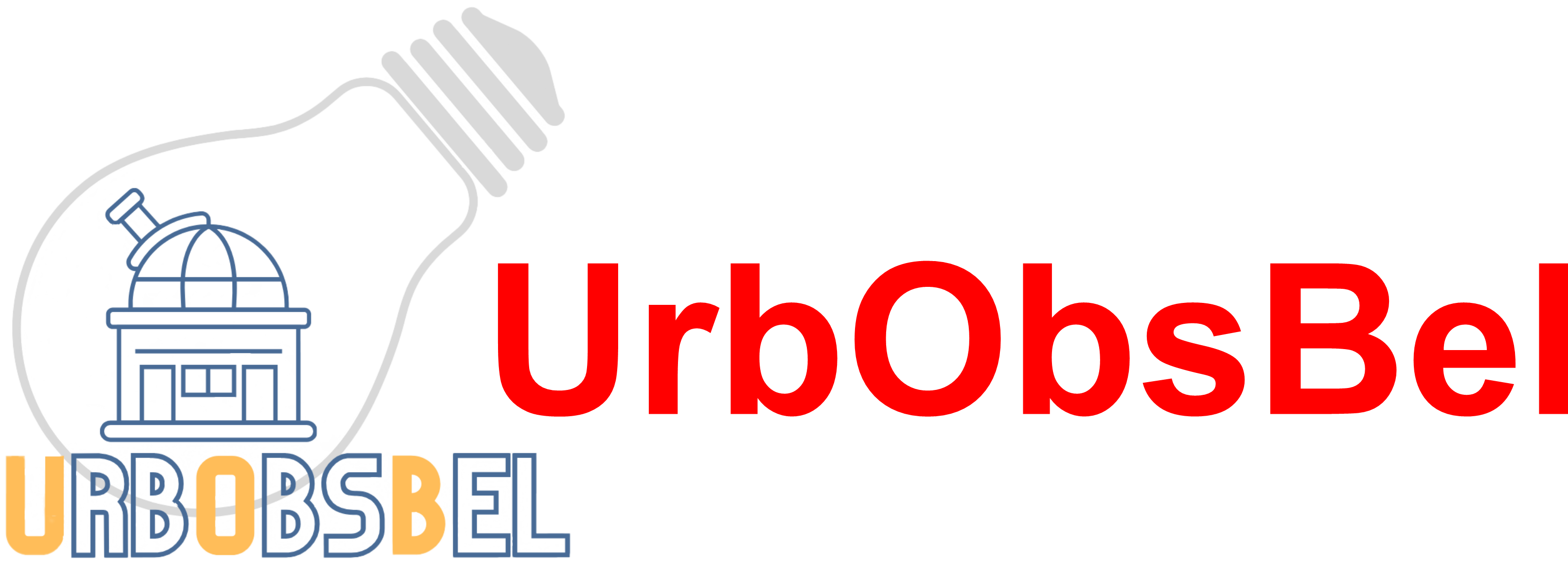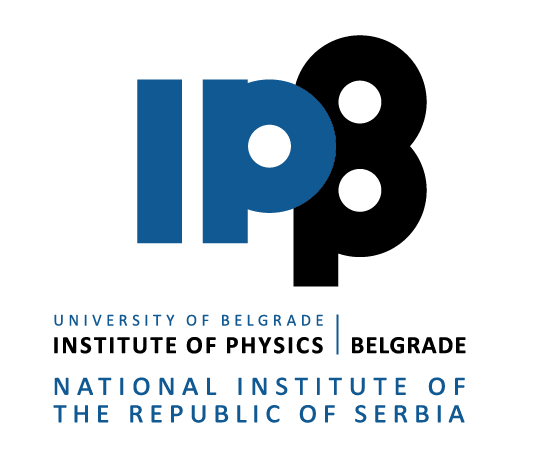About Us
The project aims to create the Urban Observatory of Belgrade, a new observing station within the Astronomical Observatory Belgrade. Among the main goals of the project is to measure and study one of the least understood forms of pollution on Earth, light pollution, and it is also planned that observations will provide information on the distribution of energy consumption, which has a major impact on the environment and ecosystems. Light pollution is one of the least understood forms of pollution that affects all living things on Earth. Therefore, it is necessary to make precise measurements using well-defined astronomical techniques in order to determine its intensity. Light pollution, for example, can be defined as the difference in sky brightness compared to an unpolluted night sky. Measurements taken in a dark location away from any artificial light are compared with measurements taken in locations near sources of intense light pollution. The difference between these measurements shows how much light has been added by human activity over the natural level of darkness. It is estimated that light pollution increases significantly every year by an average of 10 percent, which leads to its doubling in a period of less than 8 years.
Research
The main task of the Urban Observatory project is the mounting of observational equipment on the flat roof of the Astronomical Observatory Tower, the highest point of the urban part of Belgrade. Using this exceptional position, we plan to measure and analyze as many variables important to modern city life as possible. Such a synoptic view of the city will provide the possibility of observing the city on different time scales, ranging from minutes to months and years. This location provides the opportunity to observe not only the narrower city zone (the center of Belgrade), but also its surroundings, e.g. the forest and Danube river. The construction of an observation facility in the city environment to study light pollution and dynamic processes in Belgrade will enable observation activities in different weather conditions throughout the year. Given that a couple of instruments will be mounted at the Vidojevica Astronomical Station one of the last dark locations in Serbia, one of the last dark locations in Serbia, it will be possible to analyze the problem of light pollution in Serbia in detail.
By creating a new observing station in Belgrade that will be used for various tasks (measurement of sky brightness, atmospheric visibility, determination of cloud cover and measurement of sky pollution), the Urban Observatory project will contribute to our understanding of the complex aspects of light pollution. It is expected that various potential users of observation and analysis, in addition to the scientific community, will also be city administrations, decision makers, businessmen, ecological organizations, institutions in the field of environmental protection, the general public, the media, educators and all interested parties. This project will enable the optimal use of observational resources and the international exchange of knowledge and results with other related projects. The results of the project will be used by the Municipality of Zvezdara and the City of Belgrade, as these measurements will provide elements for making decisions in the direction of creating a better environment that will improve the health of the population of Belgrade and its surroundings. As part of the long-term strategy regarding light pollution, a discussion will be initiated on the design of lighting adapted to dark skies, such as direction, spectral composition and limited lighting duration, and it is also planned to initiate the construction of dark sky parks in Serbia that already exist in neighboring countries.
A team of 8 researchers from 4 scientific institutes from Serbia will be involved in the Urban Observatory project. The head of the project is Dr. Srđan Samurović, principal research fellow, from the Astronomical Observatory. The leader of work package no. 2, which refers to the acquisition and maintenance of equipment, is Dr. Zorica Cvetković, principal research fellow, from the Institute of Physics, the leader of work package no. 3, which refers to the installation and maintenance of the software, is Dr. Rade Pavlović, principal research fellow, also from the Institute of Physics, the leader of work package no. 4, which refers to data analysis, is Dr. Goran Damljanović, principal research fellow from the Astronomical Observatory and, finally, the leader of work package no. 5 who deals with the dissemination of the results is Dr. Dajana Bjelajac, assistant professor at the Faculty of Sciences of the University of Novi Sad. The project team also includes Dr. Zoran Simić, principal research fellow from the Astronomical Observatory, Dr. Dragan Lukić, research associate from the Institute of Physics and Dr. Branislav Rovčanin, assistant professor from the Faculty of Medicine, University of Belgrade.
Instruments
We have Tess-w photometer and Sky Quality Meter in a pair, so one pair is installed at Astronomical Observatory in Belgrade, and the other pair at the Astronomical Station Vidojevica near Prokuplje.
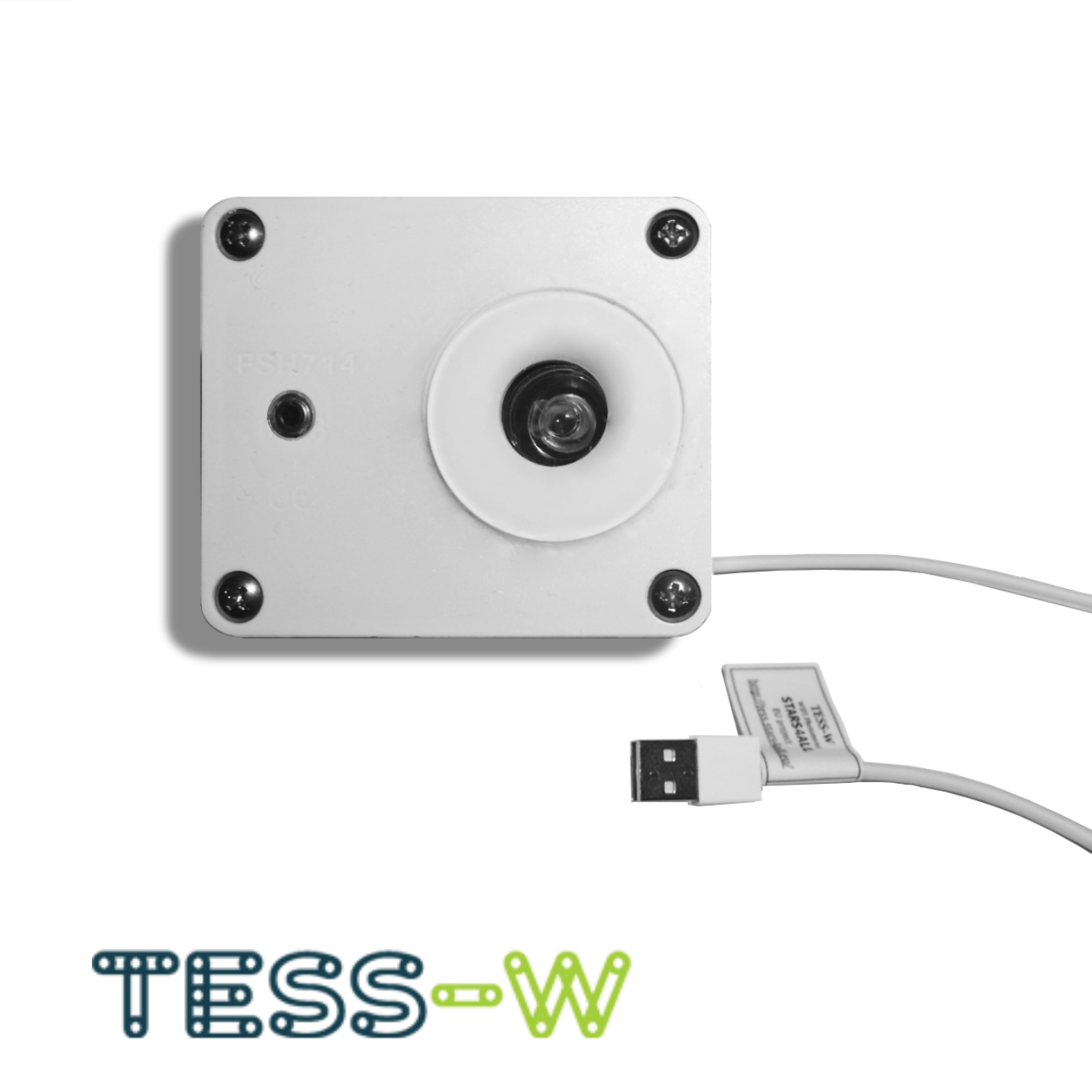
Tess-w photometer
TESS-W is the photometer we need to continously monitoring the sky brightness at night.
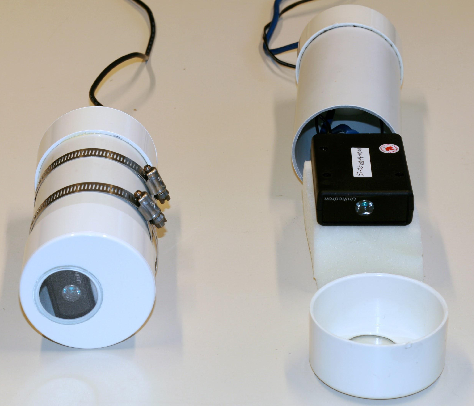
Sky quality meter
Measuring the brightness of the night sky has become an increasingly important topic in recent years, as artificial lights and their scattering by the Earth’s atmosphere continue spreading around the globe.
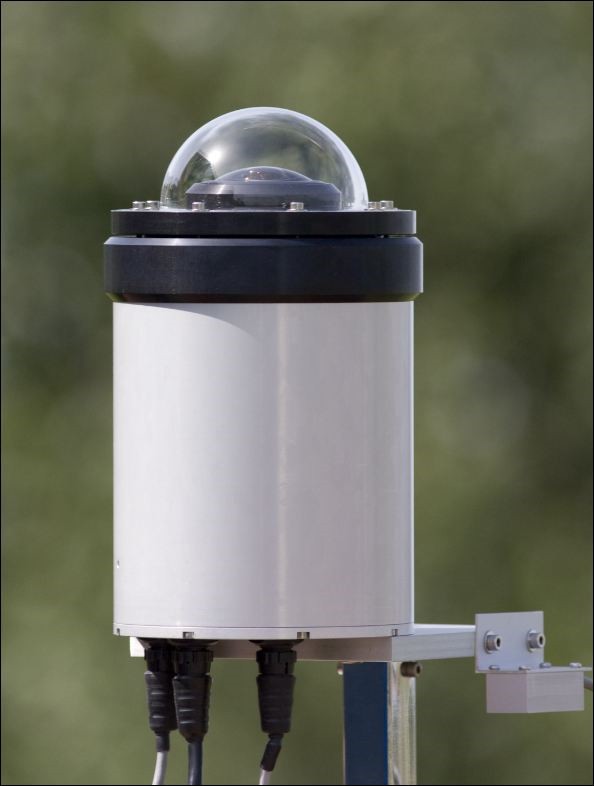
Allsky camera - Alcor System OMEA 3C
The purpose of these systems is to carry out All or Full Sky surveillance of the night or day sky, and in a continuous fashion. It is possible to assess, in real time, the night sky quality, and to record fast phenomena (meteors and fireballs) or slower (satellites, rockets, noctilucent clouds, zodiacal light, aurora, airglow...).

Hyperspectral Imaging Sensors (HSI)
The Hyperspectral Imaging Sensors (HSI) allows to acquire Hyperspectral Images (HI). A HI is a collection of digital images acquired simultaneously from a physical surface. Any of those images displays the electromagnetic energy sensed at a specific wavelength. Typically, an HSI senses from 400 nm to 2,500 nm, with continuous and narrow separation of 4–10 nm. Those images are also known as wavebands.

Teledyne FLIR A700 infrared camera
The Teledyne FLIR A700 infrared camera provides researchers and engineers with a highly efficient and precise solution for temperature measurement. Equipped with an IR resolution of 640 × 480 pixels, a detector pitch of 12 μm, a spectral range of 7.5 to 14.0 μm, and a temperature sensitivity of ±2◦, this advanced camera ensures reliable and accurate thermal imaging.

Digital Single-Lens Reflex (DSLR) camera with a fisheye lens
Digital Single-Lens Reflex (DSLR) camera with a fisheye lens has image area of 8,256 x 5,504 pixels, and is capable to record movie 4K UHD 3,840 x 2,160 at 60 fps.
Data Collection

Unihedron data for the last four days at Astronomical Observatory of Belgrade (AOB)

Unihedron data for the last four days at Astronomical Society Rudjer Boskovic (ASRB)

Unihedron data for the last four days at Astronomical Station Vidojevica (ASV)
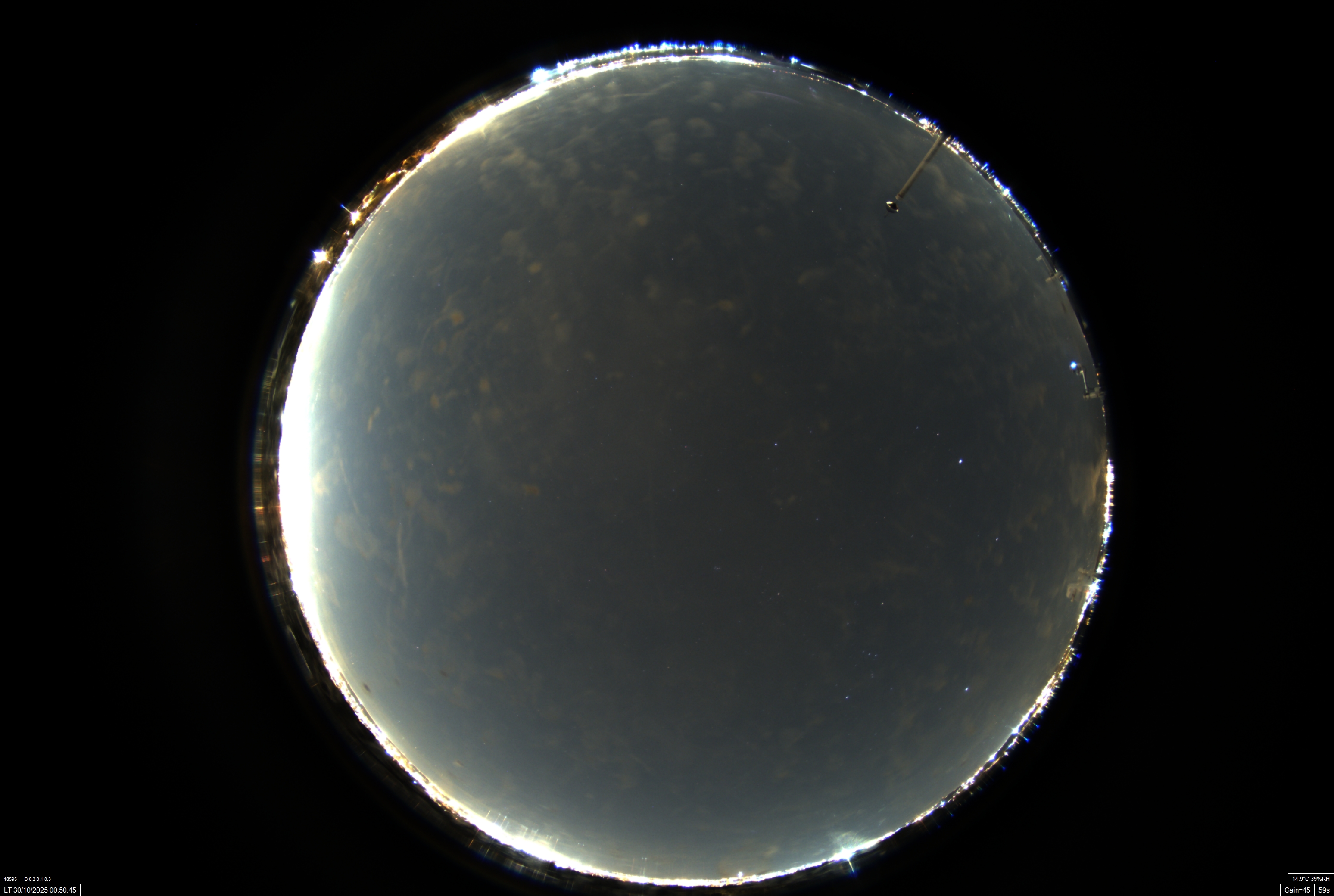
Current AllSky image at AOB
News and Updates
Continuation of cooperation between the Municipality of Zvezdara and the Astronomical Observatory
At the invitation of the Director, Dr. Luka Popović, the President of the City Municipality of Zvezdara, Mr. Mihailo Dosković, and his associates visited the Astronomical Observatory on December 17, 2025, and discussed cooperation between the two institutions. In addition to the Director, the guests were also welcomed by Dr. Jelena Kovačević Dojčinović, Senior Research Associate, and Dr. Srdjan Samurović, Principal Research Fellow.
"The Municipality of Zvezdara is proud to have a scientific institution with such a long tradition on its territory, and I believe that this is a source of pride not only for our municipality, but also for the city and the country. I see nothing more important at Zvezdara than this institution, and you can be sure that cooperation will continue and be raised to a higher level. As a local government, we will do our best to help and support you, especially when it comes to scientific projects. The signing of a cooperation agreement with a Greek municipality is underway, and the Municipality is already achieving successful cooperation with the Chinese city of Nantong and Herceg Novi, which allows us to develop international connections and joint performance, given that we have recognized science as one of the important forms of cooperation," said Mr. Dosković.
Presenting the Observatory, Director Dr. Luka Popović emphasized that the Astronomical Observatory will celebrate 140 years since its founding in 2027, thus earning it the title of the oldest scientific institution in the country. Dr. Popović pointed out the directions for improving scientific work, as well as education and popularization of astronomy at the Observatory. He also introduced the Mayor to the successful international cooperation that the Observatory is achieving and presented new opportunities for cooperation. Dr. Popović emphasized that the Observatory has developed a conceptual solution and project for the development of the entire complex, as well as that the vision of its further development includes the construction of a high-tech park. He also requested the assistance of the Municipality in mediating with the relevant institutions in order to resolve property and legal issues and find a model for the regular maintenance of this complex.
Dr. Srđan Samurović, PI of the Prisma project of the Urban Observatory of Belgrade (UrbObsBel), funded by the Science Fund of the Republic of Serbia and implemented at the Astronomical Observatory and supported by the Municipality of Zvezdara, presented this project and the results obtained so far to Mr. Dosković and his associates, as well as the possibilities of cooperation in order to reduce light pollution in the Municipality of Zvezdara and improve the lives of its residents.
At the end of his stay at the Observatory, Mr. Dosković and his associates visited the Large Refractor Pavilion. Further meetings were also arranged to discuss specific steps in future cooperation between the Astronomical Observatory and the Municipality of Zvezdara.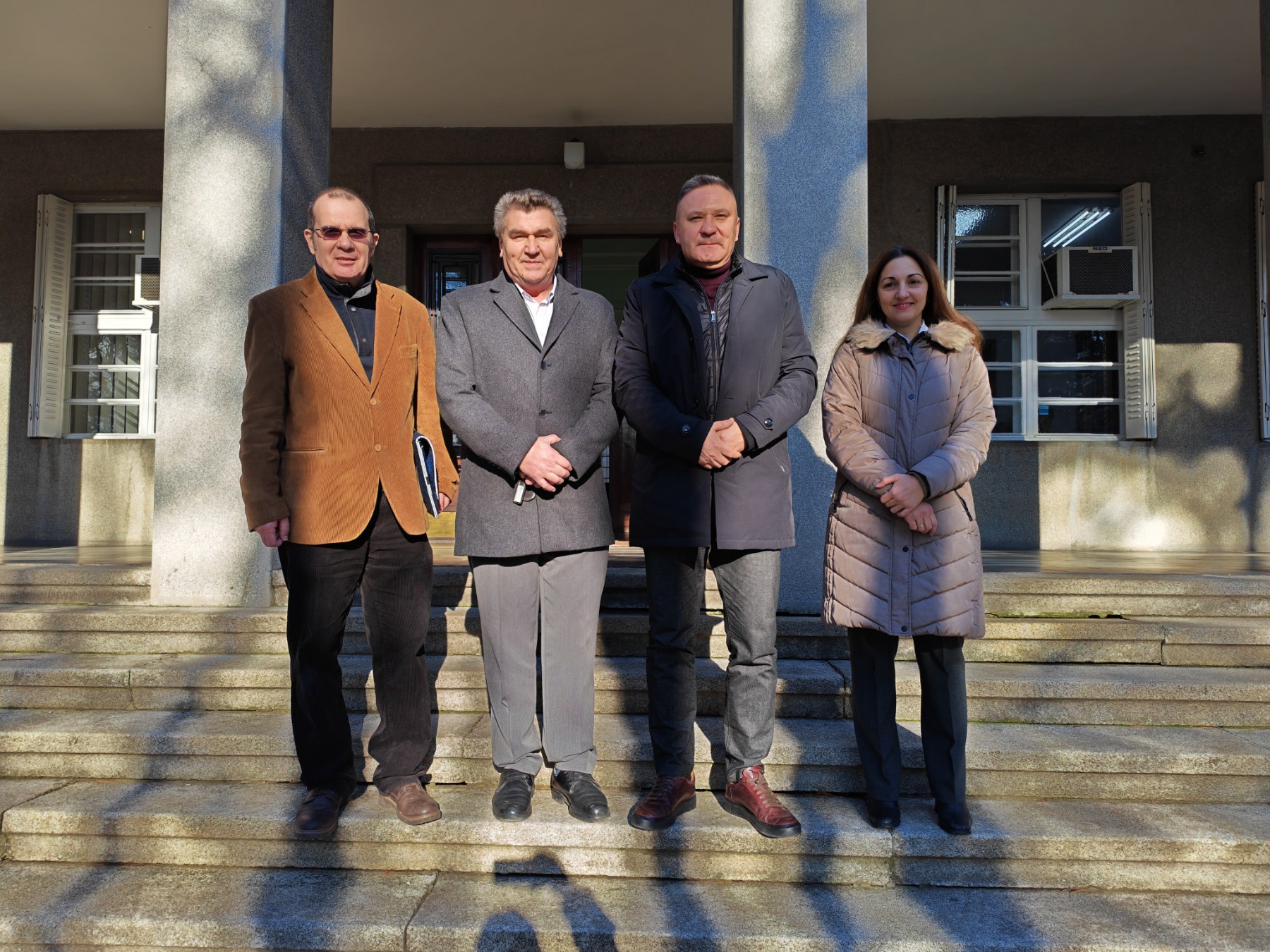
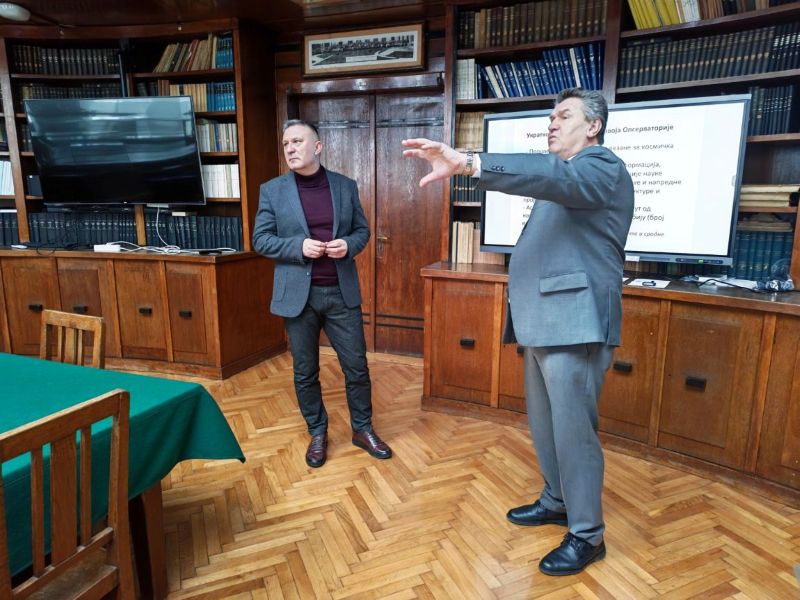
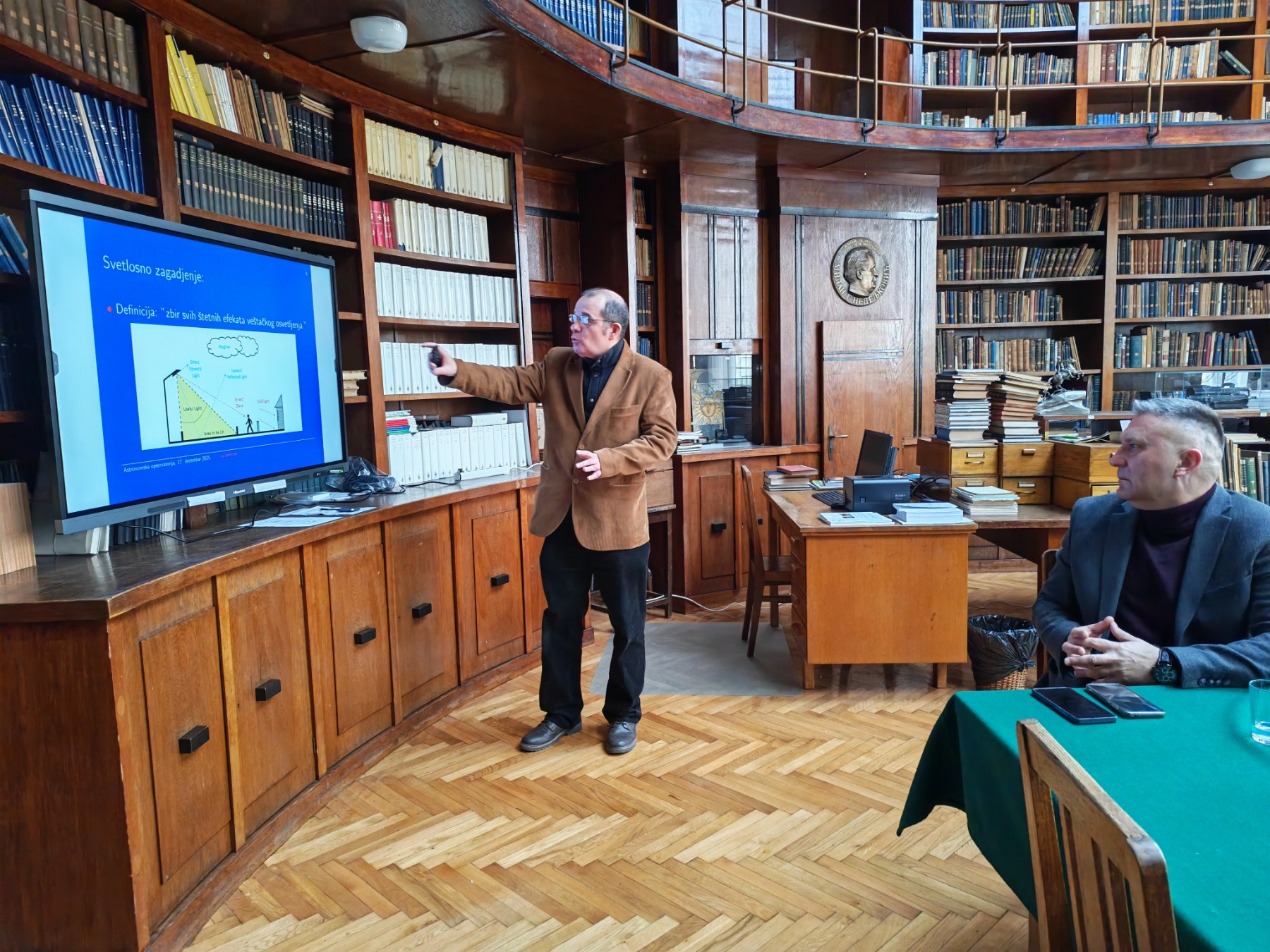
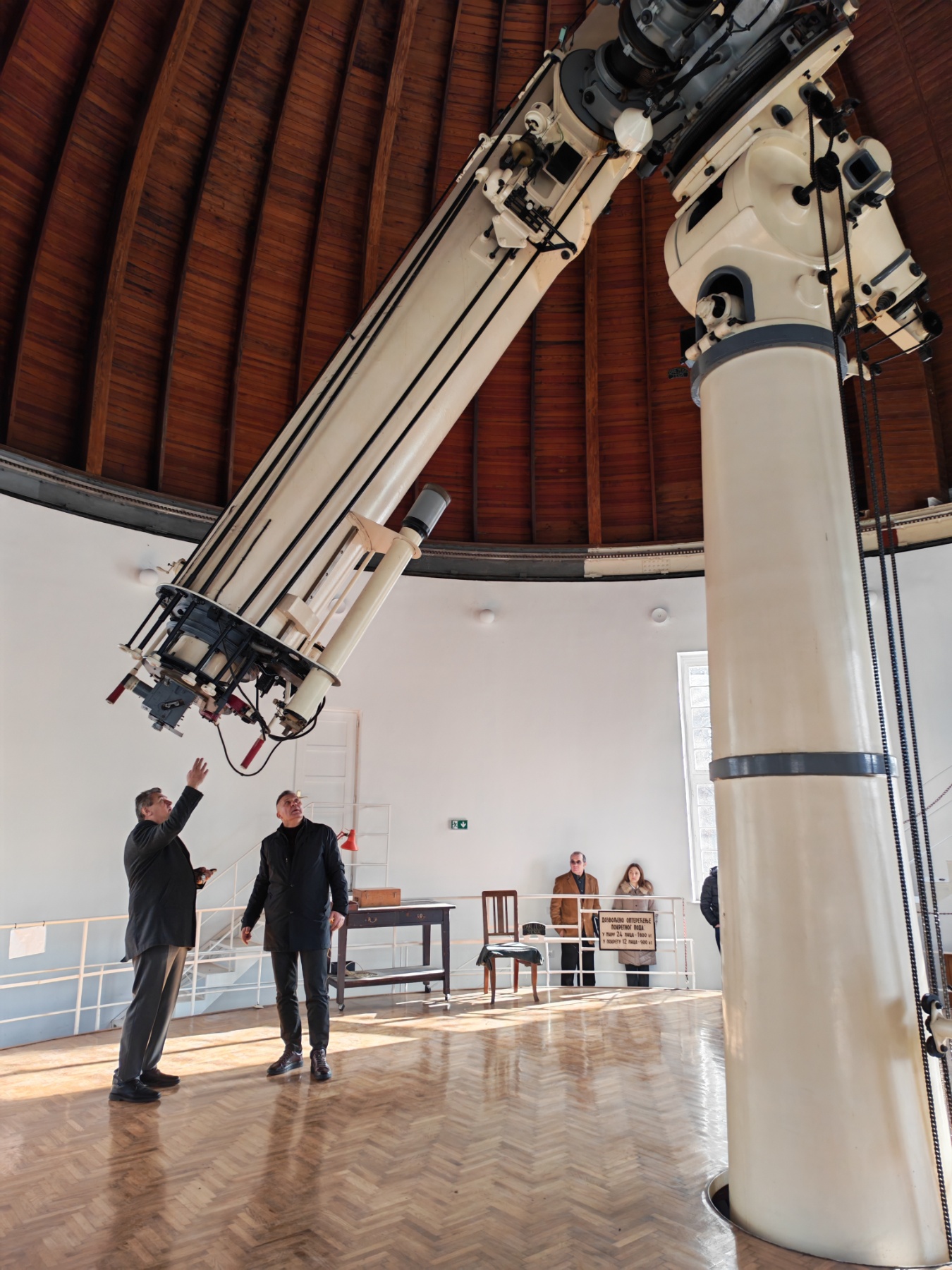
Useful Links
Participation of the UrbObsBel Project at the International ENLIGHT Conference
The UrbObsBel Project Presented at the ENLIGHT International Conference As part of the ENLIGHT International Conference, an international scientific event held in Novi Sad from 28th to 30th November 2025 in Novi Sad dedicated to the issue of light pollution, the UrbObsBel Project was presented. The conference focused on one of the fastest-growing environmental challenges of contemporary society, with particular emphasis on the impacts of light pollution on ecosystems, human health, astronomy, and urban planning. The conference was organized by the Faculty of Sciences, University of Novi Sad (Department of Biology and Ecology), and the Institute for Biological Research “Siniša Stanković”, University of Belgrade, within the framework of the ENLIGHT Project, funded by the Science Fund of the Republic of Serbia.
The conference program covered a wide range of interdisciplinary topics, including the biological effects of light pollution, impacts on human health, urbanization and light pollution, effects on astronomy and night sky observation, dark sky protection and policy development, as well as methods for measuring and monitoring light pollution. At the conference, Dr. Dajana Bjelajac presented the paper entitled “The UrbObsBel Project – Towards Understanding Light Pollution in Urban Environments”, outlining the objectives and methodological approach of the UrbObsBel Project, with a focus on understanding the spatial distribution and intensity of light pollution in urban environments, as well as the importance of such research for sustainable urban planning and the protection of the nighttime environment.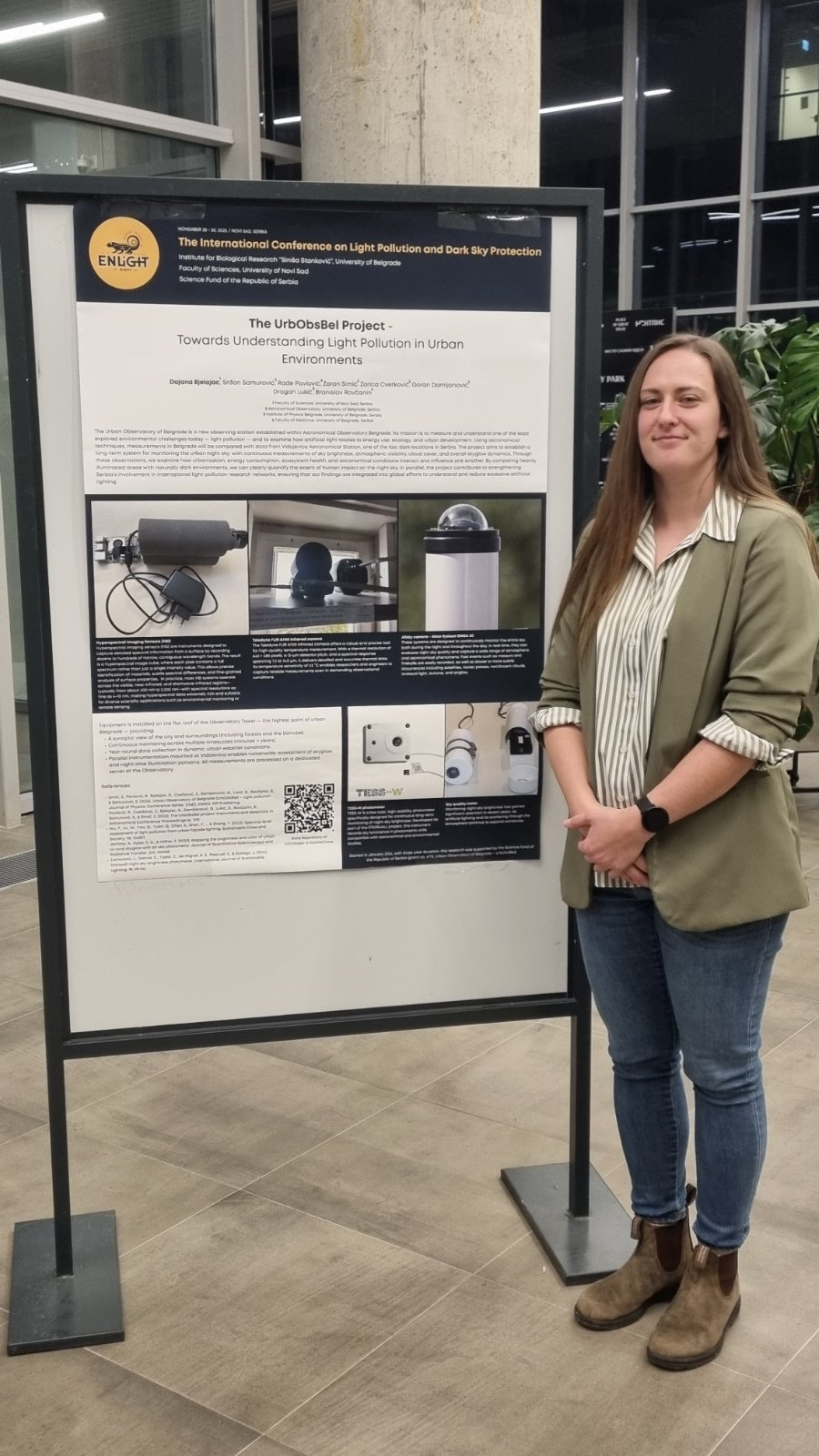
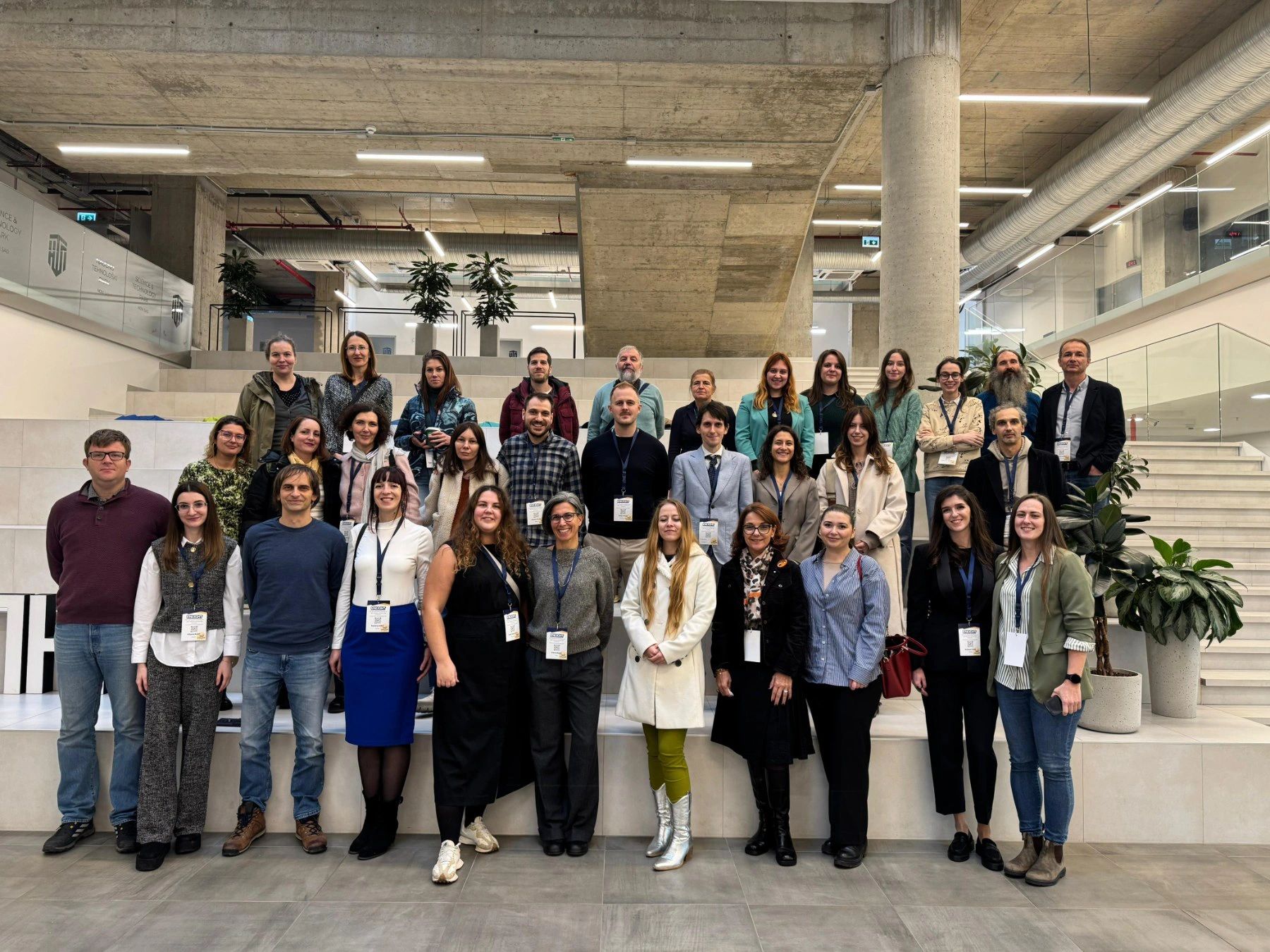
Useful Links
Celebration of the Japanese Tsukimi Holiday at the Astronomical Observatory
The Japanese Tsukimi holiday (月見) was celebrated for the third time at the Astronomical Observatory on Monday, October 6, 2025. This holiday, whose name means "moon-viewing", marks the autumn full moon. The celebration was organized by Mr. Oliver Lepori on behalf of the Japan Business Alliance in Serbia, and he welcomed the participants at the very beginning. Then, Dr. Srdjan Samurović described the problem of light pollution and presented the Urban Observatory of Belgrade project (UrbObsBel) funded by the Science Fund of the Republic of Serbia, which brings together researchers from four scientific institutions from Serbia and is being implemented at the Astronomical Observatory in the period 2024-2026. Then, Ms. Sofija Perlić, an intern at the Japanese Business Alliance in Serbia, briefly described the significance of the Tsukimi holiday. The Librarian of the Astronomical Observatory, Ms. Vesna Mijatović, presented the most important stages in the development of the Astronomical Observatory and their significance for today's research taking place at one of Serbia's oldest scientific institutes. After these presentations, the guests visited the Great Refractor Pavilion and, in accordance with tradition, were served specialties in the shape of the full moon for dinner.
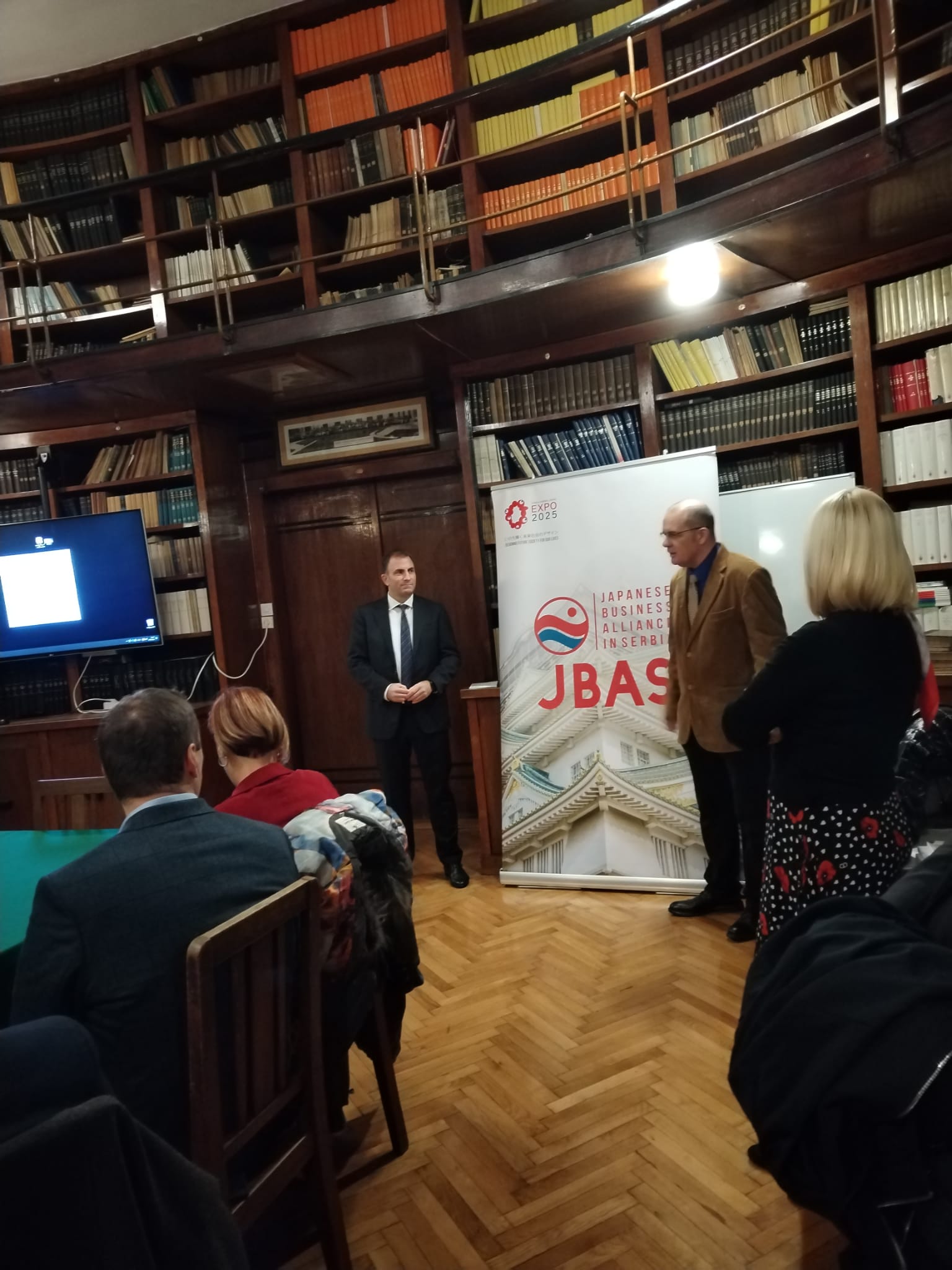
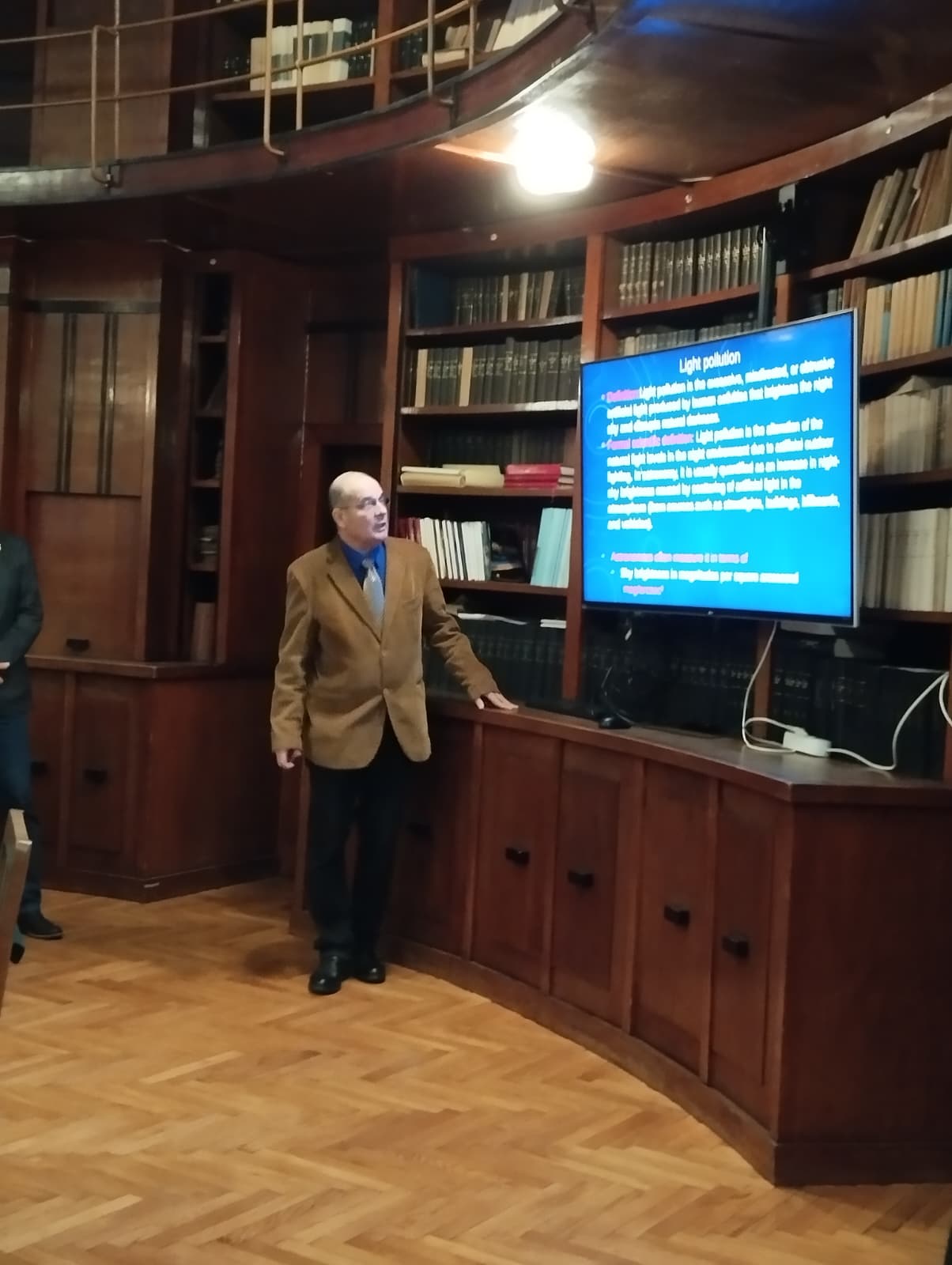
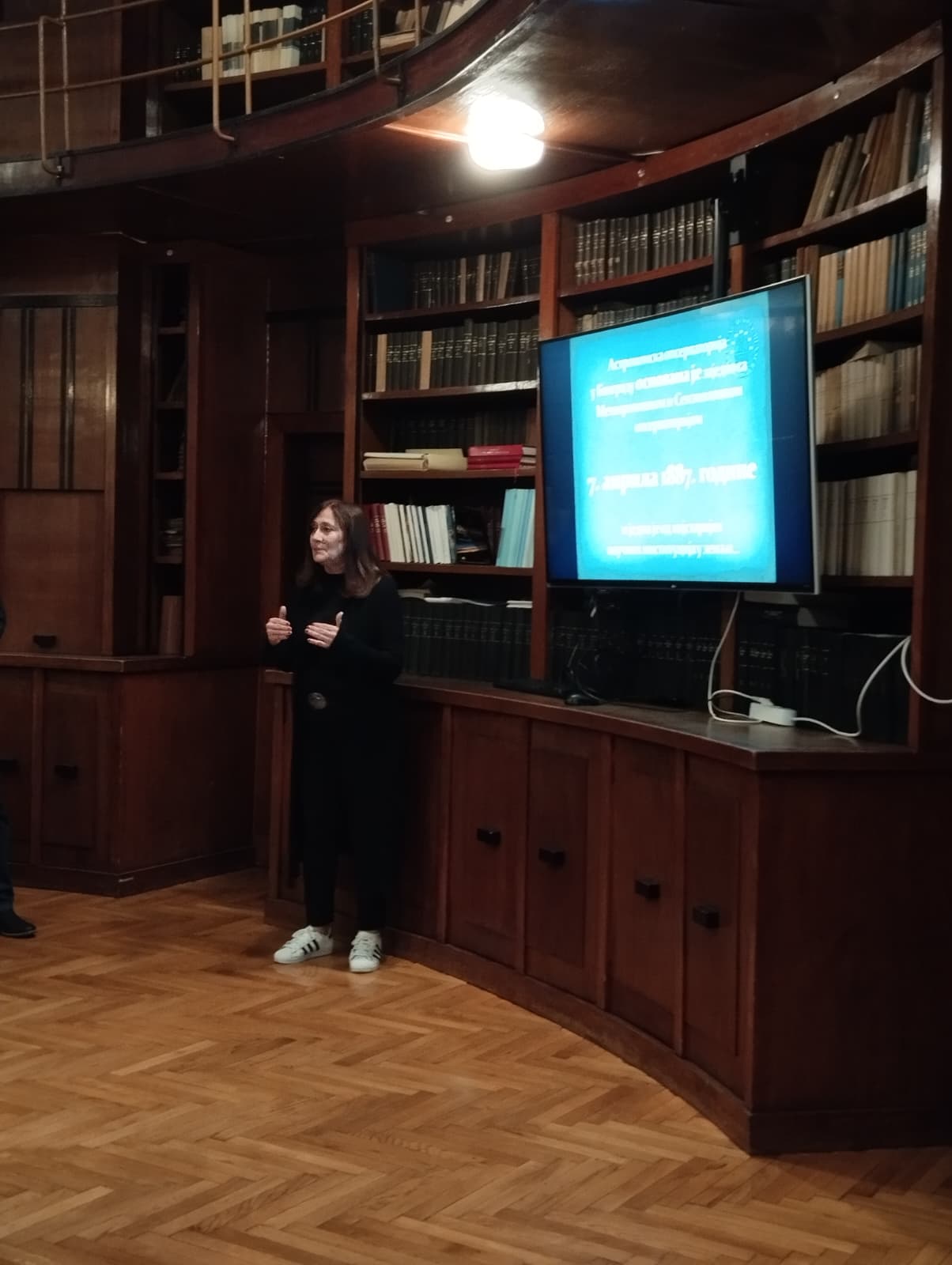
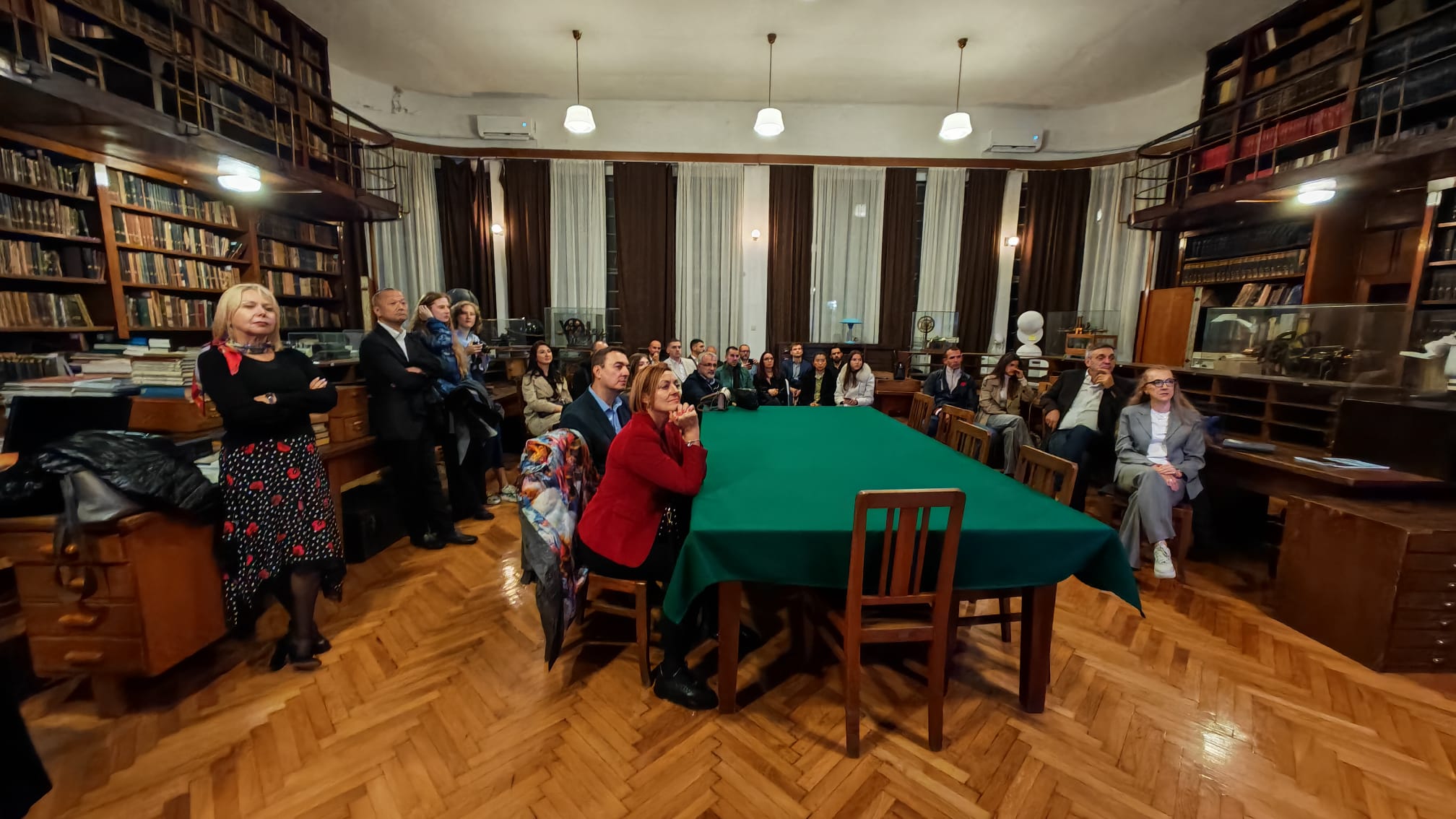
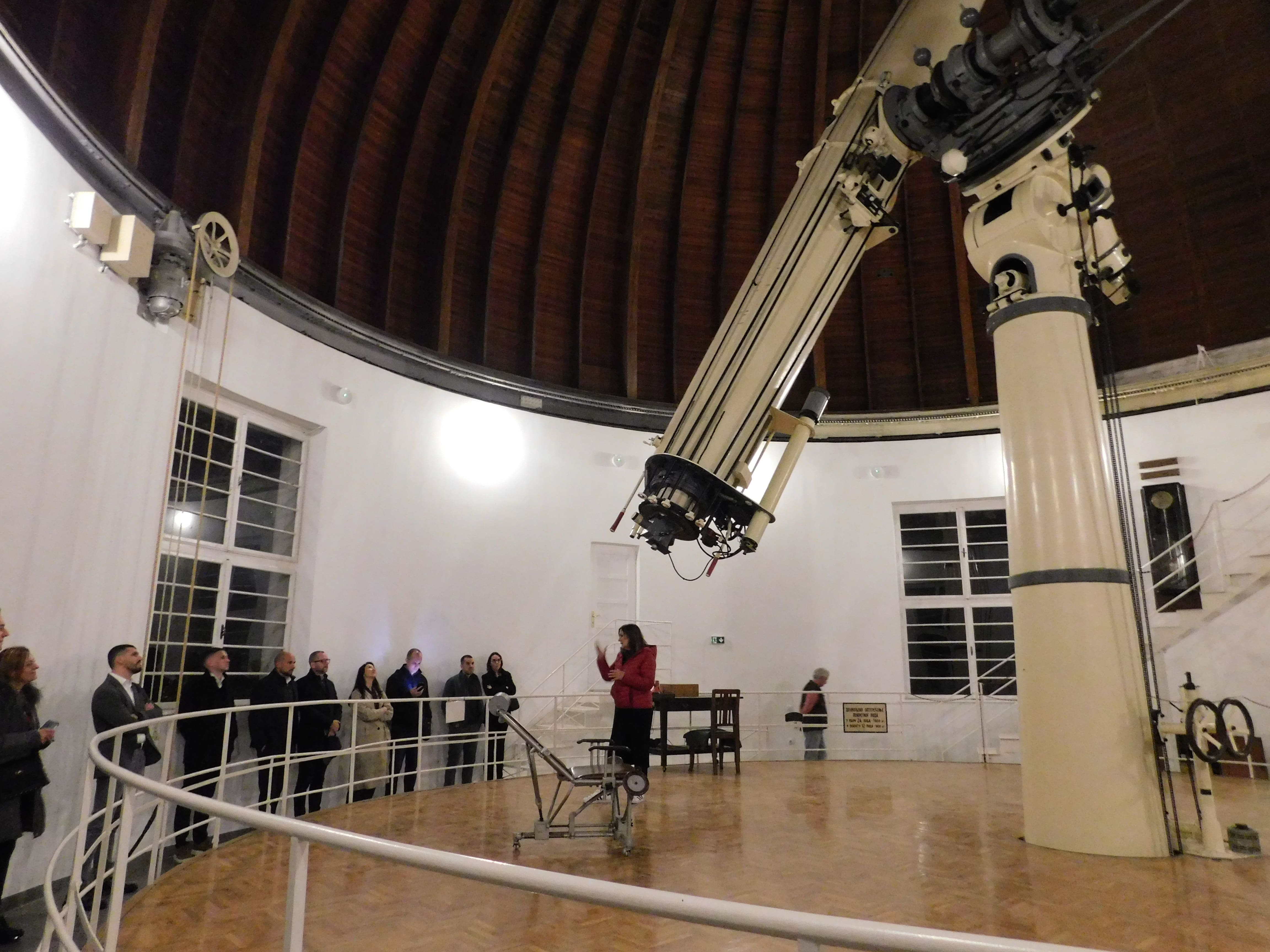
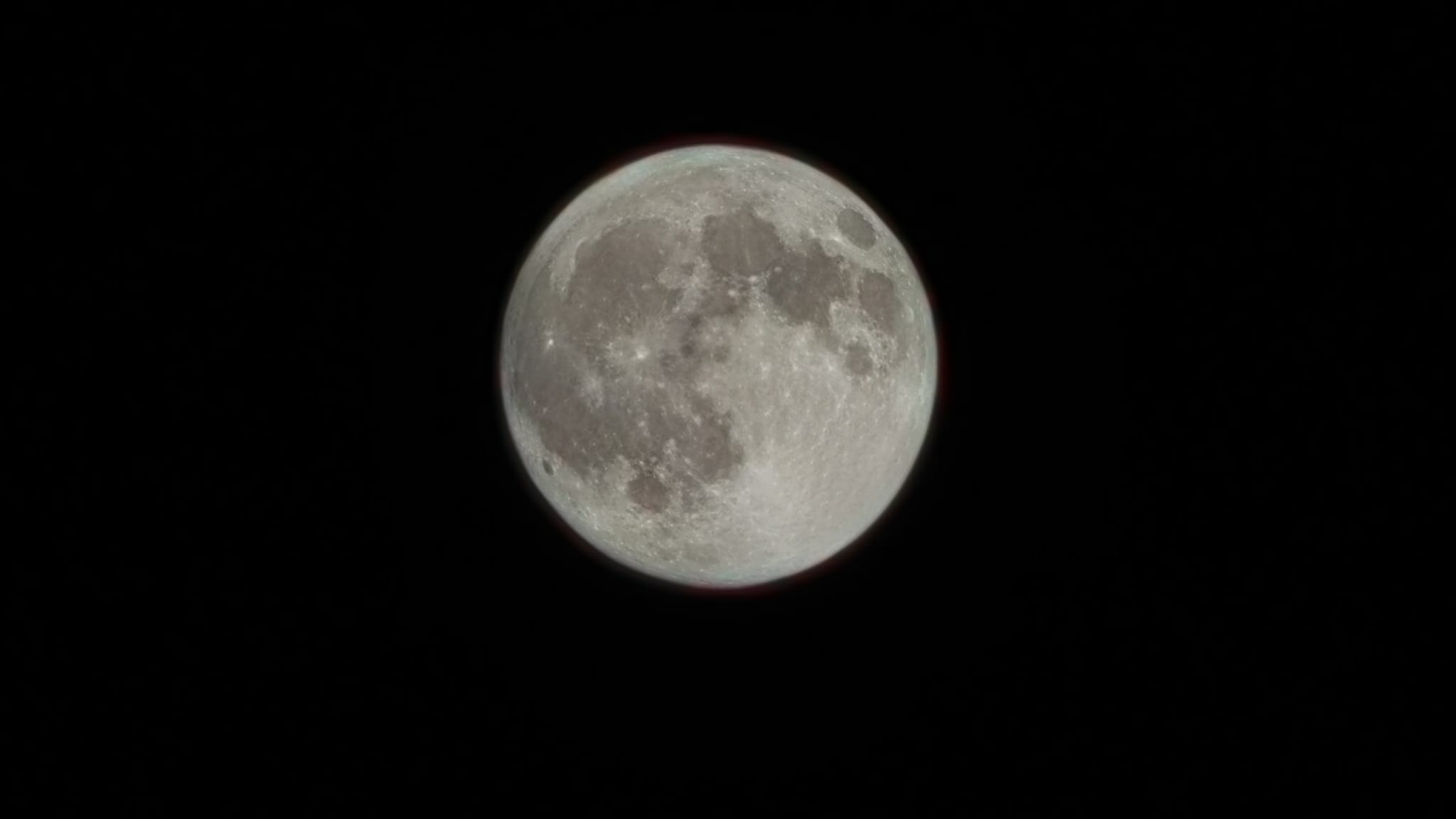
International Meeting on Operational and Research Capabilities for Better Understanding Solar-Terrestrial Interactions
An international meeting dedicated to understanding the interactions between the Sun and our planet, Meeting on Operational and Research Capabilities for Better Understanding Solar-Terrestrial Interactions, was held at the Institute of Physics in Zemun from September 29 to October 3, 2025, and was organized by the Institute of Physics and the Scientific Society Isaac Newton. The Scientific Organizing Committee of the conference included Prof. Dr. Luka Č. Popović, director of the Astronomical Observatory of Belgrade and Dr. Srdjan Samurović from the Astronomical Observatory, PI of the Urban Observatory of Belgrade (UrbObsBel) Prisma project and within the morning session on October 2, three presentations related to the work of Serbian astronomers and the Astronomical Observatory were held: Dr. Milan Dimitrijević spoke about slow changes in solar-terrestrial interaction and ice-ages in the work of Milutin Milanković, Veljko Vujčić presented the Alertissimo environment in the work of the LSST telescope, and Dr. Rade Pavlović presented the Prisma project UrbObsBel, which is active at the Astronomical Observatory in the period 2024-2026. Dr. Pavlović first presented in detail all the instruments used within the UrbObsBel project, both at the Astronomical Observatory in Belgrade and at the Vidojevica Astronomical Station near Prokuplje, and concluded his presentation by showing the first results obtained within this project.
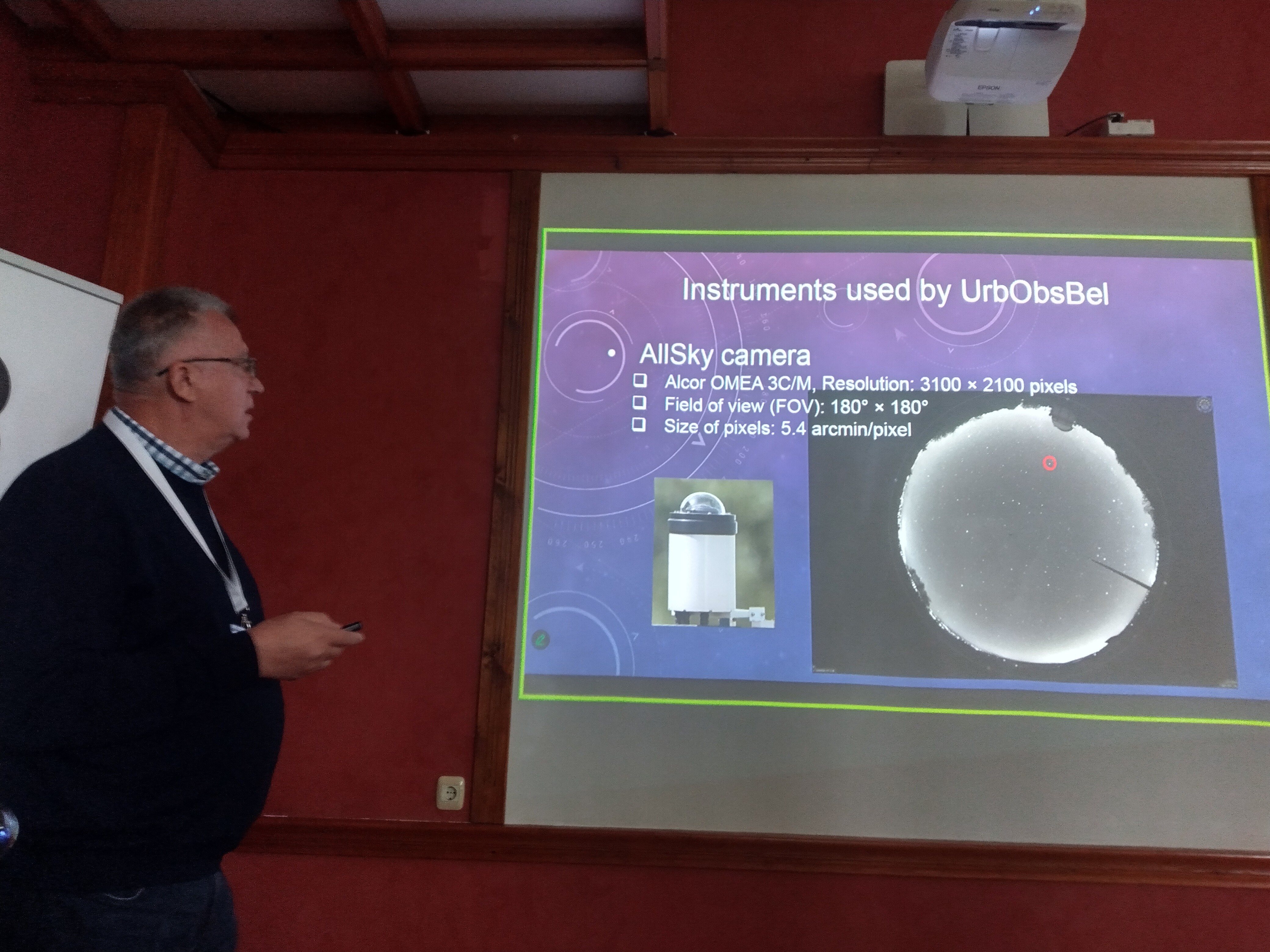
Dr. Rade Pavlović
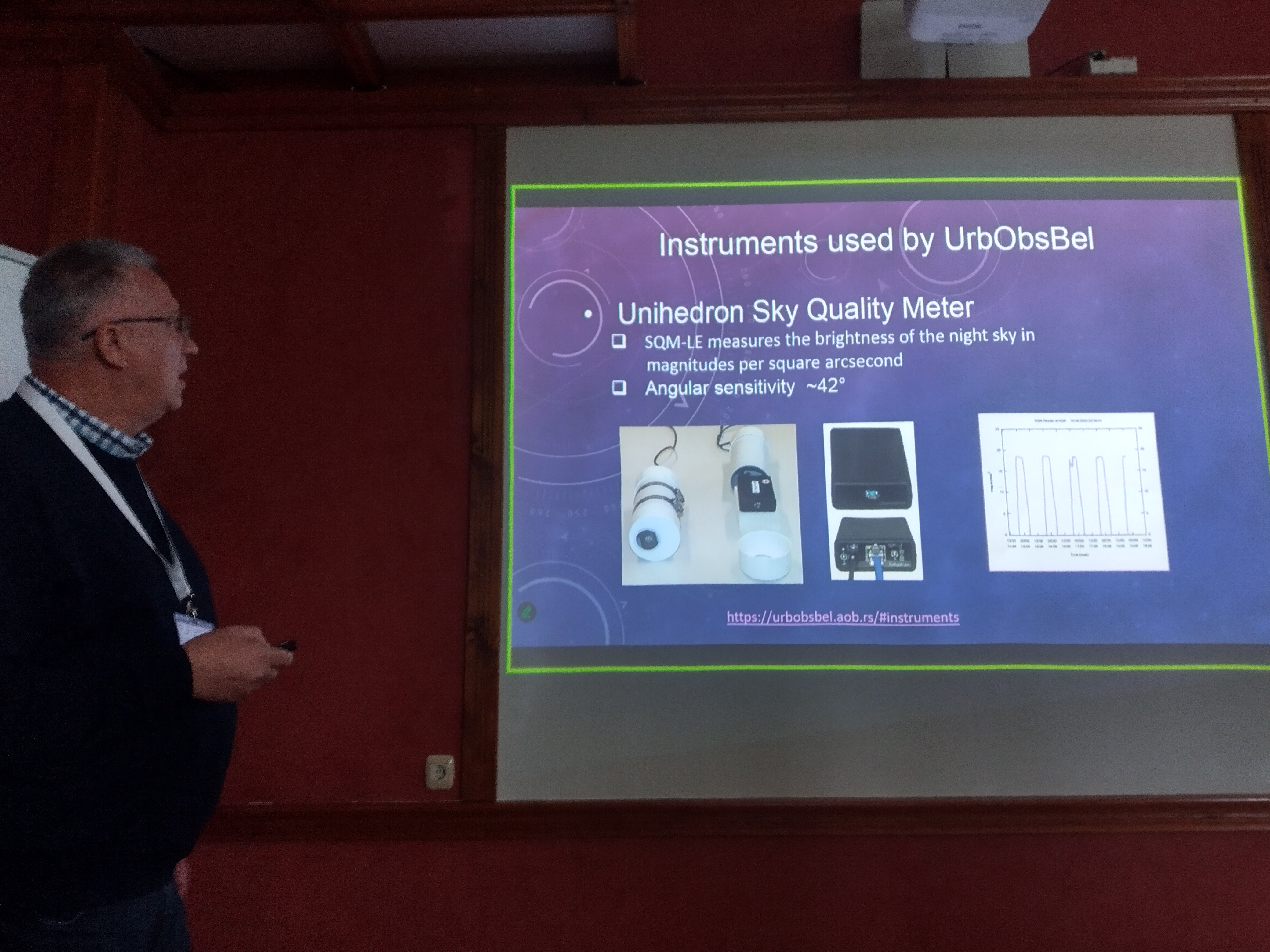
Dr. Rade Pavlović
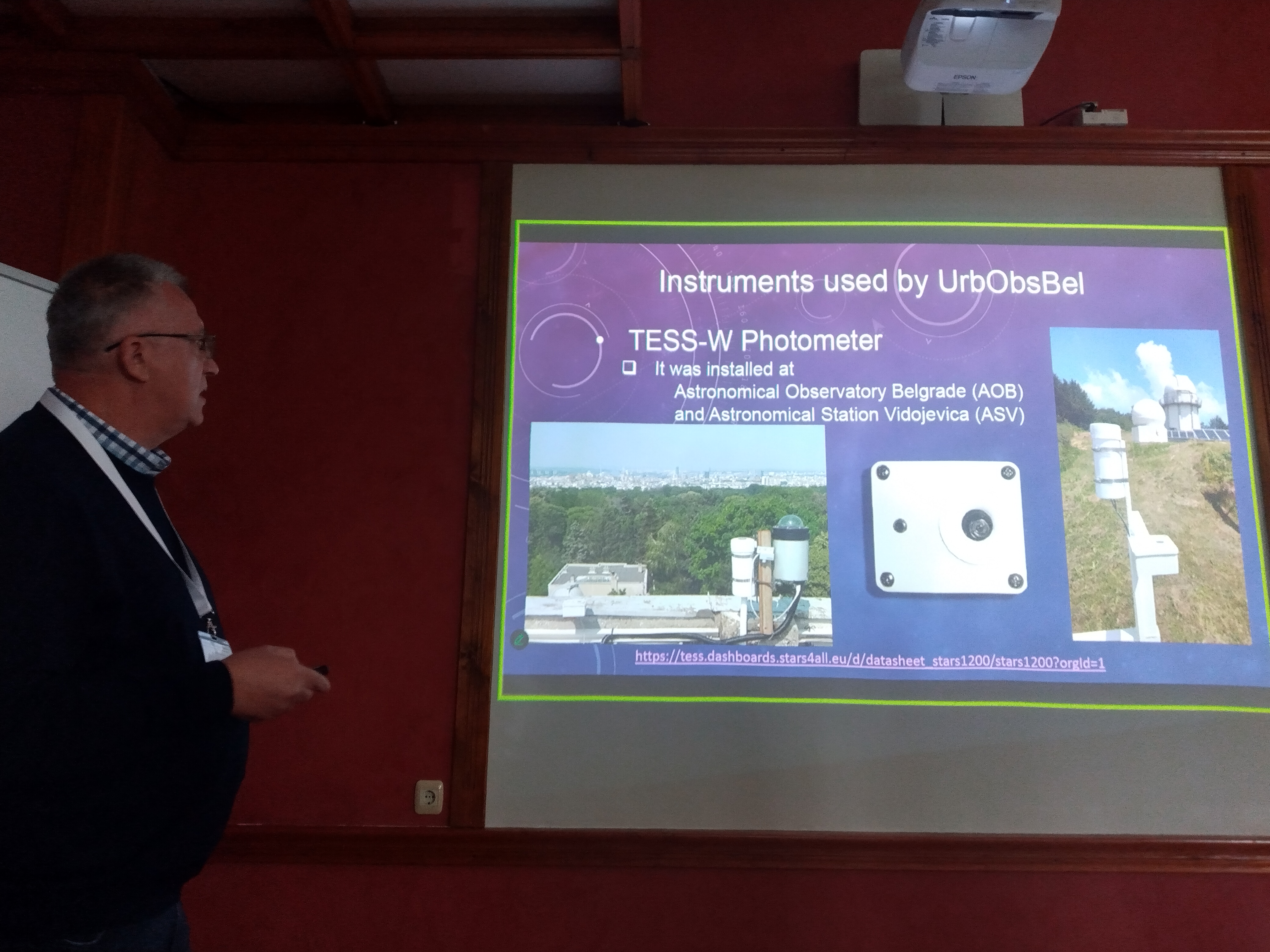
Dr. Rade Pavlović
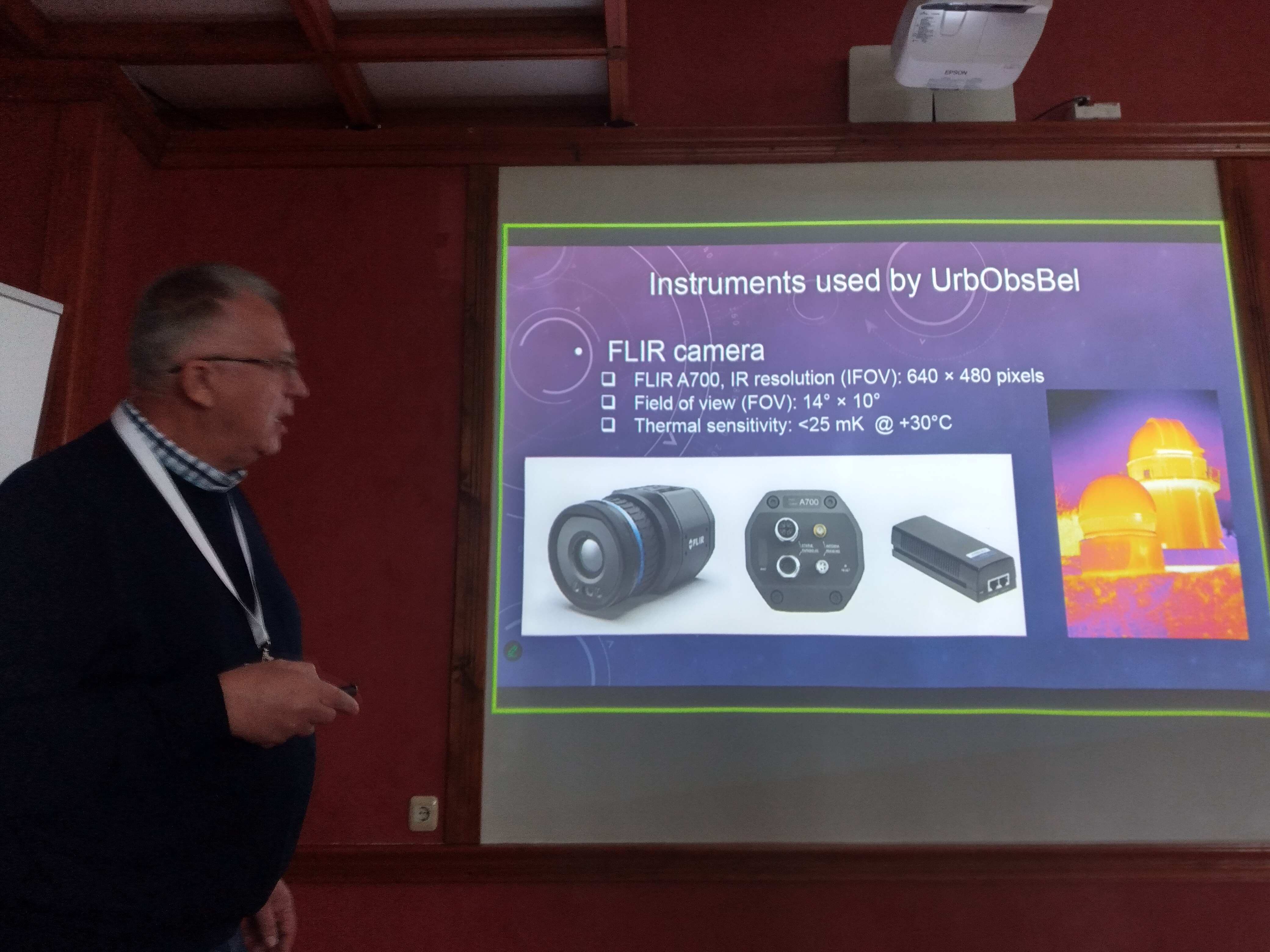
Dr. Rade Pavlović
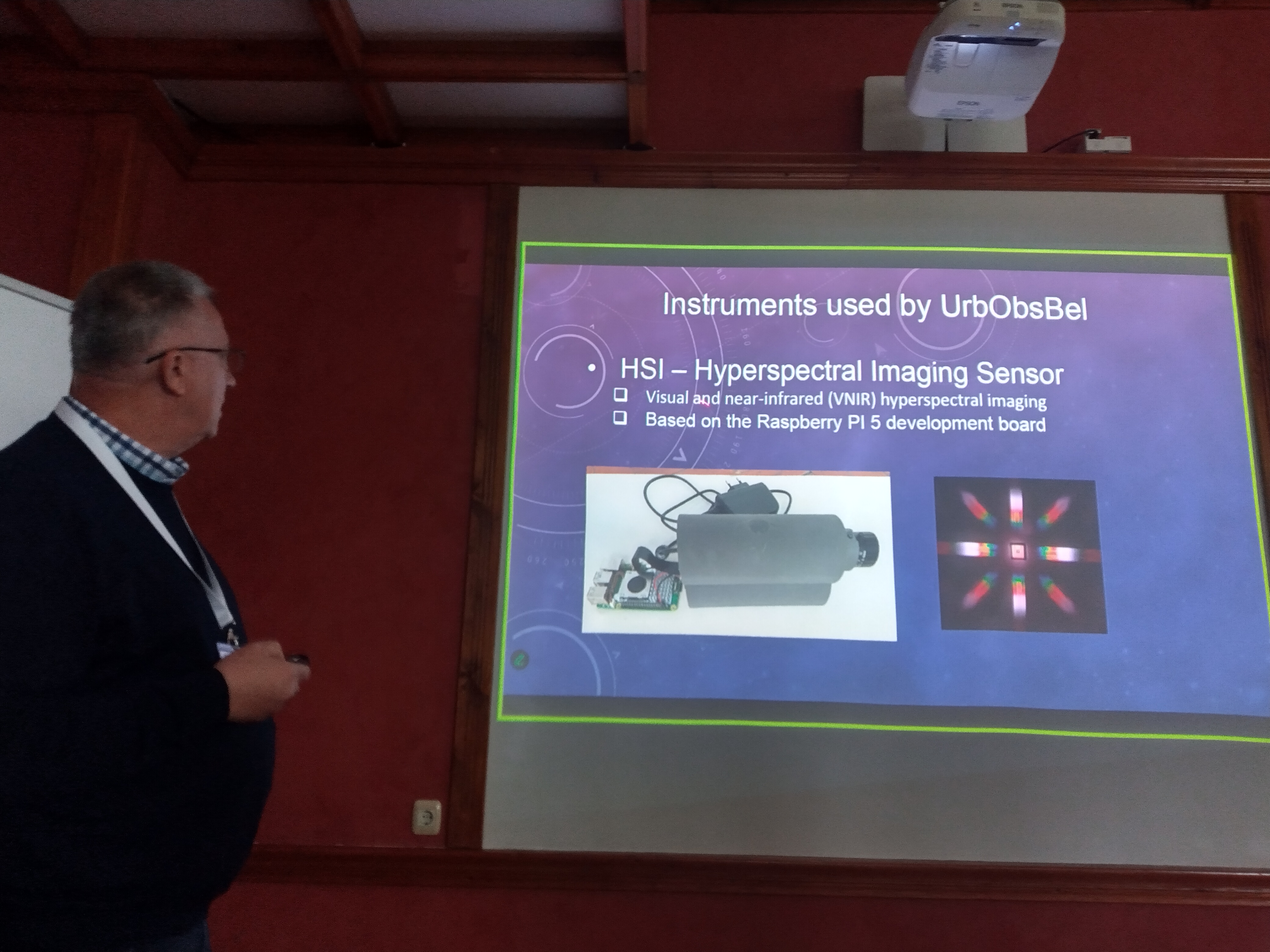
Dr. Rade Pavlović
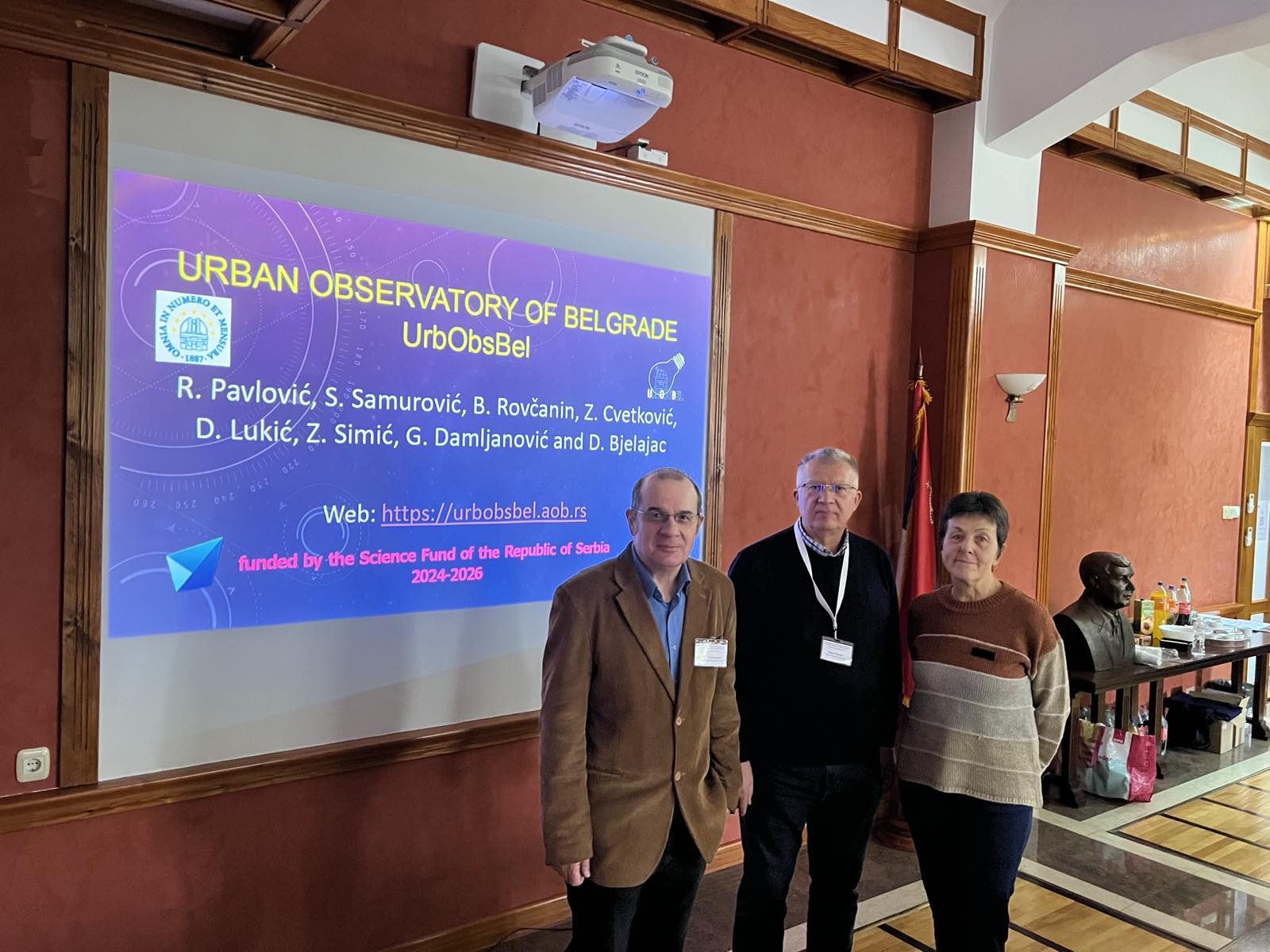
Dr. Srdjan Samurović, Dr. Rade Pavlović and Dr. Zorica Cvetković
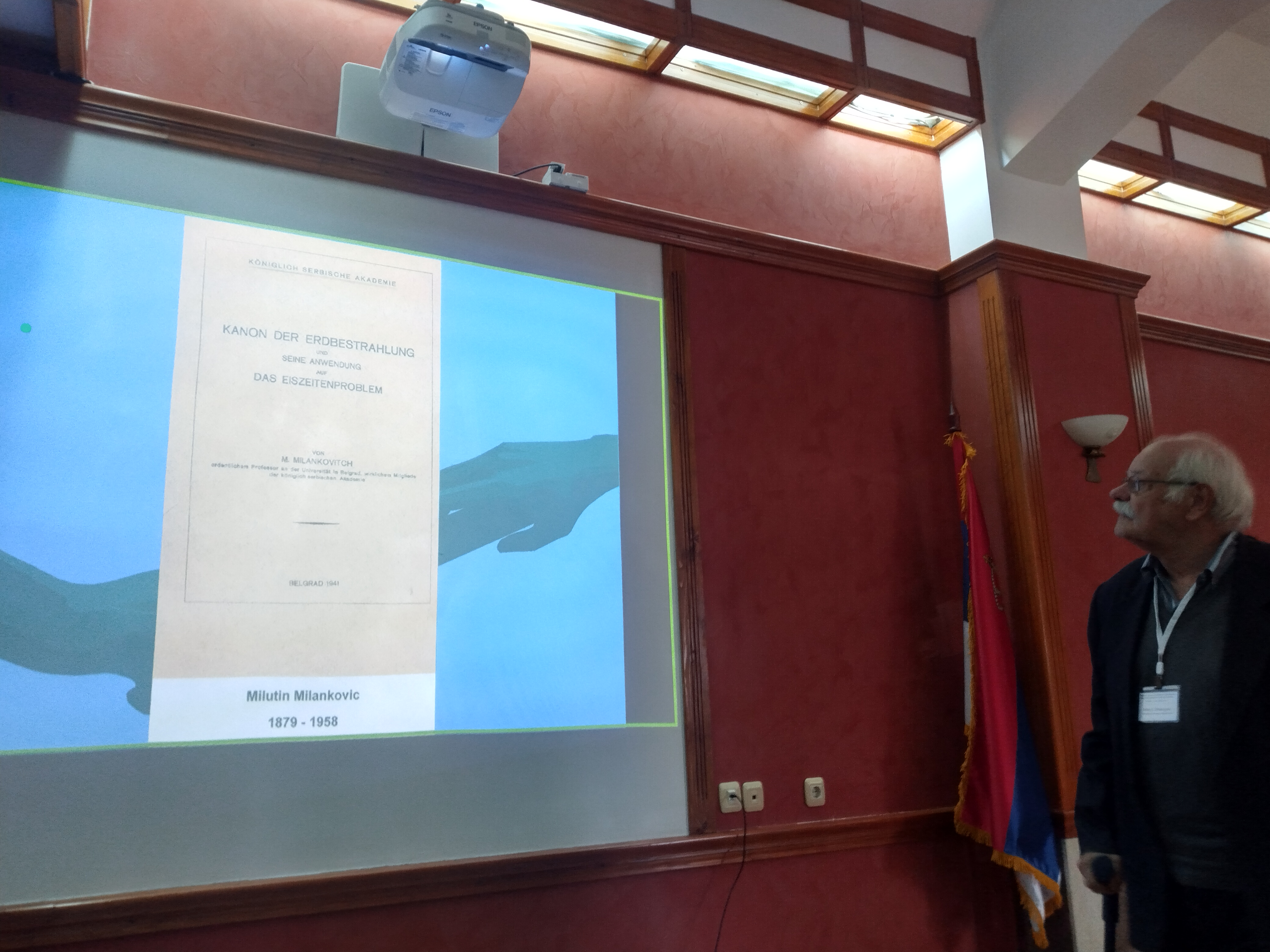
Dr. Milan Dimitrijević
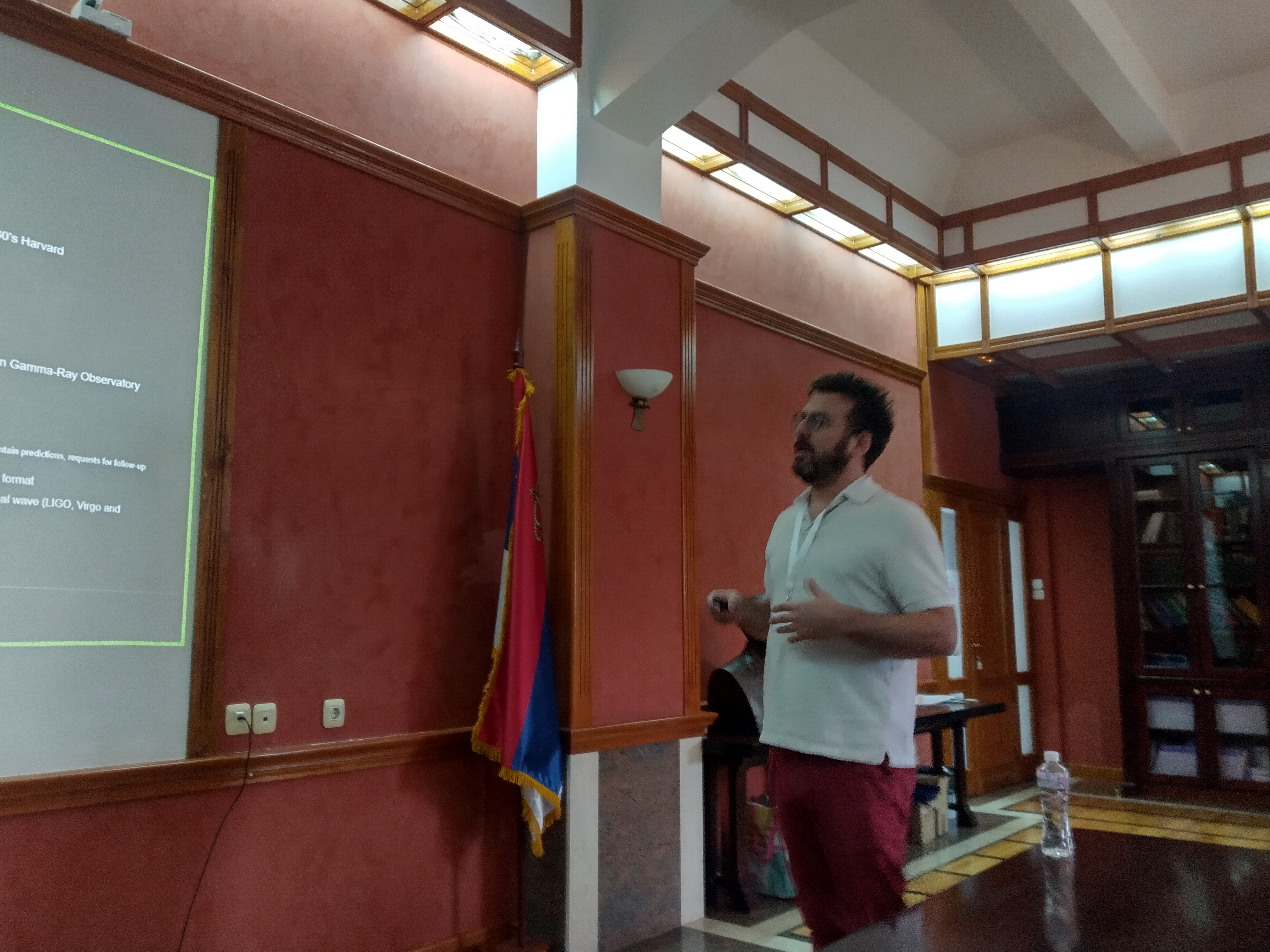
Veljko Vujčić
Workshop of the Urban Observatory of Belgrade Project
On Friday, June 20, 2025, a workshop was held at the Astronomical Observatory in Belgrade as part of the "Urban Observatory of Belgrade" (UrbObsBel) project. The workshop was opened by three directors of the Observatory, Academician Dr. Zoran Knežević, the President of the Serbian Academy of Sciences and Arts (director from 2002-2014), Dr. Gojko Djurašević (director from 2014-2023) and Prof. Dr. Luka Č. Popović (director since 2023) who addressed the audience and at the very beginning of the workshop the leader of the UrbObsBel project, Dr. Srdjan Samurović presented the project. The event brought together 24 participants from the academic community, public institutions, and the innovation sector. The introductory session presented the goals and current results of the UrbObsBel project, including the detection of light pollution sources, the biological effects of artificial lighting, and opportunities for protecting natural darkness. The program also showcased innovative equipment – hyperspectral sensors, thermal imaging cameras, and the TRON AI platform. A special segment was dedicated to international cooperation and the protection of natural darkness, through the ADRISKY project, the DarkSky Places initiative, and opportunities for establishing a Dark Sky Park on Mount Rajac. The workshop concluded with the screening of the documentary "In Search of Darkness" by the NGO Carpe Noctem, in which the participants of the UrbObsBel project were among the interviewed interlocutors, followed by an open discussion with the participants. Workshop speakers included: Dr. Srđan Samurović, Dr. Rade Pavlović, Dr. Zoran Simić, Dr. Branislav Rovčanin, Dr. Dragan Lukić, Mr. Saša Žilić, Mr. Nikola Galiot, Dr. Marko Prokić, Mr. Branko Radan, Dr. Dajana Bjelajac and Mr. Zoran Tanasijević.
We extend our sincere thanks to all the speakers and participants for their contributions, presence, and knowledge exchange.
This research was supported by the Science Fund of the Republic of Serbia, grant no. 6775, Urban Observatory of Belgrade - UrbObsBel.
Image gallery from the workshop is available here.
Workshop of the UrbObsBel project
On Friday, June 20, 2025, the Workshop of the UrbObsBel project will be held at the Astronomical Observatory in Belgrade. The Workshop program is available here.
Presentation of the UrbObsBel project at conferences in the country and abroad
The UrbObsBel project was presented at the 18th International Photonics Workshop on Kopaonik from March 16 to 20, 2025, where Dr. Dragan Lukić presented the hyperspectral imaging device developed within the project.
Project UrbObsBel was also presented at the 7th Workshop Solar Influences on the Magnetosphere, Ionosphere and Atmosphere, in Primorsko, Bulgaria from June 2 to 6, 2025, by Dr. Zoran Simić.
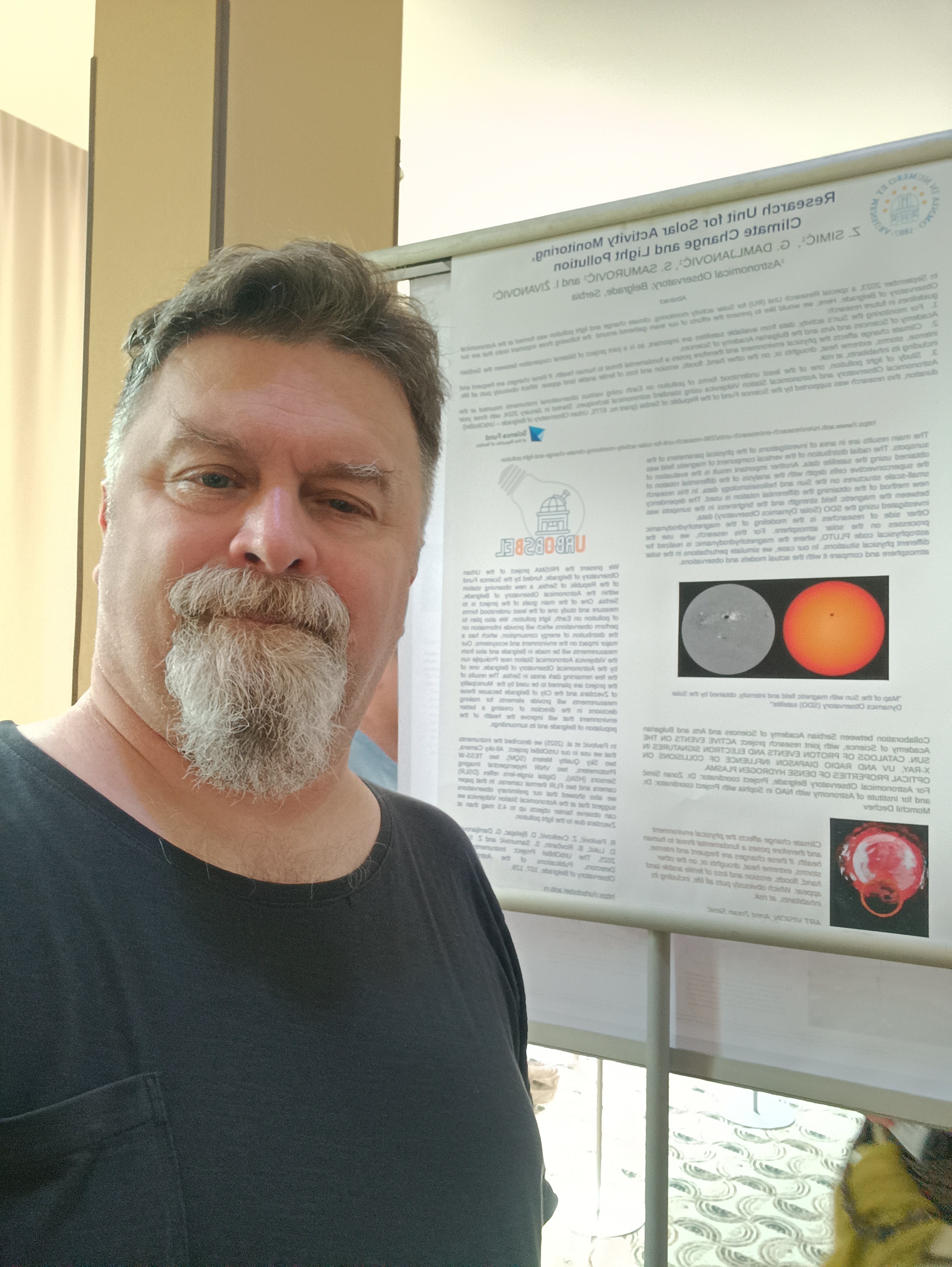
Dr. Zoran Simić
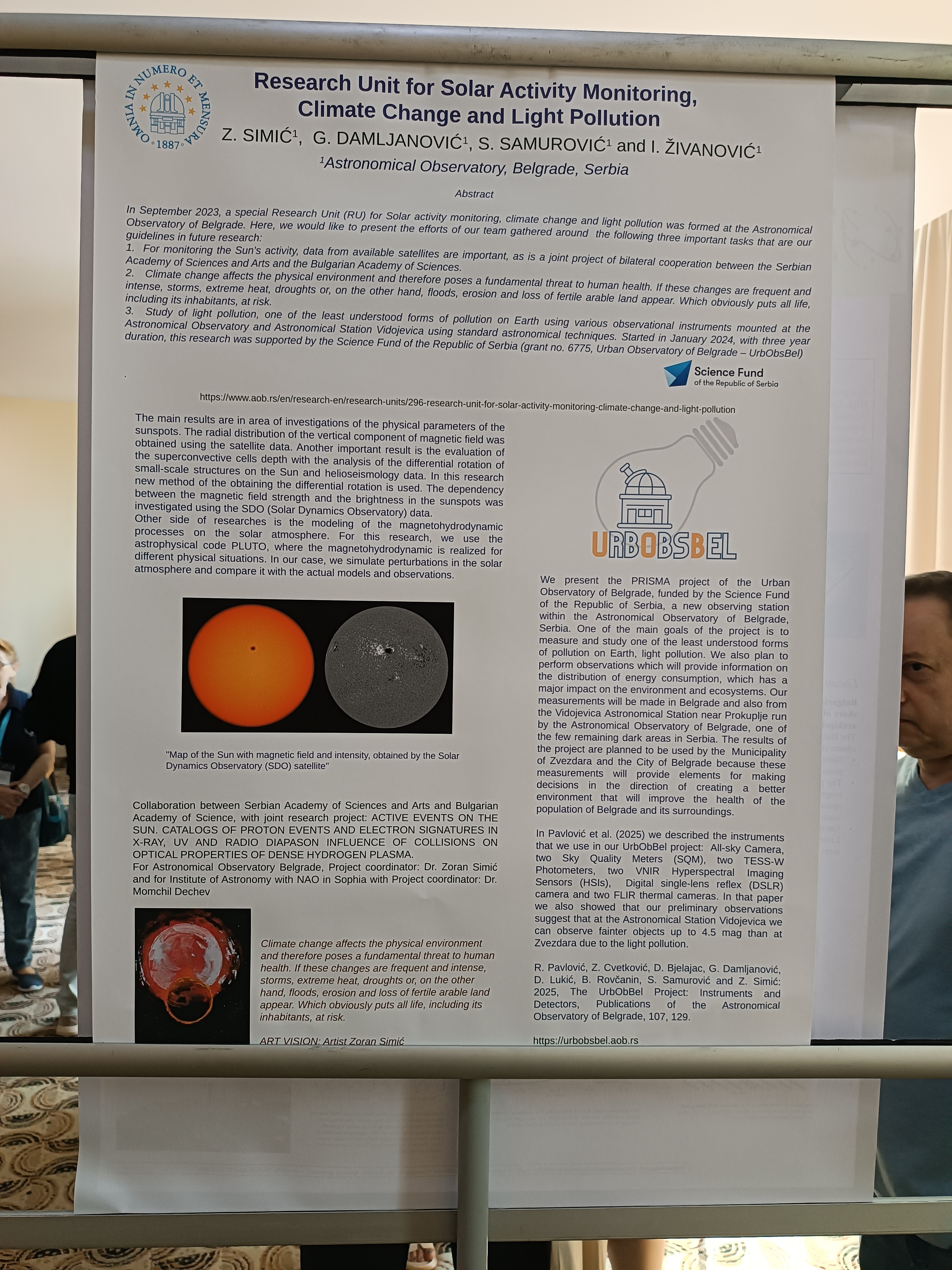
Visit of the People's Republic of China Delegation to the Astronomical Observatory during the 67th International Fair of Technics and Technical Achievements
On May 22, 2025, a two-member delegation from the Embassy of the People's Republic of China, consisting of Mr. Hu Zhiyu and Mr. Wang Kang, visited the Astronomical Observatory. In a conversation with the Director of the Astronomical Observatory, Dr. Luka Popović and the members of the staff, they analyzed future cooperation in the field of space research, during which the MOSAIC CubeSat project was presented, as well as proposals for possible experiments on the Chinese Tiangong space station. The active PRISMA project of the Urban Observatory of Belgrade (UrbObsBel), funded by the Science Fund of the Republic of Serbia, was briefly presented to the distinguished guests from China.
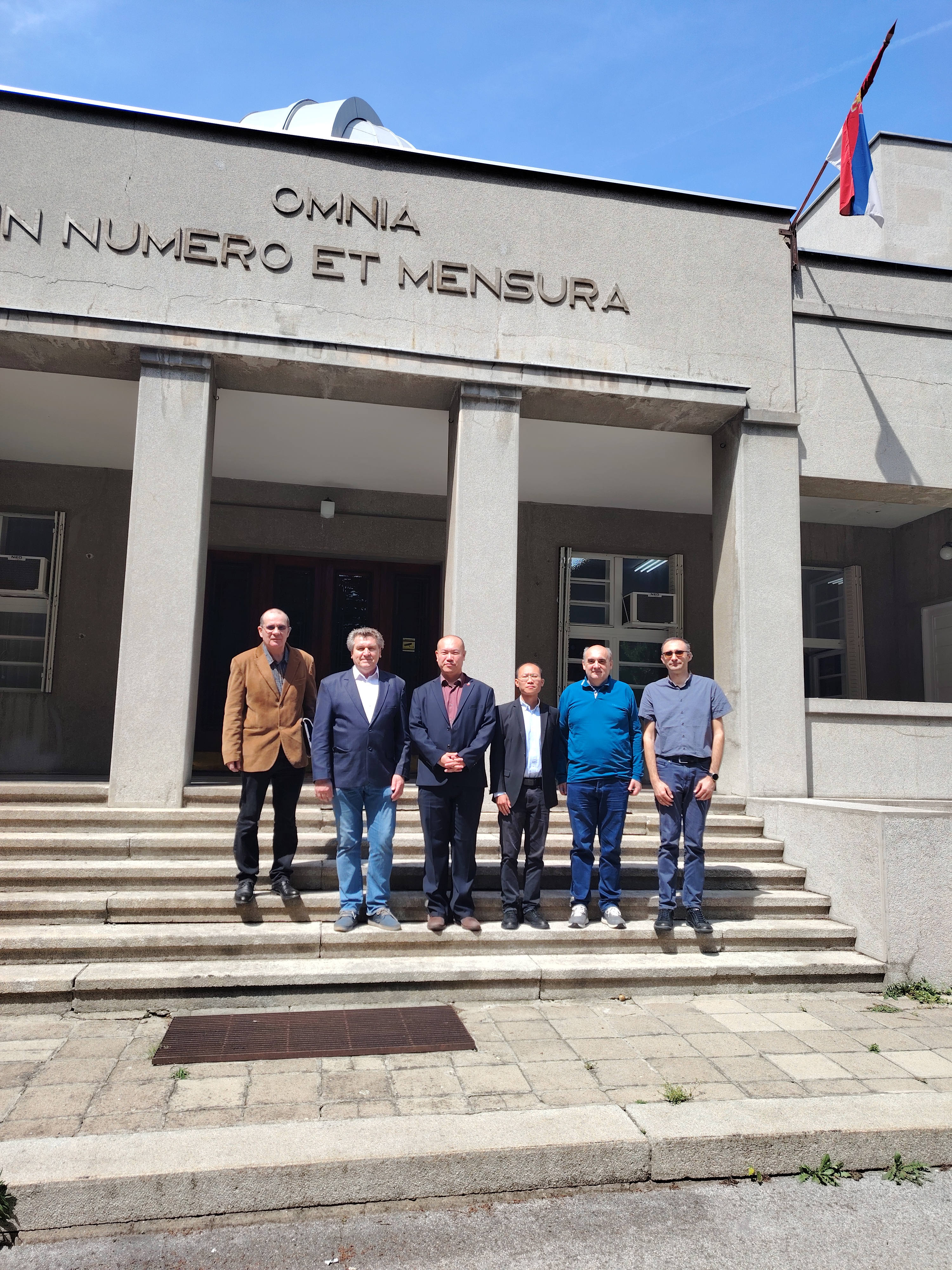
Dr. Srdjan Samurović, Dr. Luka Popović, Mr. Hu Zhiyu, Mr. Wang Kang, Dr. Predrag Jovanović and Dr. Milan Stojanović
The UrbObBel Project at the 67th International Fair of Technics and Technical Achievements (20-23 May 2025)
The Astronomical Observatory of Belgrade once again presented itself at the exhibition "Play for Humanity - Science for All" held within the framework of the 67th International Fair of Technics and Technical Achievements with three active projects. The CubeSat project MOSAIC was presented, the goals of which are to observe the Sun in X-ray radiation and observe the planet Earth from orbit. On this project, the Astronomical Observatory cooperates with the Mihajlo Pupin Institute and three faculties of the University of Belgrade: the Faculty of Mathematics, the Faculty of Mechanical Engineering and the Faculty of Electrical Engineering. In addition to this project, the Astronomical Observatory also presented two PRISMA projects funded by the Science Fund of the Republic of Serbia, led by the Astronomical Observatory and which started in early 2024: the Urban Observatory of Belgrade (UrbObsBel, with the participation of researchers from the Institute of Physics, the Faculty of Sciences of the University of Novi Sad, as well as the Faculty of Medicine of the University of Belgrade) and the MOBY project (Modeling Binary Systems That End in Stellar Mergers and Give Rise to Gravitational Waves, with the participation of a researcher from the Faculty of Mathematics). The work of the HSI (Hyperspectral Imaging Sensor) device, whose construction is fully completed and which will be mounted on the Tower of the Astronomical Observatory as part of the PRISMA project UrbObsBel, was demonstrated live at the Fair. During the Fair, numerous useful conversations were held with distinguished guests from the country and abroad.
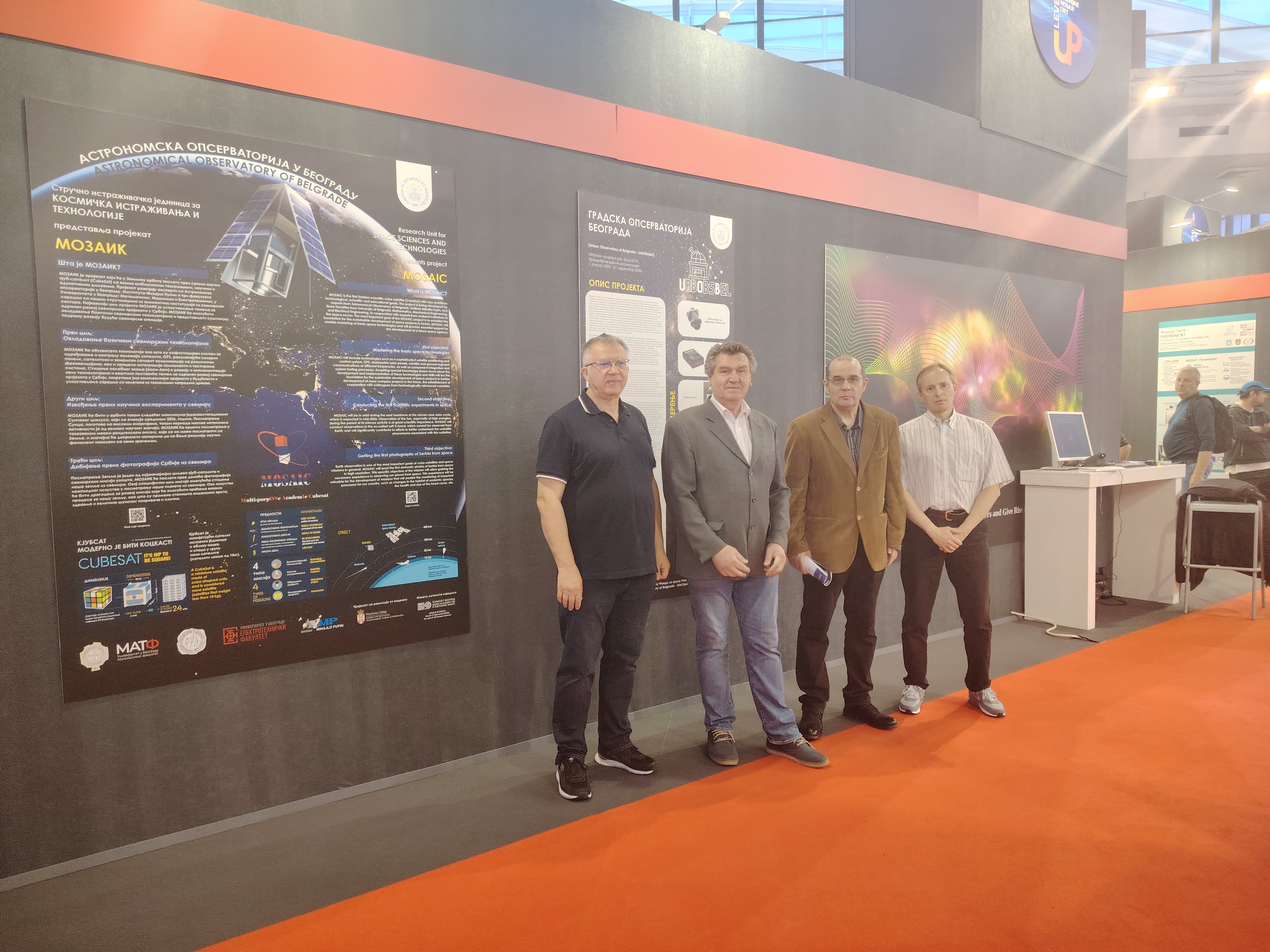
Dr. Rade Pavlović, Dr. Luka Popović, Dr. Srdjan Samurović and Jovan Aleksić
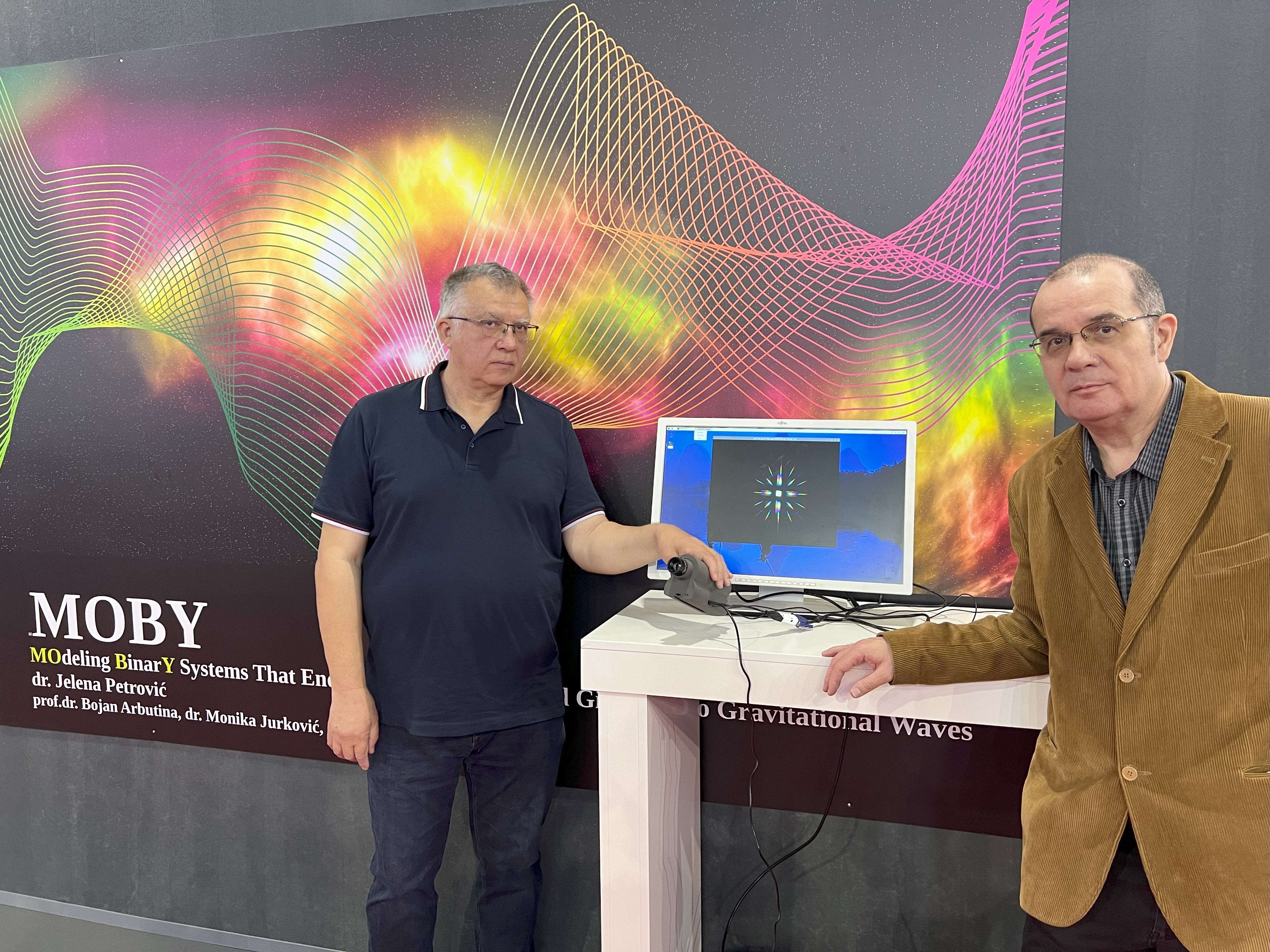
Dr. Rade Pavlović demonstrates the work of the HSI (Hyperspectral Imaging Sensor) device (on the left) and Dr. Srdjan Samurović (on the right)
RTS emisija "Od zlata jabuka" - Zvezdarnica
On Tuesday, February 18, 2025, at 12:55, Radio Television of Serbia (Serbian public radio and TV broadcaster, RTS1) broadcast the show "Golden Apple". The episode "Zvezdarnica" ("Observatory") presented the Belgrade Astronomical Observatory, one of the oldest scientific institutions in Serbia, and in addition to the director, Prof. Dr. Luka Č. Popović, among others, Dr. Srdjan Samurović, head of the UrbObsBel project, and Dr. Branislav Rovčanin, a participant in the UrbObsBel project, appeared and presented the Urban Observatory of Belgrade project, which is funded by the Science Fund of the Republic of Serbia in the period 2024-2026.
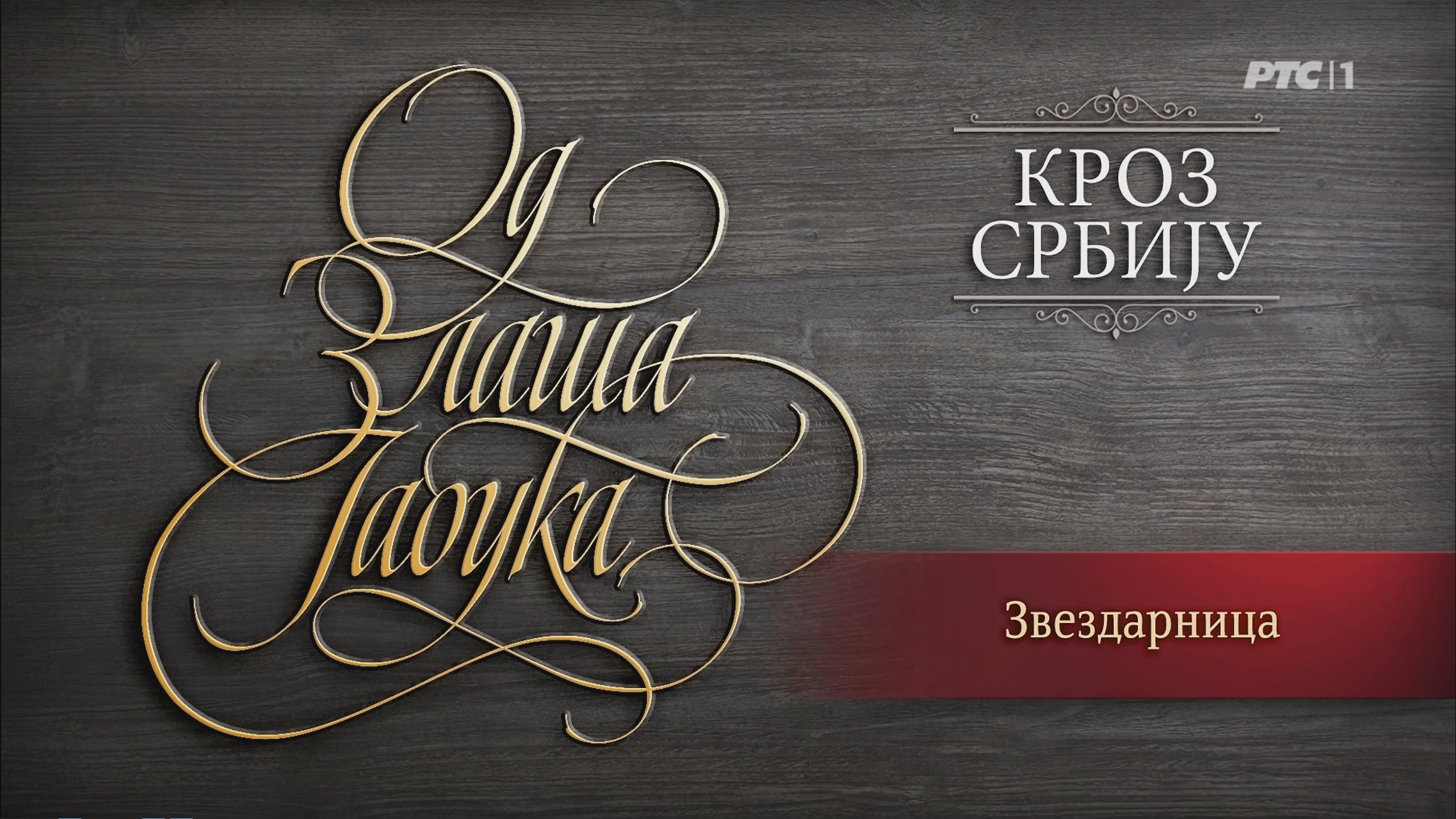
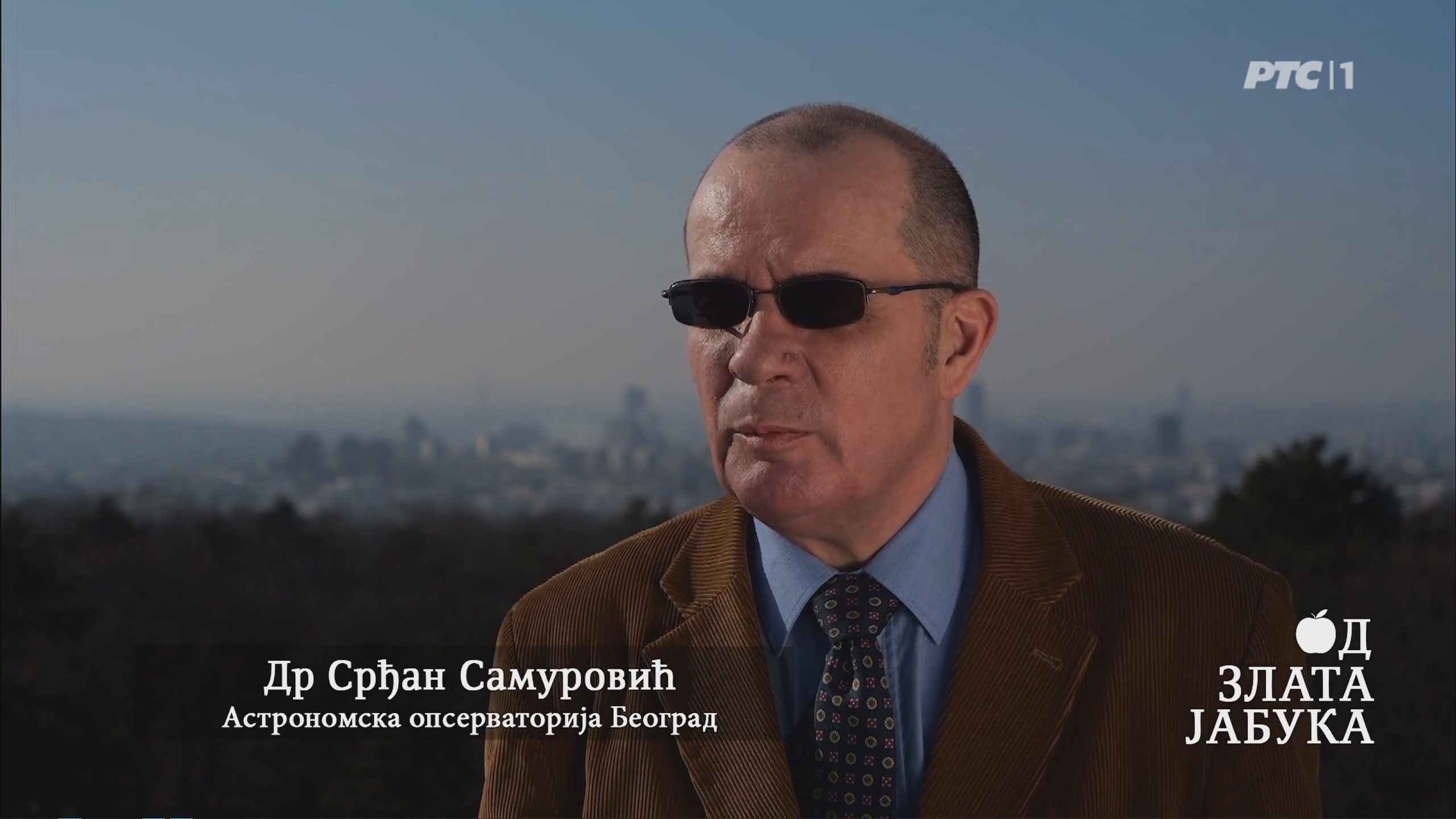
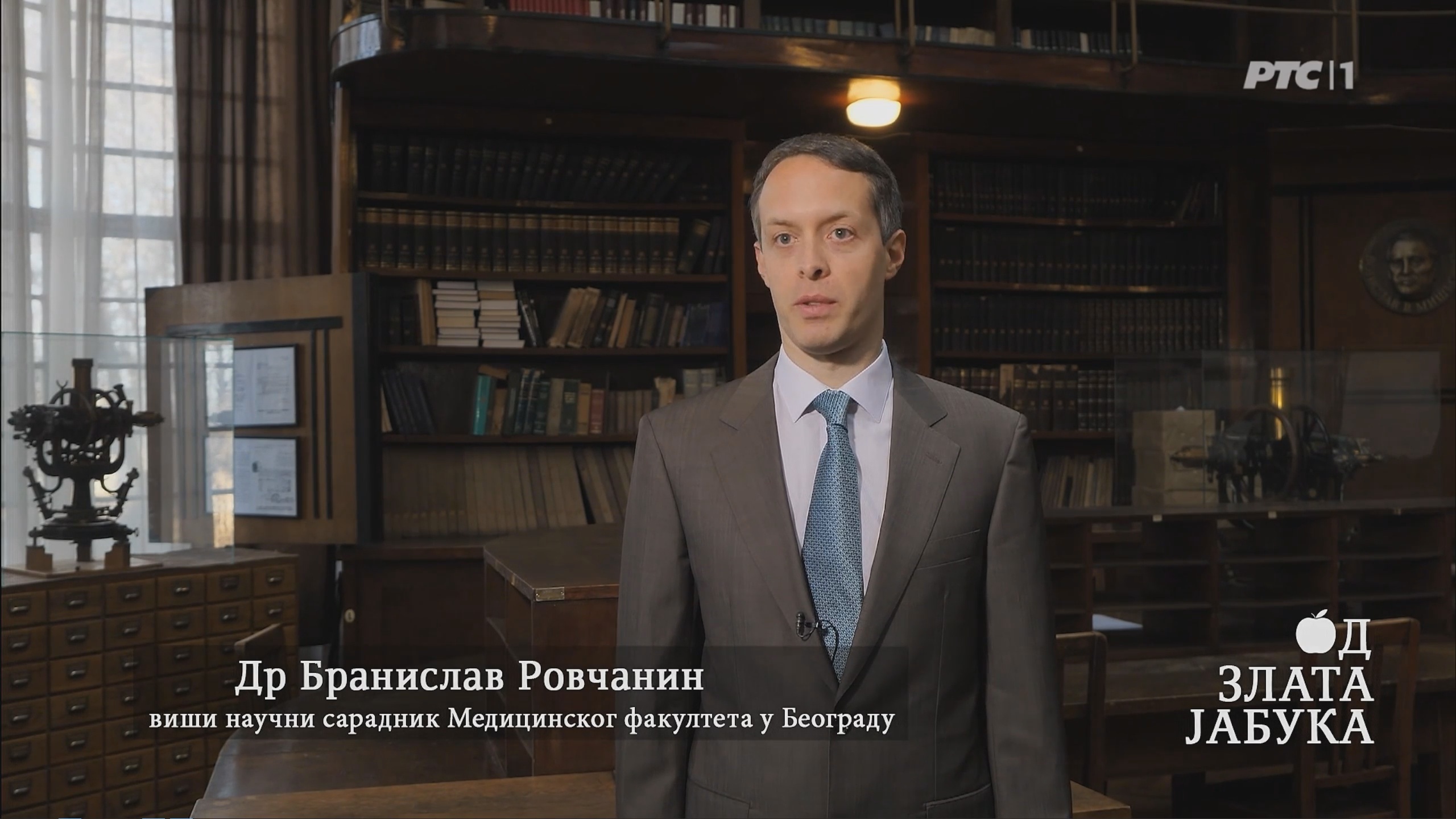
Useful Links
UrbObsBel Project – Documentary Film on Light Pollution
In September 2024, a segment of a documentary film on light pollution was recorded at the Astronomical Observatory in Belgrade, showcasing the activities of the Urban Observatory of Belgrade (UrbObsBel) project. The documentary was conceptualized and produced by the Carpe Noctem NGO, with the support of the Science Club in Novi Sad (Center for the Promotion of Science).
After the filming and production process was completed, the film had its premiere screening on November 8, 2024, at the Science Club in Novi Sad. Throughout 2025, additional screenings are planned across various cities in Serbia, with the goal of raising awareness about the issue of light pollution.
On behalf of the project team, Zorica Cvetković and Srđan Samurović presented the significance of the Astronomical Observatory in Belgrade, as well as the planned activities within the UrbObsBel project, while Dajana Bjelajac actively contributed to the creation of the documentary.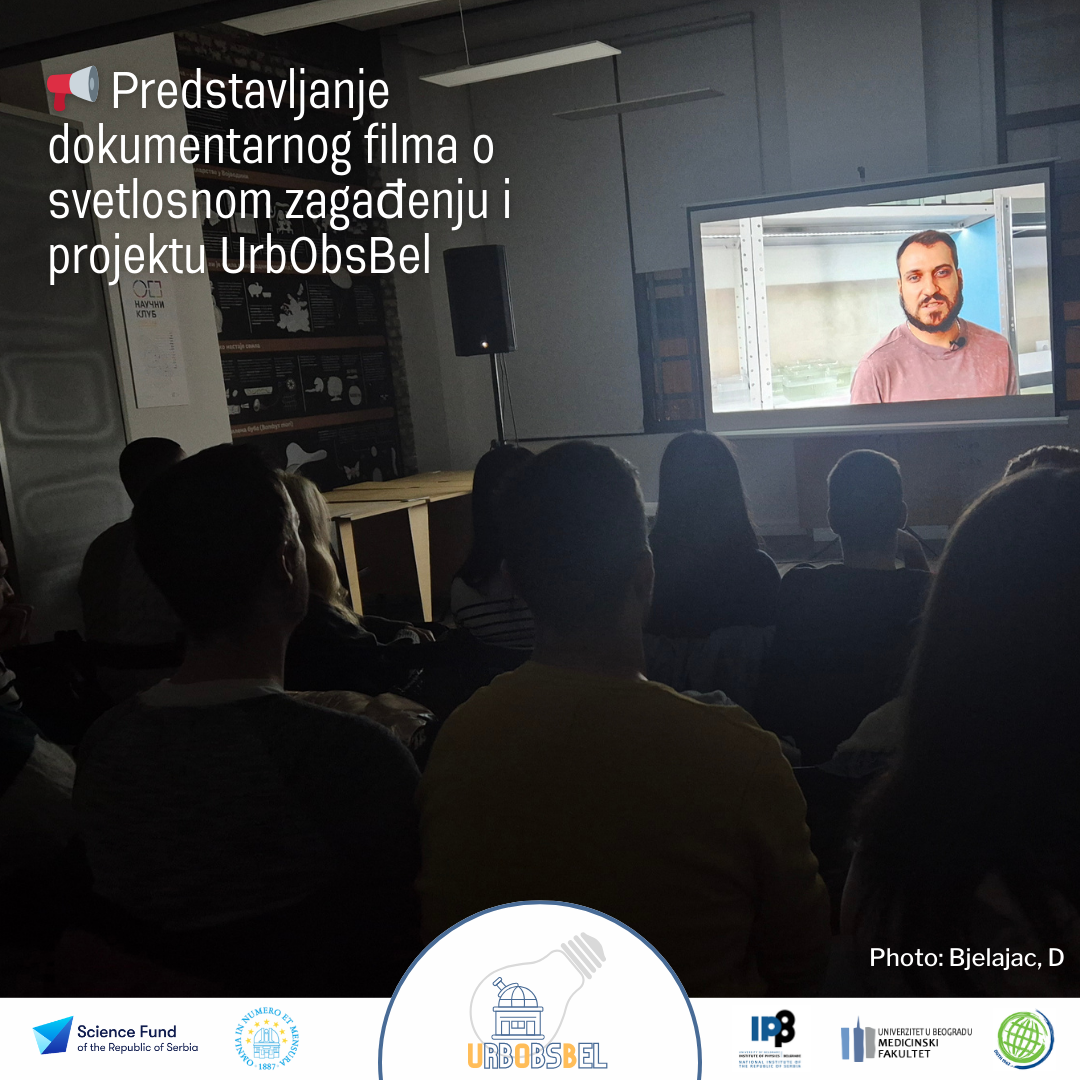
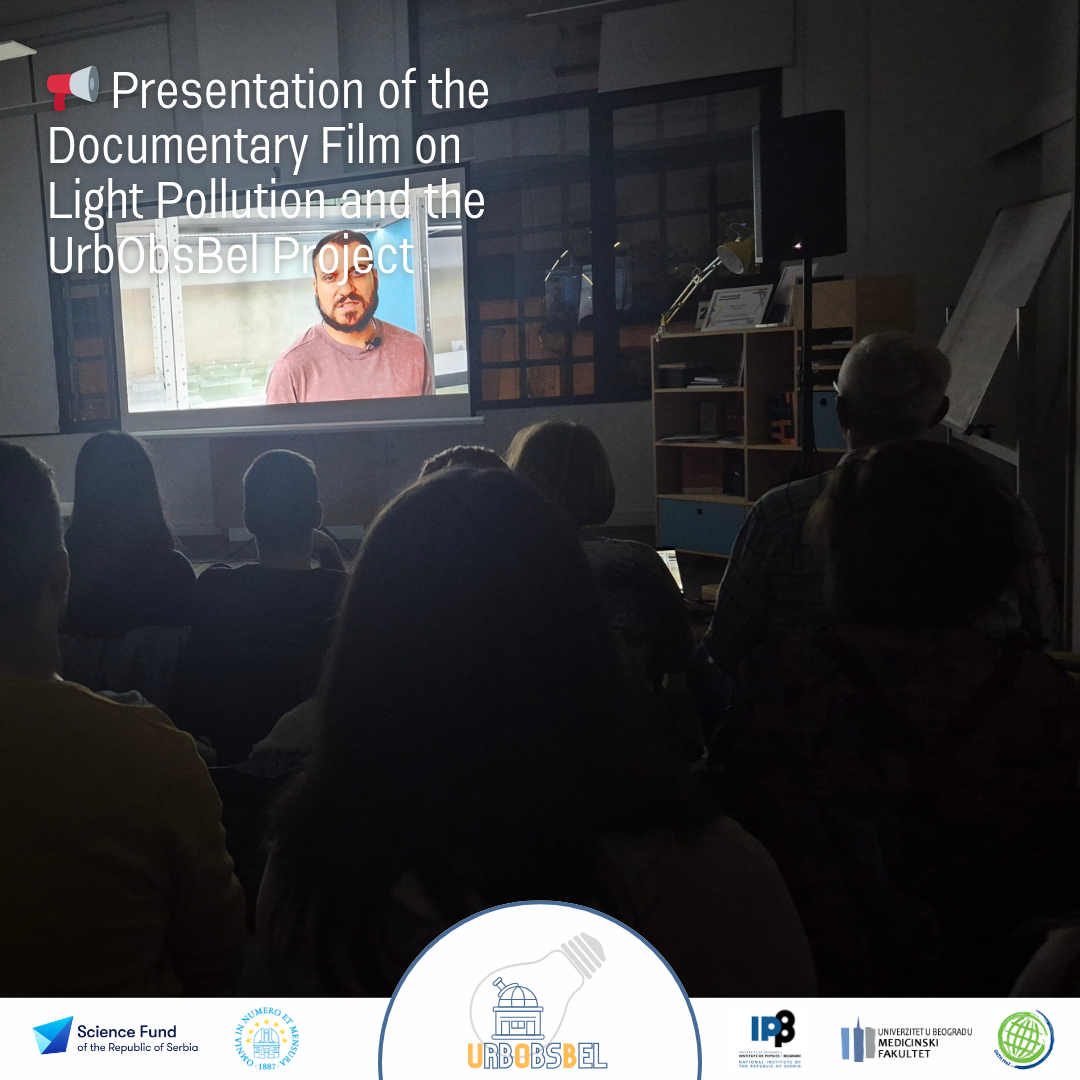
Useful Links
Serbian service of the BBC published a report
The Serbian service of the BBC published a report on light pollution on Saturday, November 23, 2024, in which their journalist, Milica Radenković Jeremić, interviewed the participants of the UrbObsBel project Dr. Dajana Bjelajac and Dr. Srdjan Samurović. The text is available here.
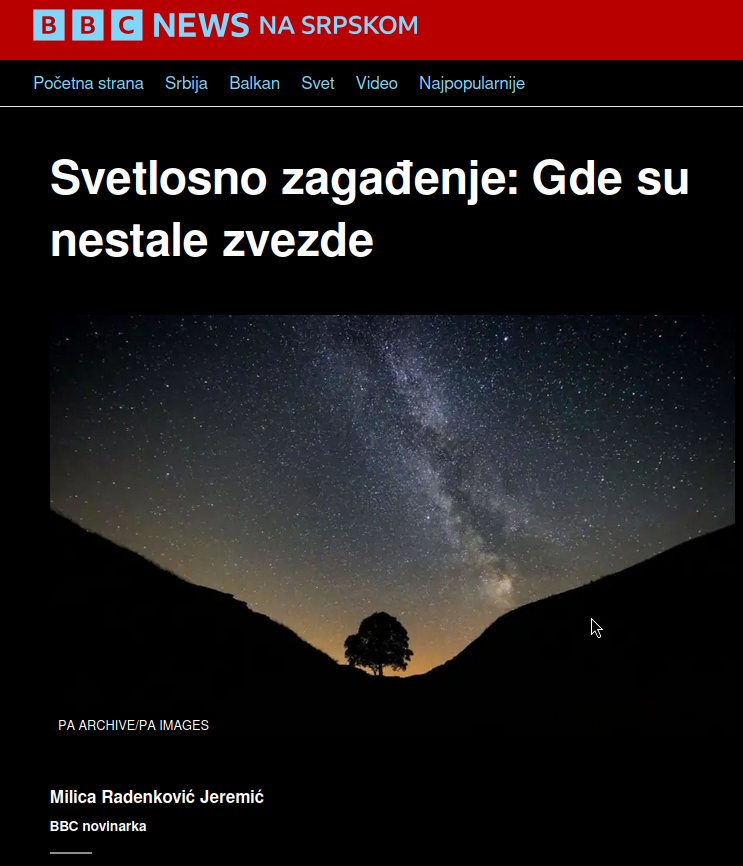
Serbian magazine Planeta
The Serbian magazine Planeta recently dedicated its 119th issue to contemporary research in astronomy. It also briefly presents, among other things, the Science Fund's project, the Urban Observatory of Belgrade (UrbObBel). The link to this issue of Planeta is here.
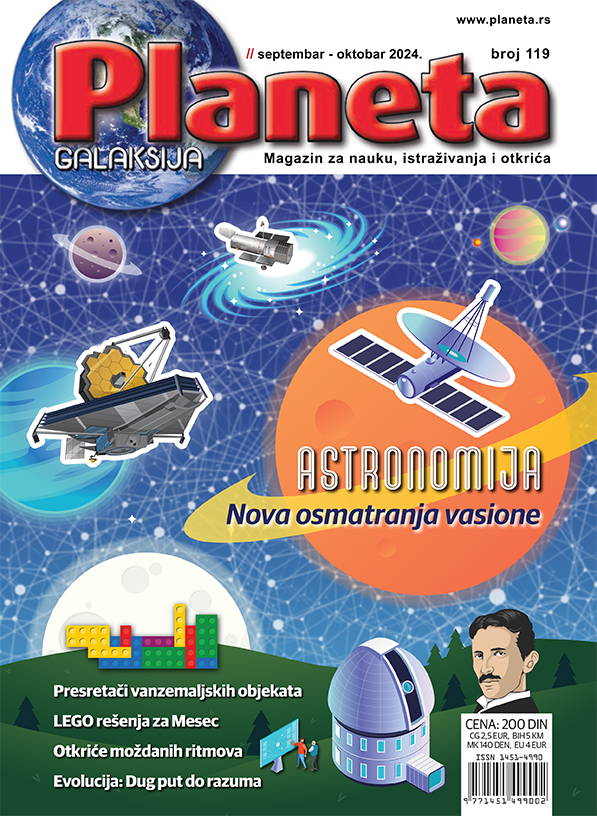
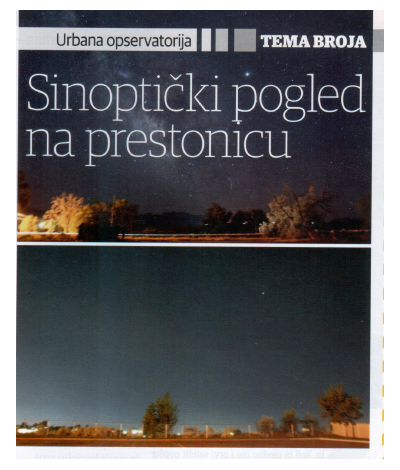
National Forum on Contemporary Space Research 2024
The National Forum on Contemporary Space Research (NaFSKI) organized a conference in Sofia from 22-24 October 2024 to showcase the latest achievements of education, science and business in Bulgaria in the field of space.
The fifth edition of NaFSKI is organised by Branch Cosmos of UPB, the Institute of Astronomy and National Astronomical Observatory – BAS and Ratio popular science communication platform. It gathers leading researchers and innovators from Bulgaria and beyond, creating new opportunities for collaboration. The PRIZMA project of the City Observatory of Belgrade (UrbObsBel) was presented by Dr. Zoran Simić with the invitation lecture titled Urban Observatory – Light Pollution on the second day of the conference.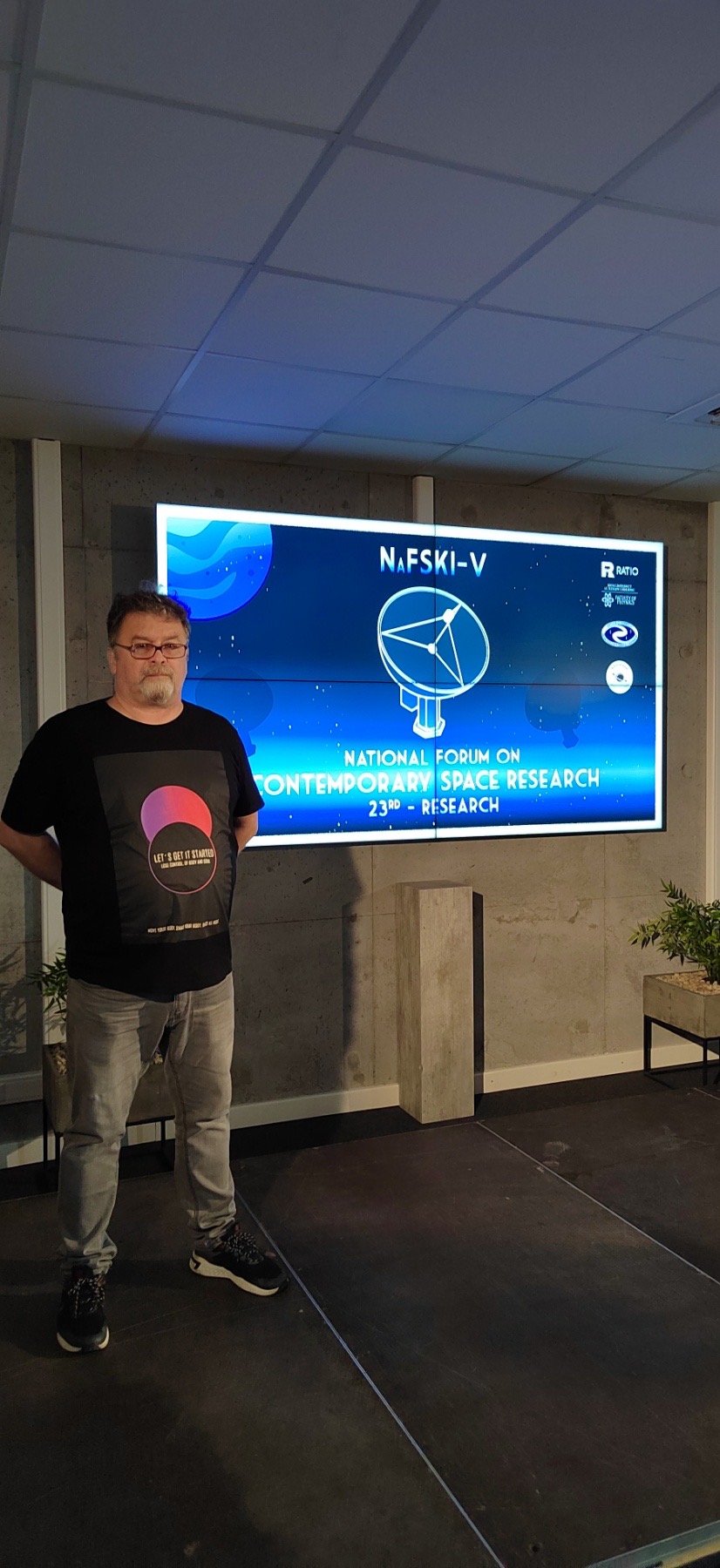
Dr. Zoran Simić
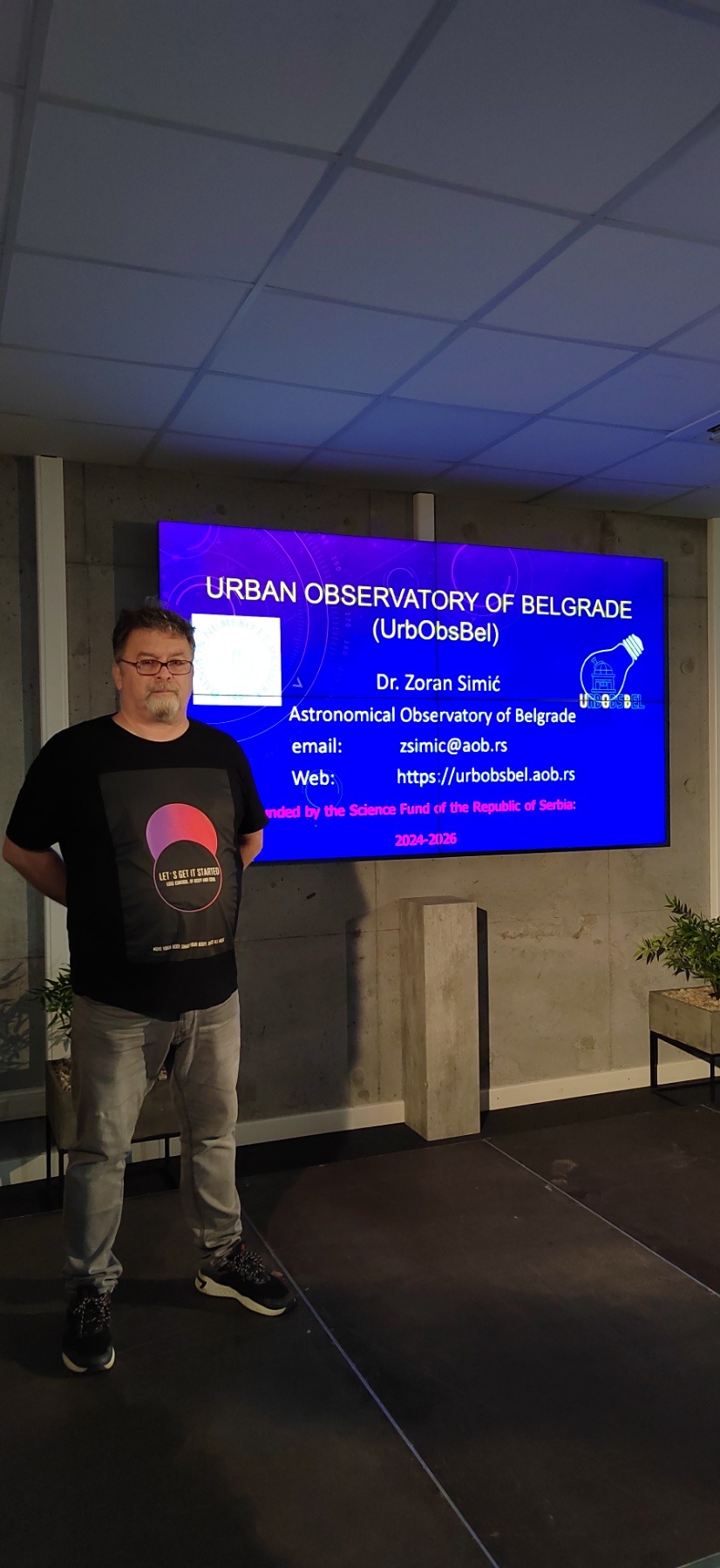
Dr. Zoran Simić
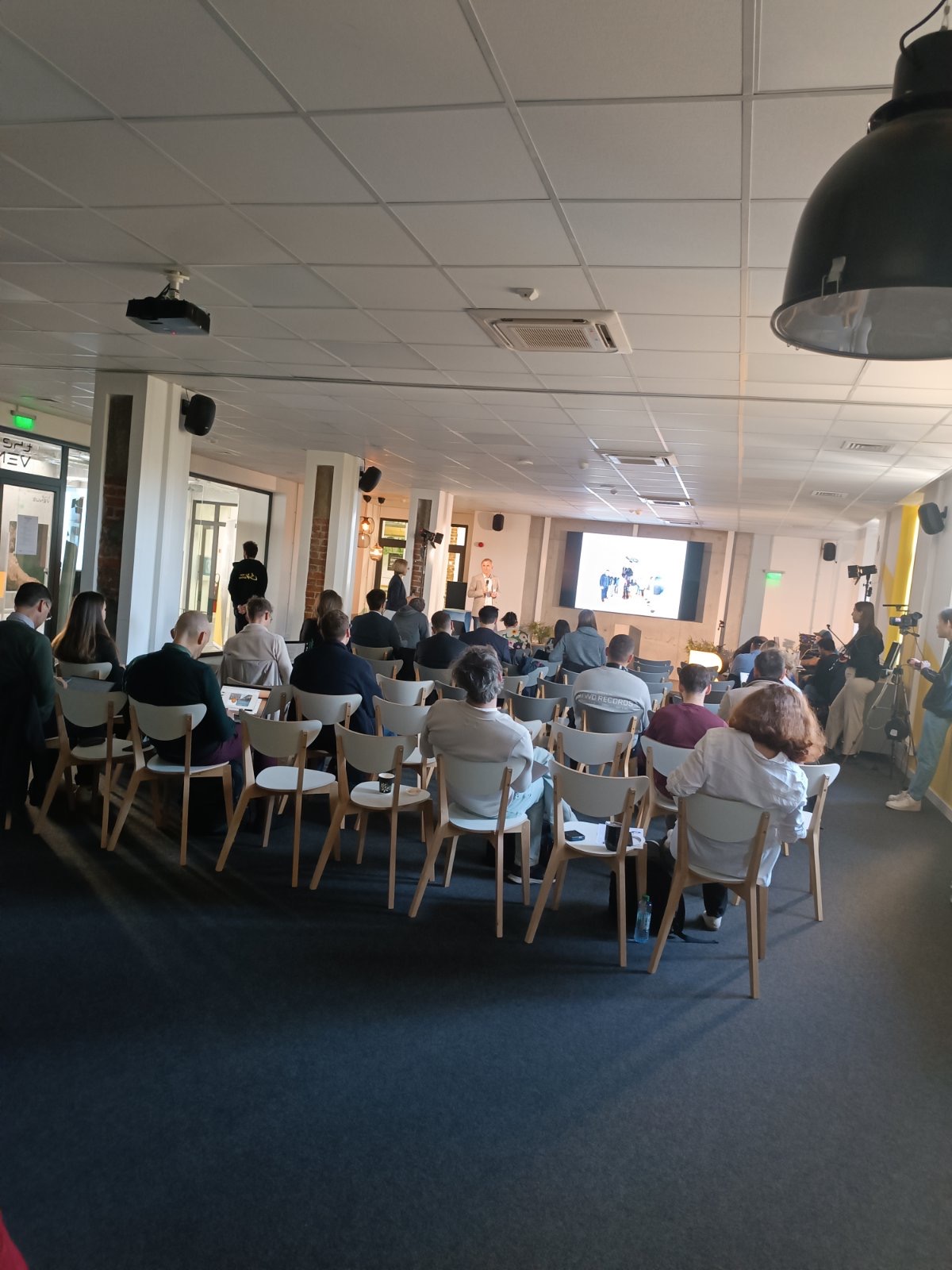
Conference session
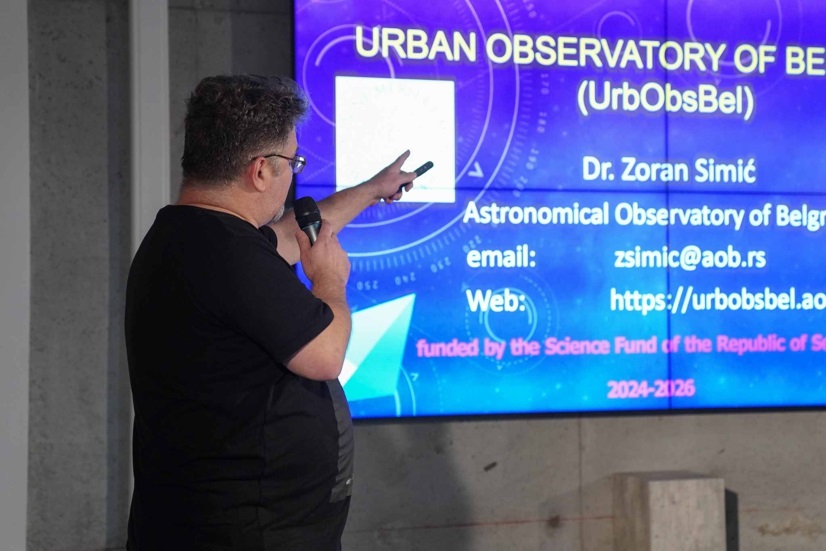
Dr. Zoran Simić
World Space Week
On October 10, 2024 as part of World Space Week, the Science Club at the Center for the Promotion of Science in Belgrade hosted the panel discussion "Space and Climate Change." The event emphasized the vital role of space technologies, particularly satellite observations, in understanding climate change and creating sustainable solutions.
Minister Dr. Jelena Begović and World Space Week Association's Executive Director Alma Okpalefe opened the event. Key Serbian projects were presented, including the MOSAIC project described by Dr. Dušan Marčeta, Mathematical Faculty of the University of Belgrade, the "Vidojevica Dark Sky Park" by Dr. Dajana Bjelajac on behalf of the NGO Carpe Noctem, and Research Unit for Solar Activity Monitoring, Climate Change and Light Pollution of the Astronomical Observatory of Belgrade, introduced by principal research fellow Dr. Srđan Samurović.
The discussion concluded with insights from the BioSense Institute's citizen science project, "Nurturing the Connection with Soil," highlighting citizen involvement in monitoring biodiversity and soil health.
Dr. Srđan Samurović and Dr. Dajana Bjelajac participated on behalf of UrbObsBel team and presented some of the most important aspects of the project.
"Urban Observatory of Belgrade" project is funded by the Science Fund of the Republic of Serbia, reg. no. 6775.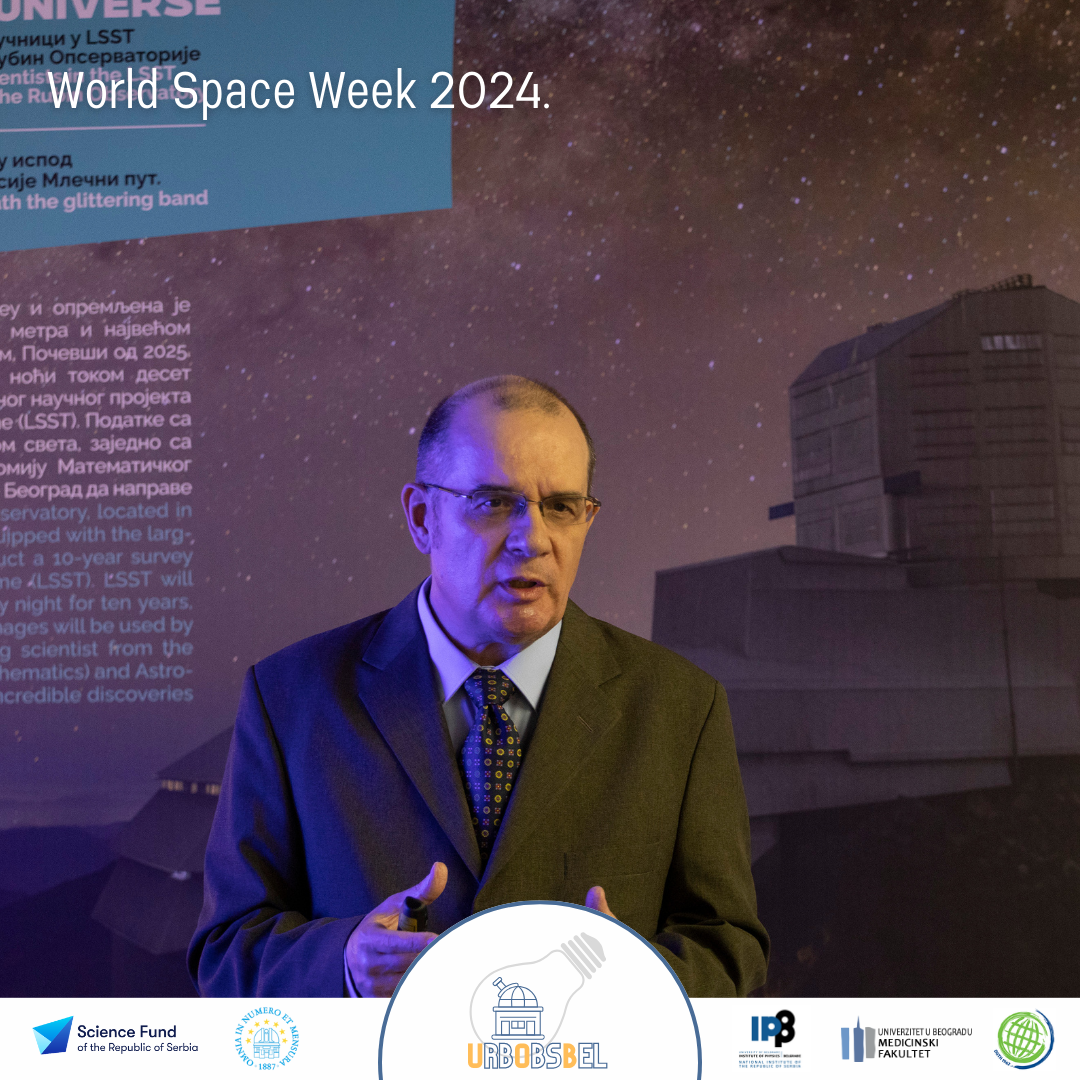
Dr. Srđan Samurović
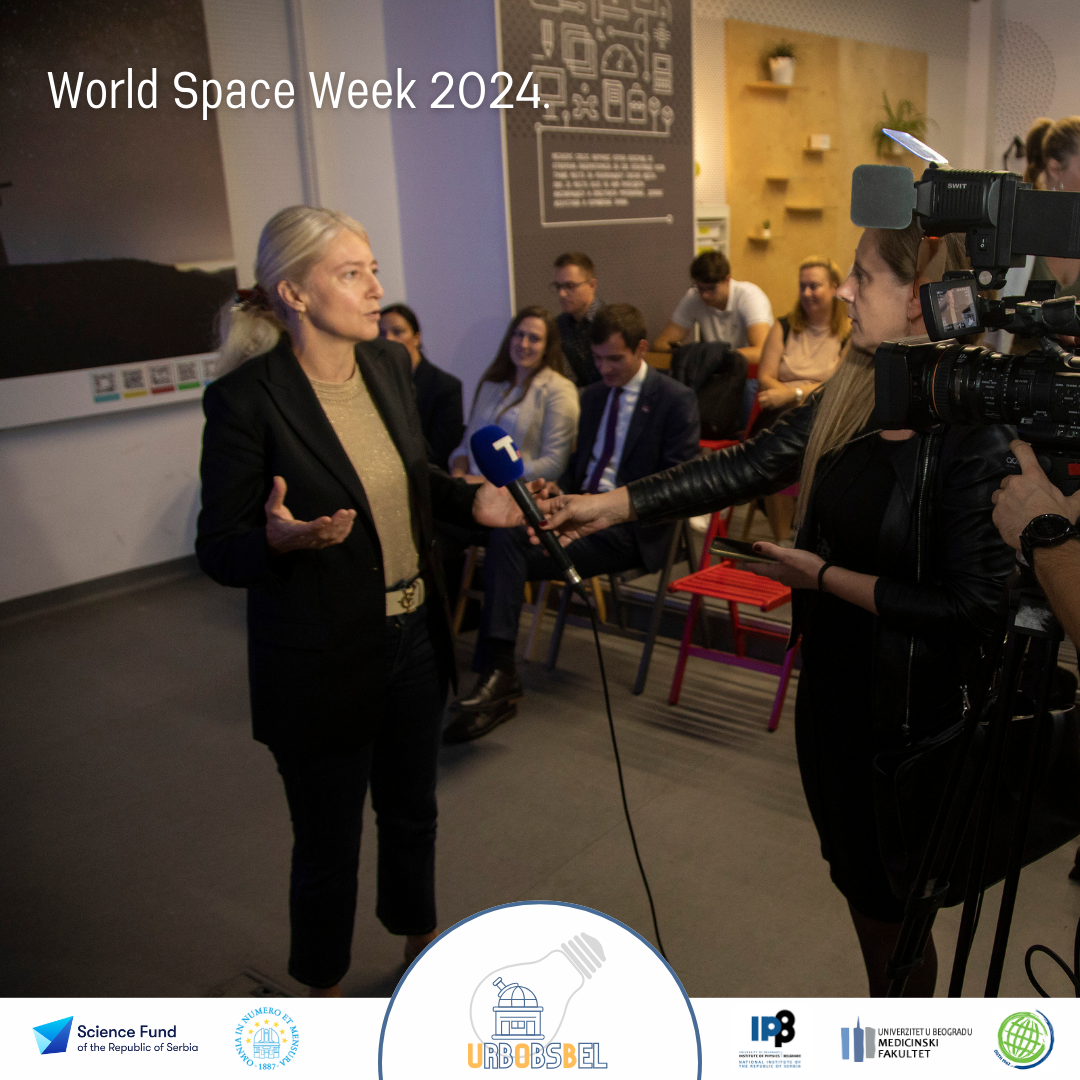
Minister Dr. Jelena Begović
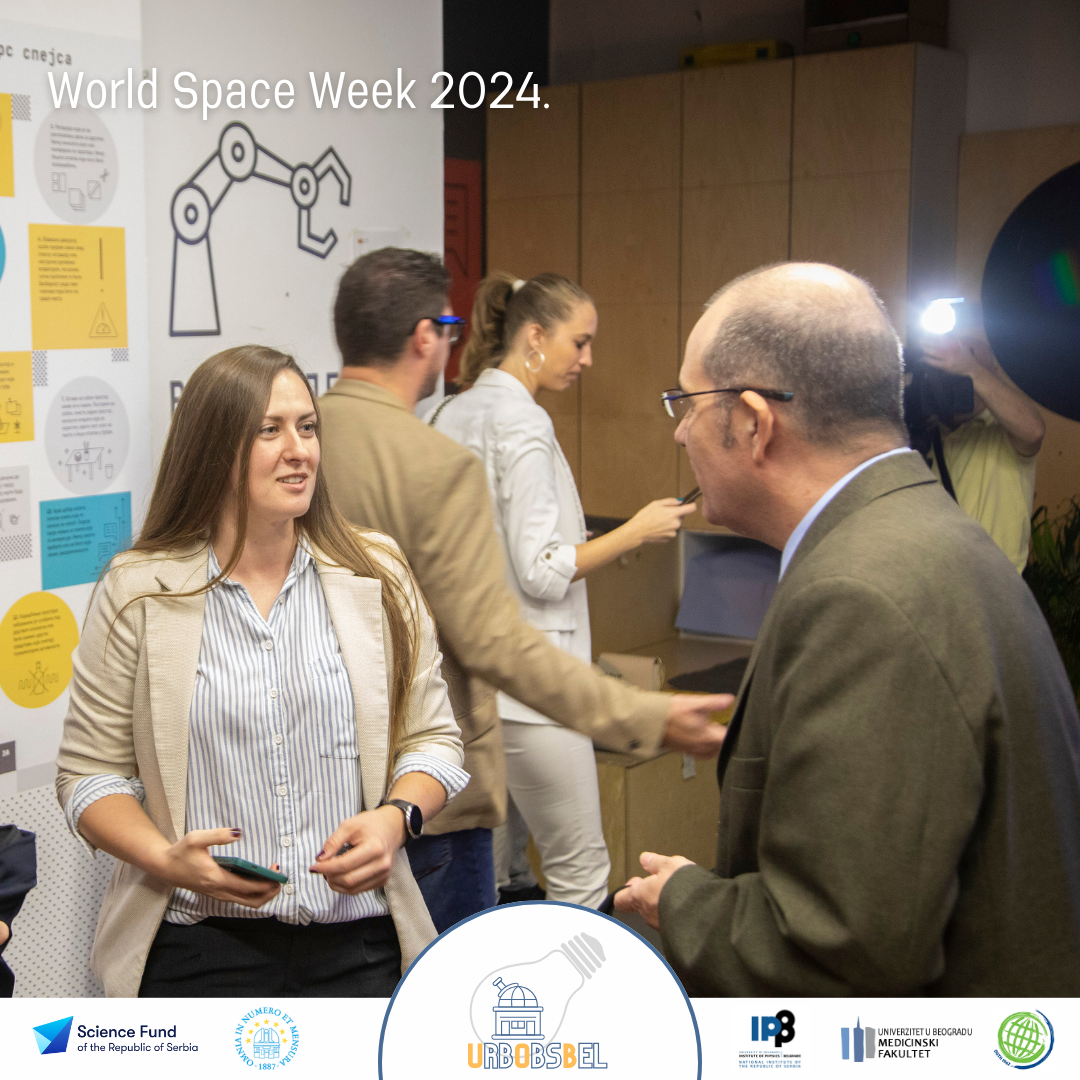
Dr. Dajana Bjelajac and Dr. Srđan Samurović
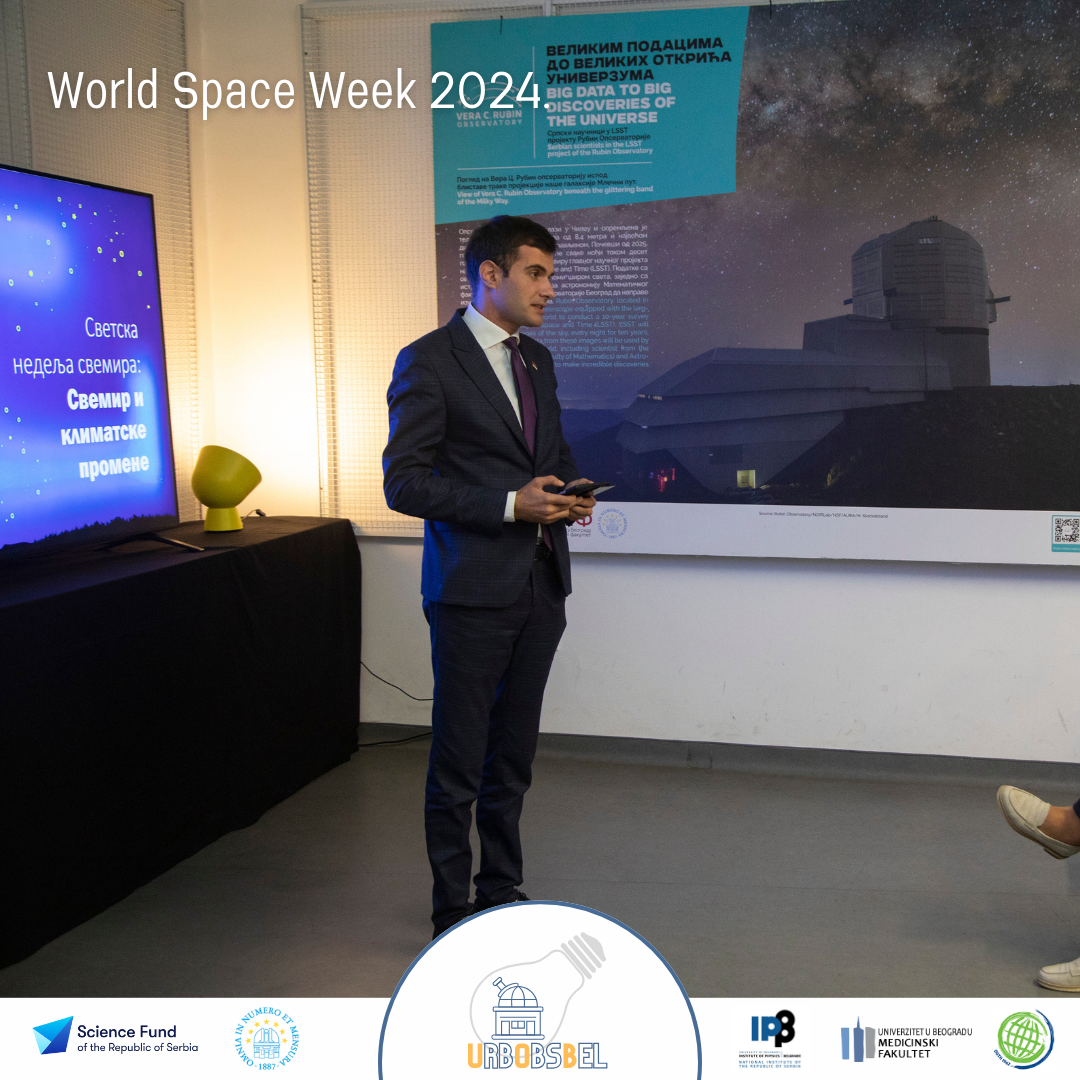
Zoran Tomić
Useful Links
Uproar in the Cosmos
In honor of World Space Week, Zoran Tomić, advisor to the Minister of Science, Technological Development, and Innovation and the national coordinator of the event; Dr. Dajana Bjelajac, Assistant Professor at the Faculty of Sciences in Novi Sad; and Dr. Srđan Samurović, astronomer and Scientific Advisor at the Astronomical Observatory Belgrade, appeared on the RTS Lab program. They discussed how astronomers and other enthusiasts marked World Space Week, as well as the latest research and projects in the field.
Dr. Srđan Samurović and Dr. Dajana Bjelajac represented the UrbObsBel team, presenting the most significant aspects of the project.
This research was supported by the Science Fund of the Republic of Serbia, grant no. 6775, Urban Observatory of Belgrade - UrbObsBel.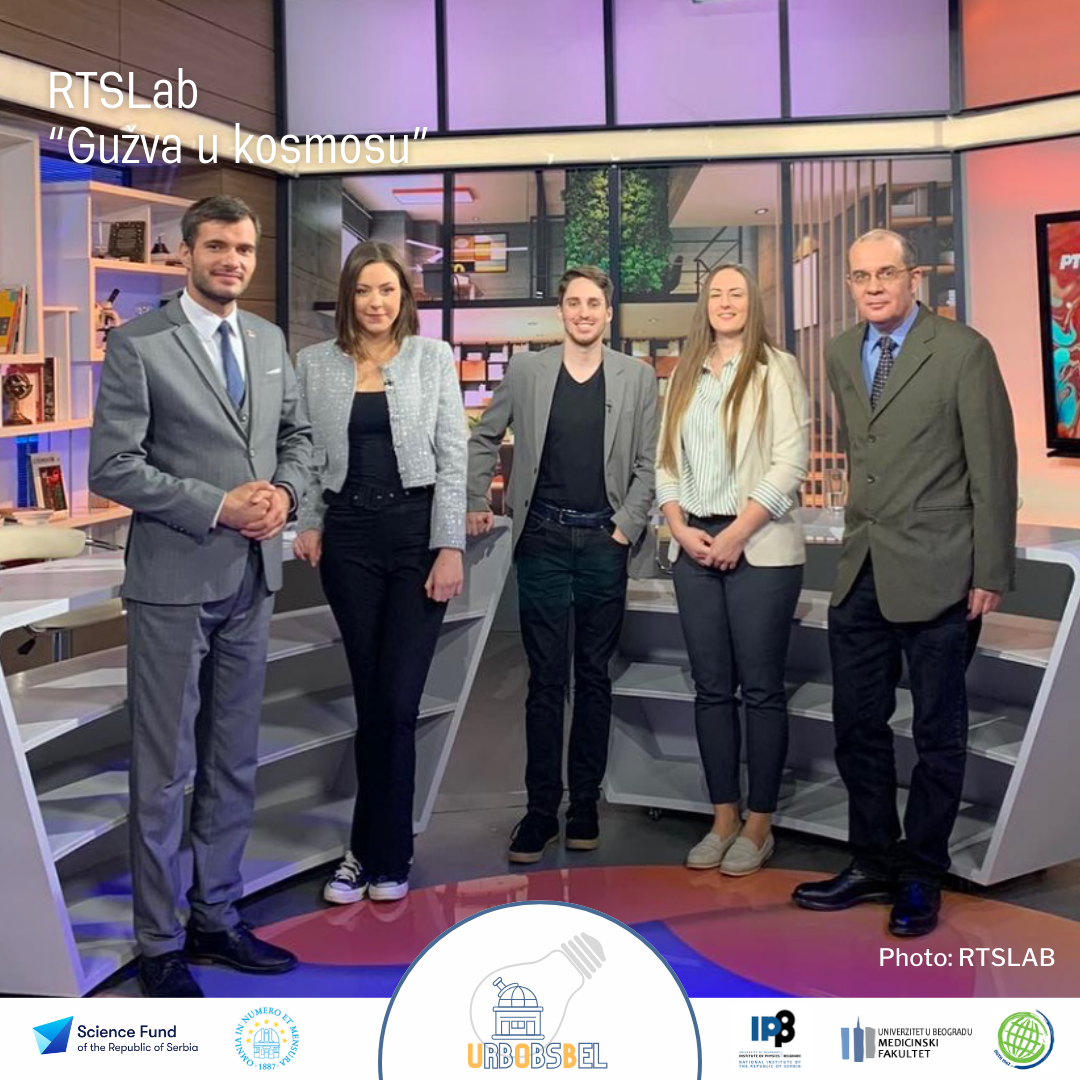
Zoran Tomić, Ivanka Joksimović, Viktor Manević, dr Dajana Bjelajac and dr Srđan Samurović
Useful Links
XIV Serbian-Bulgarian Astronomical Conference
At the XIV Serbian-Bulgarian Astronomical Conference, held in Vrnjačka Banja from September 23 to 27, 2024, the project Urban Observatory of Belgrade was presented by Dr. Zorica Cvetković, Dr. Goran Damljanović, Dr. Rade Pavlović and Dr. Zoran Simić with three posters. The first poster titled "URBAN OBSERVATORY OF BELGRADE (UrbObsBel)" gave a description of our project of Urban Observatory of Belgrade, i.e. to follow the development of the city and its impact on environment through light pollution during the next three years. On the second poster "The UrbObsBelProject: Instruments and Detectors" we have shown all the instruments and devices that we use or will use to measure light pollution on various wavelengths. By saving and analyzing this data, we will suggest to the city authorities the possible steps to reduce the impact of light pollution on the environment. On the third poster "QUANTIFICATION OF LIGHT POLLUTION IN URBAN REGION OF BELGRADE" the results of the determination of light pollution above Belgrade's center are presented, whereby the obtained high values of light pollution are expected in urban areas.
This research was supported by the Science Fund of the Republic of Serbia, grant no. 6775, Urban Observatory of Belgrade - UrbObsBel.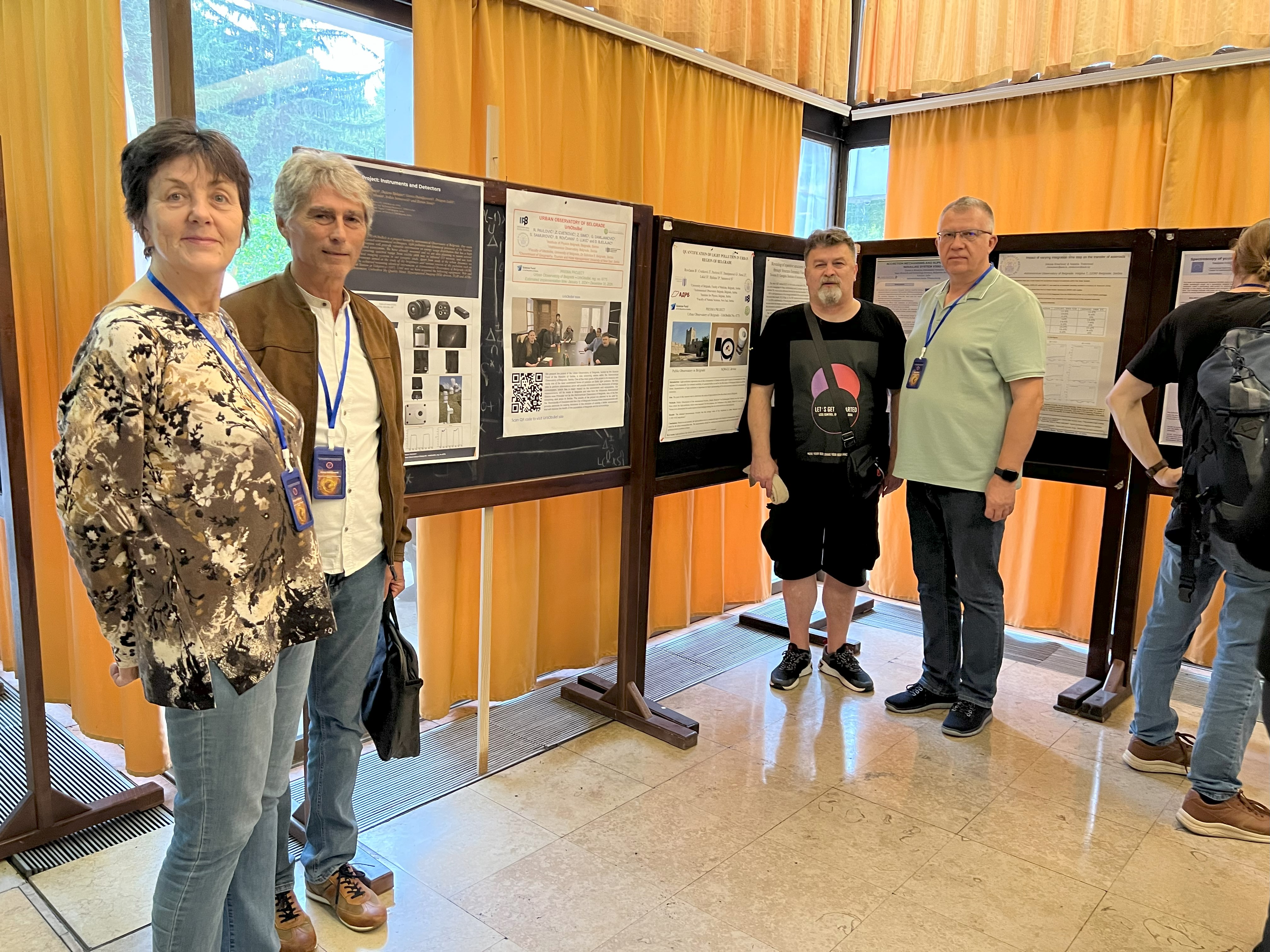
Dr. Zorica Cvetković, Dr. Goran Damljanović, Dr. Zoran Simić and Dr. Rade Pavlović
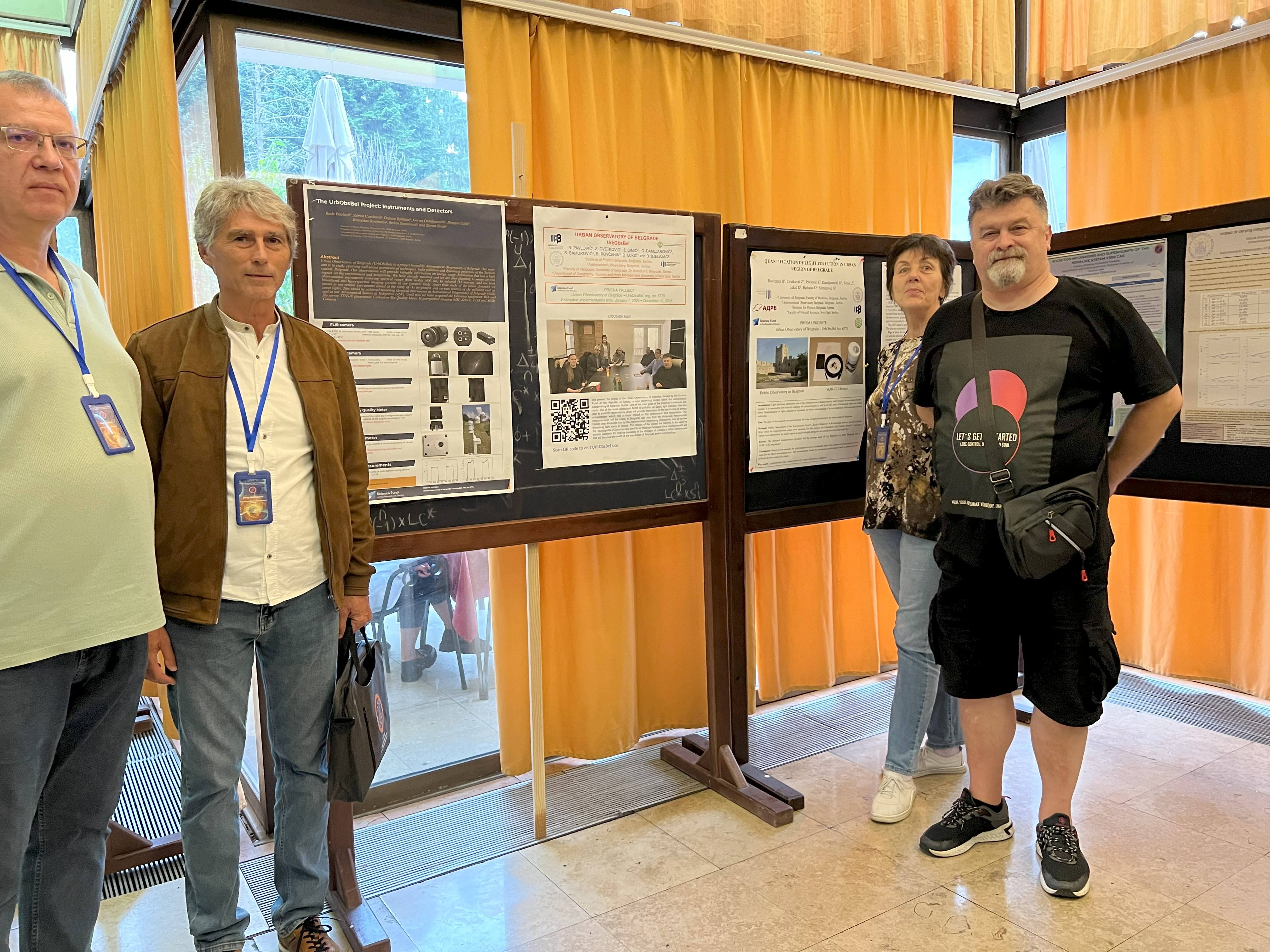
Dr. Rade Pavlović, Dr. Goran Damljanović, Dr. Zorica Cvetković and Dr. Zoran Simić
The 9th Astronomical Camp "Jastrebac 2024"
The 9th Astronomical Camp "Jastrebac 2024", lasted from August 23 to 25, has successfully concluded. This year's event on Jastrebac was notable for offering participants a unique opportunity to acquire extensive knowledge in astronomy and related sciences. Both seasoned attendees and newcomers had the chance to immerse themselves in the wonders of the universe.
A special highlight of the camp was the participation of the NGO "Carpe Noctem" and Dr. Dajana Bjelajac, who represented the UrbObsBel team. Her extensive lectures, on August 23, significantly raised awareness about the critical issue of light pollution, a topic that resonated deeply with many participants. Jovan Aleksić delivered a series of lectures on stellar particles, the Big Bang, and Dark Matter, providing invaluable insights into these complex subjects.
Additionally, the camp provided an opportunity for participants to learn from Marko Grozdanović, an astrophysicist at the Astronomical Observatory in Belgrade, who discussed binary and multiple star systems. Remote observations of celestial bodies through some of the largest telescopes in Serbia were another major attraction.
The event was further enriched by the visit of a special adviser from the Ministry of Science, Technological Development, and Innovation, Zoran Tomić, who delivered a lecture on the state of astronomy in Serbia, including future ideas and plans.
The "Jastrebac 2024" project was funded by the City of Kruševac within the framework of the Local Action Plan for Youth, with support from the Tourism Organization of Kruševac and the Center for Professional Development Kruševac.
"Urban Observatory of Belgrade" project funded by Science Fund of the Republic of Serbia.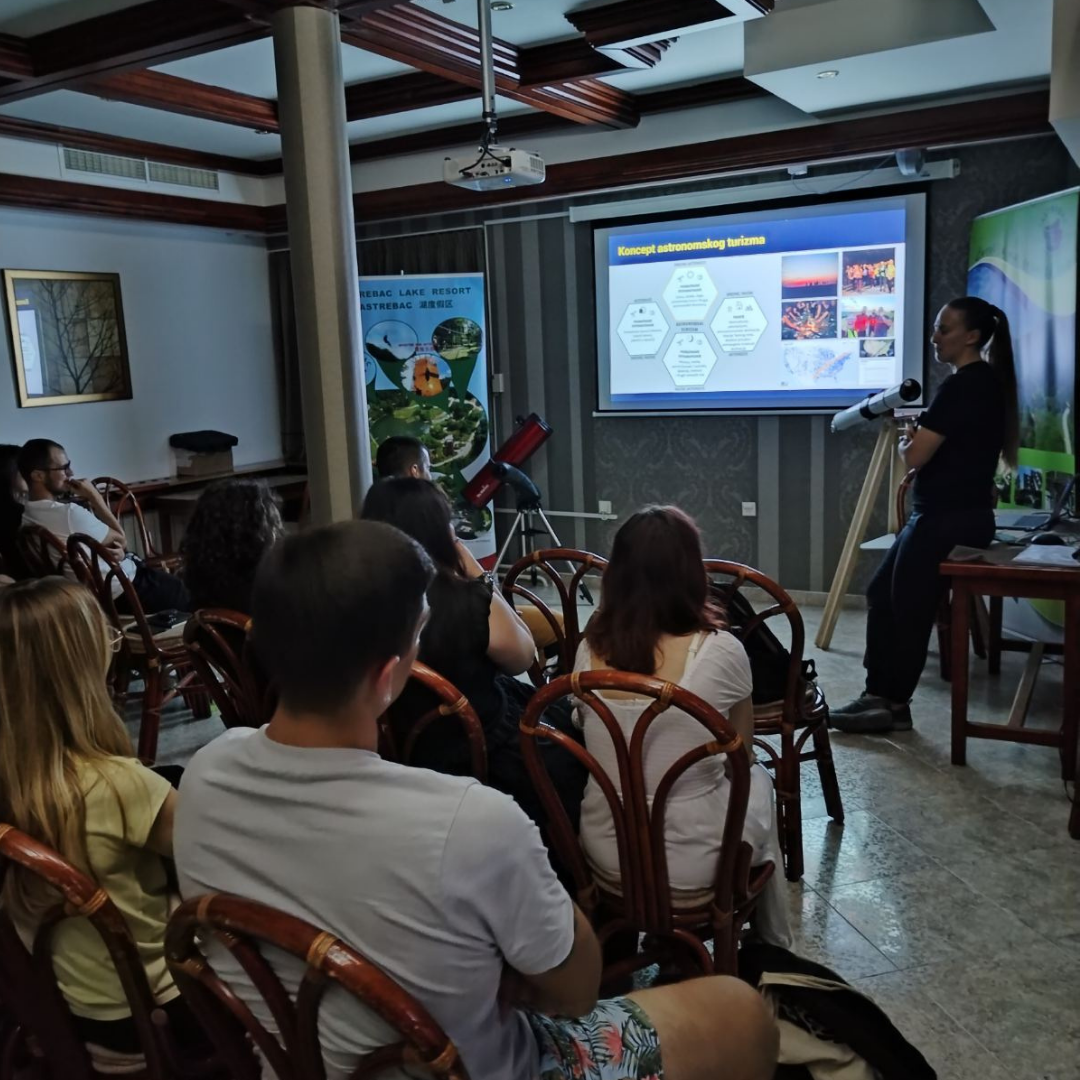
Dr. Dajana Bjelajac
Workshop dedicated to light pollution
A workshop dedicated to light pollution, astronomical tourism, and the preservation of natural darkness in the area surrounding the Vidojevica Astronomical Station was held at the Prokuplje Cultural Center on July 26, 2024. The event aimed to provide participants with detailed information on these important topics, as well as opportunities for involvement in the establishment of a dark sky park. Zoran Tomić, a special advisor to the minister of science, technological development and innovation of the Republic of Serbia, dr Jelena Begović, also addressed the attendees.
During the workshop, participants were introduced to the concept of light pollution and its negative impact on human health, nature, and quality of life. Simple methods for assessing the level of light pollution in one's immediate surroundings were presented, along with practical steps individuals can take to reduce this issue. A significant portion of the workshop focused on the importance of preserving naturally dark areas and the ways to protect them, which is crucial for improving the environment.
Additionally, participants gained insight into the work of the Belgrade Astronomical Observatory and the significance of the Vidojevica Astronomical Station, with an emphasis on the development of astronomical tourism. It was highlighted that astronomical tourism can be a significant factor in enhancing the quality of life in rural and sparsely populated areas and can have a positive impact on the local economy.
The final segment of the workshop covered the importance of effective science promotion and communication. Participants learned how science promotion can yield significant results and raise awareness of scientific topics among a broader audience.
The workshop was led by Assistant Professor Dr. Dajana Bjelajac from the Faculty of Sciences in Novi Sad, Research Associate Dr. Milan Stojanović from the Belgrade Astronomical Observatory, and Aleksa Vasić, an advisor from the Center for the Promotion of Science. Dr. Dajana Bjelajac also spoke on behalf of the URBOBSBEL team.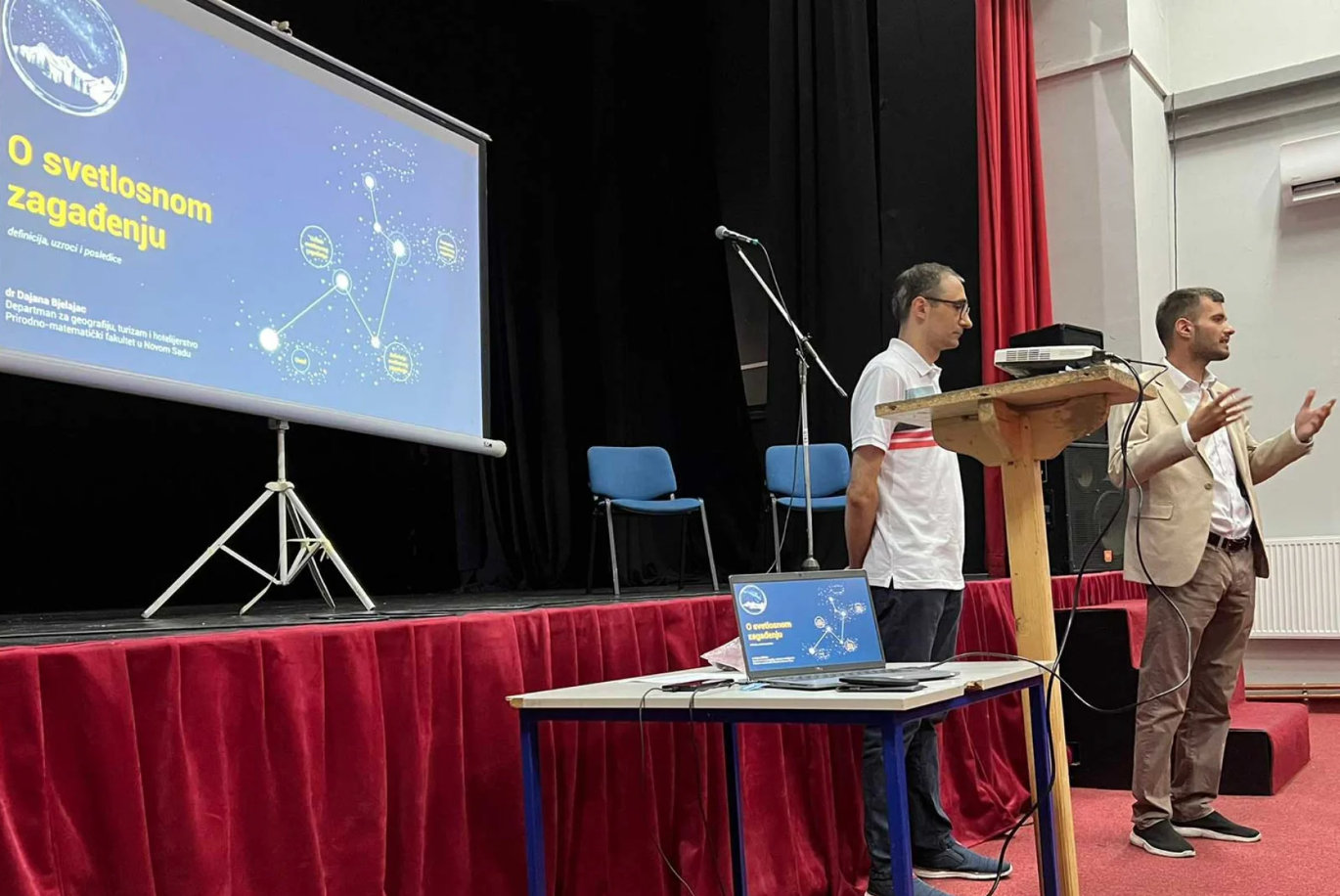
Dr. Milan Stojanović and Aleksa Vasić
Observing Perseids at Vidojevica
On Sunday, August 11, 2024, from 8 PM until midnight, an event titled "Observing the Perseids at Vidojevica" took place at the Beli Kamen location.
During this event, citizens had the opportunity to observe one of the most famous and beautiful meteor showers.
This natural phenomenon is renowned for its brilliant and spectacular display in the night sky, and attendees were able to experience it firsthand. In addition to enjoying the view of the Perseids, visitors observed the night sky through telescopes, guided by experienced astronomers who shared interesting facts about stars, planets, and distant galaxies. Geographers were also present, explaining how light pollution affects the deterioration of night sky observation conditions and discussing ways to preserve and improve these conditions. The event was organized as part of the initiative to establish the "Vidojevica Dark Sky Park."
The observation of this meteor shower was organized by the non-governmental organization "Carpe Noctem," the Belgrade Astronomical Observatory, and the Astronomical Society "Alpha" from Niš, with support from the Ministry of Science, Technological Development, and Innovation, the City of Prokuplje, and the Center for the Promotion of Science.
Dr. Dajana Bjelajac attended the event on behalf of the URBOBSBEL team.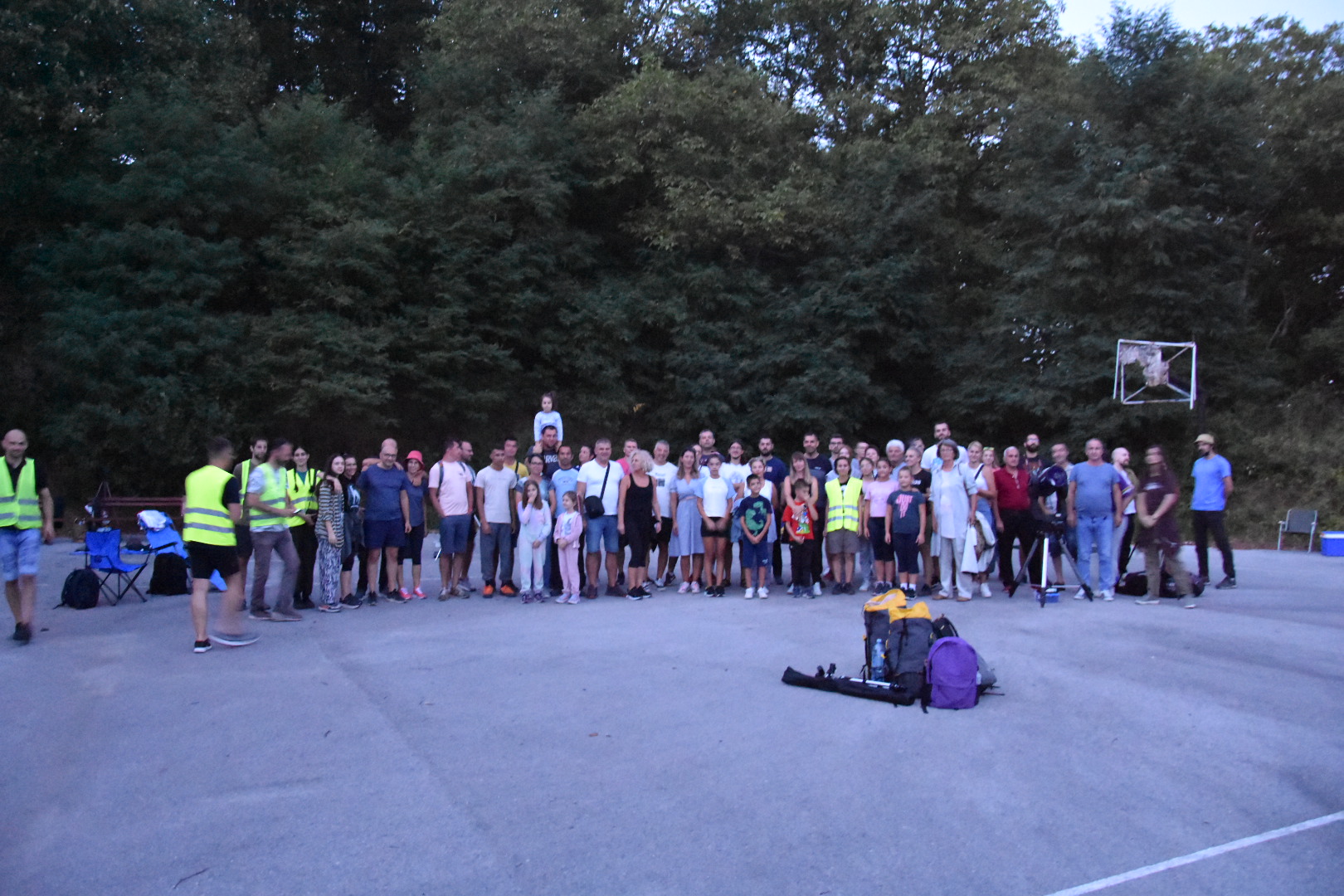
Astronomical Observatory at the International Technical Fair
The Astronomical Observatory of Belgrade presented itself at this year's 66th International Fair of Technics and Technical Achievements with three projects. The MOSAIC CubeSat project was presented: this project of the first Serbian scientific satellite is now in the concept phase. The goals of the MOSAIC mission are to observe the Sun in X-ray radiation and to observe the planet Earth from orbit. A life-size model of the satellite was presented at the Fair, as well as one of the devices that will be taken into orbit. On this project, the Astronomical Observatory cooperates with the Mihajlo Pupin Institute and with three faculties of the University of Belgrade: Faculty of Mathematics, Faculty of Mechanical Engineering and School of Electrical Engineering. Also, the Astronomical Observatory presented two PRISMA projects led by the Observatory and funded by the Science Fund of the Republic of Serbia and which started working at the beginning of this year: the Urban Observatory of Belgrade -- UrbObsBel (researchers from the Institute of Physics, the Faculty of Science, University of Novi Sad, as well as the Faculty of Medicine, University of Belgrade also participate) and the MOBY (Modeling Binary Systems That End in Stellar Mergers and Give Rise to Gravitational Waves) project with the researcher from the Faculty of Mathematics. On the panel of the Urban Observatory, in addition to the description of the planned activities, the case of the HSI (Hyperspectral Imaging Sensor) device, which is currently being constructed and will be used for measurements within this project, was shown. Colleagues from the Faculty of Mathematics presented themselves at the astronomy stand, showing the Vera Rubin telescope, i.e., the LSST (Legacy Survey in Space and Time) project and the contribution of Serbian scientists to this project.
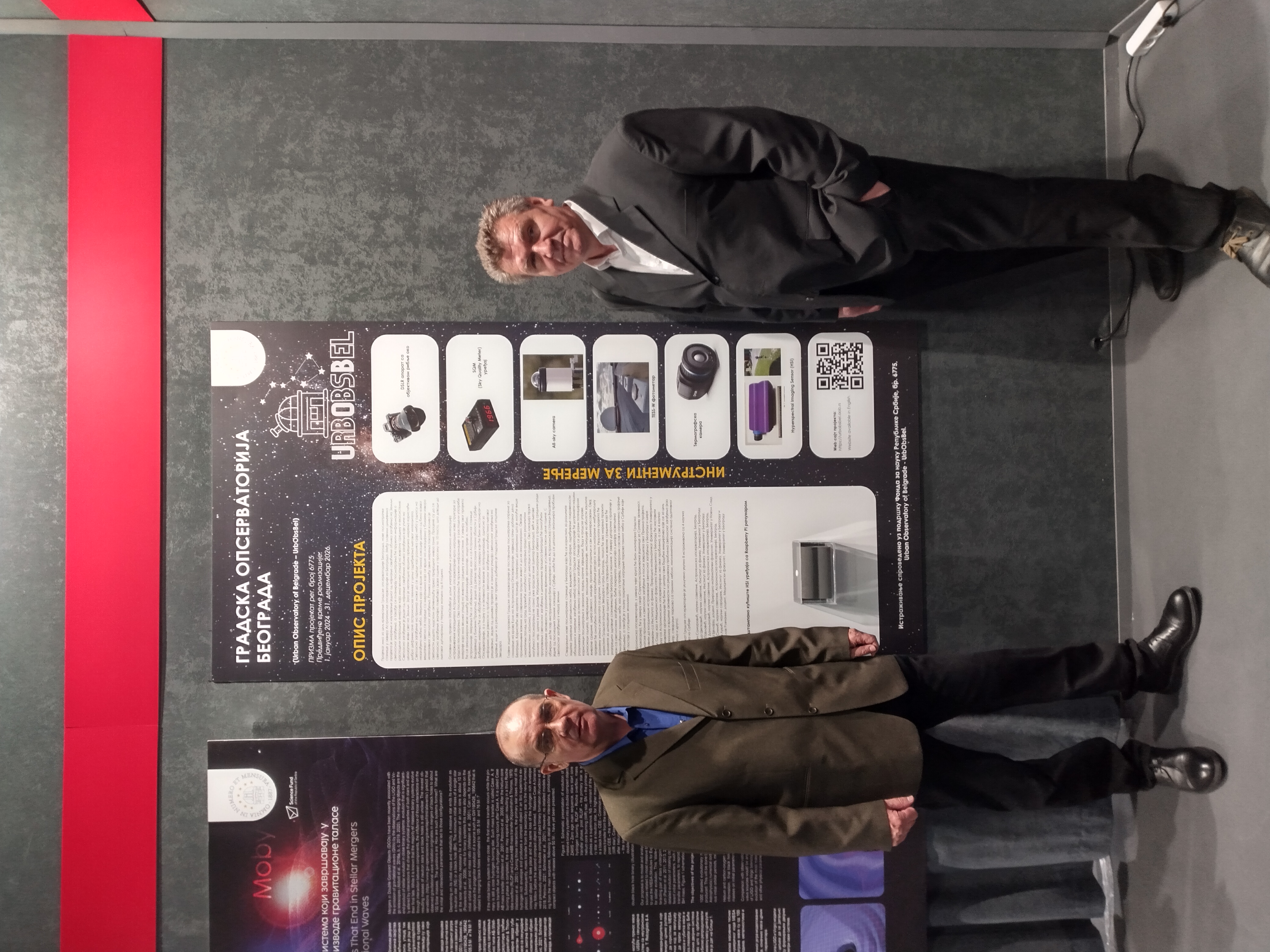
Dr. Srdjan Samurović and Dr. Luka Popović, director of the Astronomical Observatory
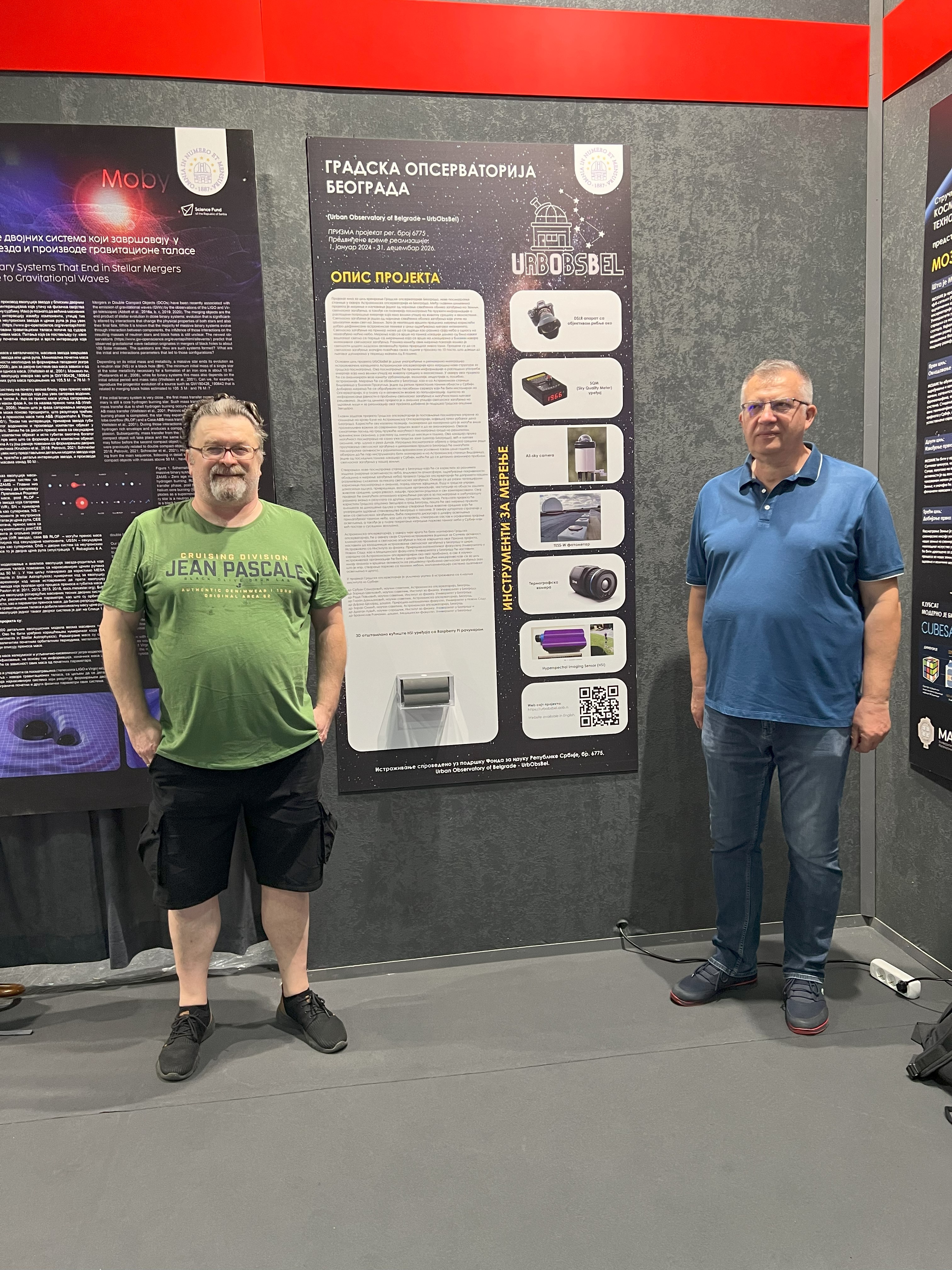
Dr. Zoran Simić and Dr. Rade Pavlović
Visits to the Astronomical Observatory during the International Technical Fair
During this year's 66th International Fair of Technics and Technical Achievements, the Astronomical Observatory hosted visitors from the People's Republic of China. First, on Wednesday, May 22, 2024, the Astronomical Observatory was visited by Mr. Bob Chen, a representative of MinoSpace, one of the most reputable Chinese companies engaged in research and production of satellites. Mr. Chen presented the work of the MinoSpace company in detail to Dr. Goran Damljanović and Dr. Srdjan Samurović. After a discussion about the work and possibilities of this company, Dr. Samurović presented the planned activities of the Urban Observatory of Belgrade project, UrbObsBel, funded by the Science Fund of the Republic of Serbia. After discussing the project, Mr. Chen visited the Great Refractor pavilion where he learned about this instrument and its importance for Serbian astronomy.
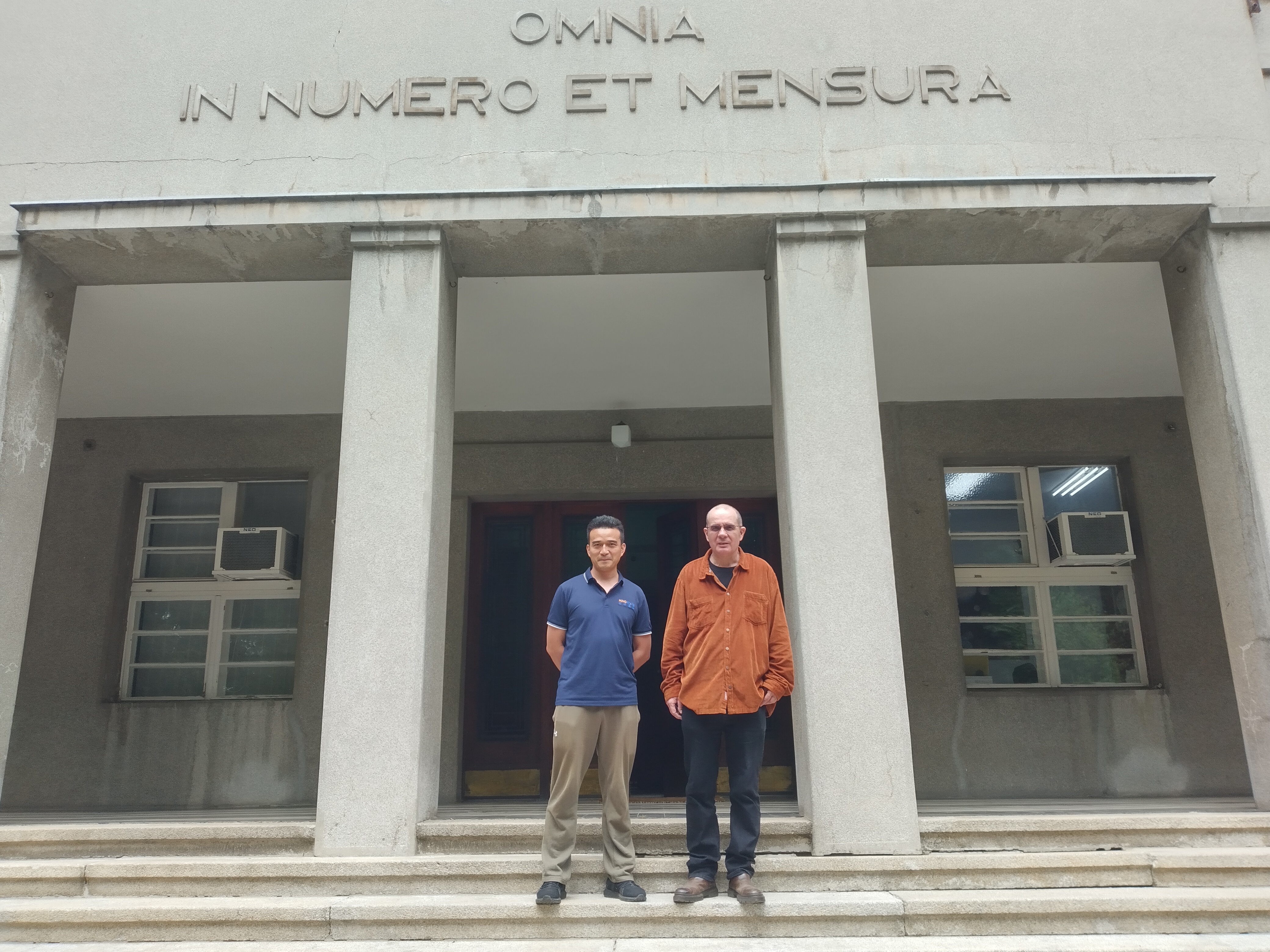
Mr. Bob Chen and Dr. Srdjan Samurović
The following day (Thursday, May 23), the Astronomical Observatory was visited by a delegation from the Beijing Academy of Science and Technology (BJAST), led by the president of this institution, Dr. Jianmin Wu. Also, in this delegation were Dr. Junkai Li, Dr. Baoming Li, Ms. Lin Li, Dr. Jing Zhu and Ms. Rong Ren. At the meeting organized on that occasion, the Astronomical Observatory was represented by Dr. Jelena Kovačević Dojčinović, deputy director of Dr. Luka Popović, who was on an official trip, Dr. Milan Stojanović, head of the Research Unit for Space Science and Technologies, and Dr. Srdjan Samurović, president of the Scientific council of the Astronomical Observatory and head of the Research Unit for Solar Activity Monitoring, Climate Change and Light Pollution. Also present were Dr. Jelena Svorcan from the Faculty of Mechanical Engineering, prof. Dr. Dušan Marcheta from the Faculty of Mathematics and Mr. Dobrivoje Lale Erić from the Center for the Promotion of Science. Dr. Stojanović presented to the distinguished guests from China the history of the Astronomical Observatory and its scientific activities. After his presentation, Dr. Samurović briefly presented the problem of light pollution and the PRISMA project of the Urban Observatory of Belgrade (UrbObsBel) of which he is the coordinator and whose implementation began in January of this year. Colleagues from China were very interested and various aspects of possible future cooperation were discussed. After the meeting, the guests visited the Great Refractor pavilion, where Dr. Stojanović described the features of this telescope and answered their questions.
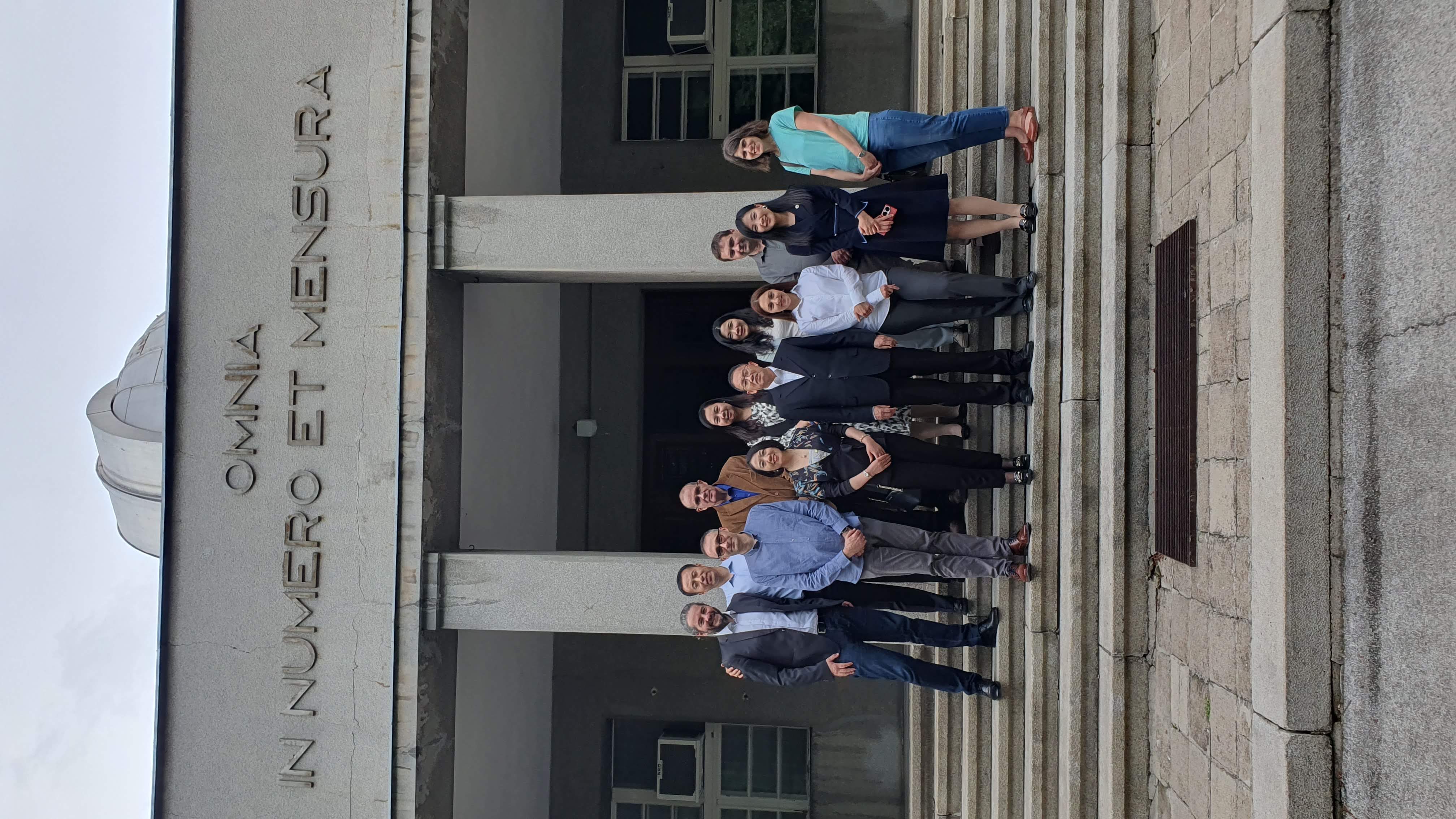
The delegation from the Beijing Academy of Science and Technology (BJAST) visits the Astronomical Observatory
